-
Content Count
564 -
Joined
-
Last visited
Posts posted by Admin
-
-
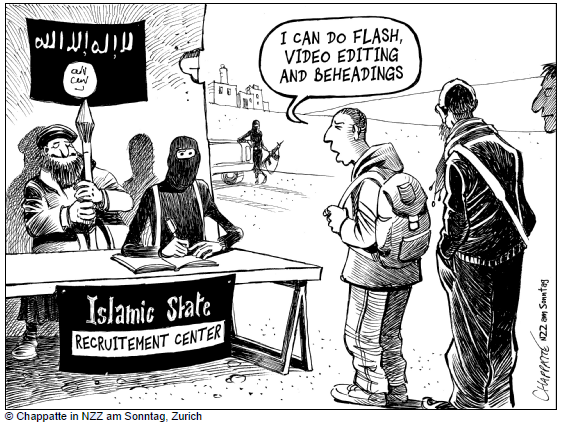 ON May 3rd two Muslim men with rifles attacked a security guard at a venue in Texas showing cartoons of the Prophet Muhammad. Both were shot dead before they killed anyone—they were incompetent terrorists, fortunately. The Islamic State claimed responsibility for the attack. There is no evidence that it had any direct involvement, but the gunmen may have been inspired by the global jihadist movement. One of them, Elton Simpson, was questioned by the FBI in 2010 and later convicted of lying to them. He denied that he had made plans to go to Somalia and become a jihadist, when in fact he had.For Richard Stanek, sheriff of Hennepin County, Minnesota (which covers most of Minneapolis), the story is all too familiar. For eight years he has been searching for the “magic trick” to stop young men from joining Islamic extremists, especially in Somalia. He has been called as an expert witness before Congress and shared his insights with officials from 38 countries.Since the 1990s more than 100,000 Somalis have come to America as refugees. Many settled in the Minneapolis-St Paul area, which today is home to around 75,000 immigrants from Somalia and their children. The Cedar-Riverside neighbourhood in the Twin Cities is sometimes called “Little Mogadishu”. After they arrived, Somalis clustered and kept to themselves; many intended to return home as soon as the civil war was over. Somali women made little effort to learn English.Since Mr Stanek became sheriff in 2007, several dozen young Somali-American men from Minnesota have disappeared to join the Shabab, a group of Islamist fighters in Somalia linked to al-Qaeda. But “It really hit home in 2009, when Shirwa Ahmed blew himself up outside of Mogadishu,” the sheriff says. Ahmed was the first known American suicide-bomber—and a graduate of a Minneapolis high school.Over the past two years the danger has increased, as young Somali men, and some young women, attempt to join Islamic State (IS) rather than the Shabab. Yet Mr Stanek feels more confident. His relationship with the Somali community has much improved. He has made friends with a local imam, hired Haissan Hussein to be the first Somali deputy sheriff in Minnesota, and created a six-member team to build “communities of trust” with Hennepin County’s many cultures. The team includes Abdi Mohamed, a Somali who immigrated in the 1990s, whose full-time job is to liaise with Somalis. And Minneapolis has become one of three pilot cities for Countering Violent Extremism (CVE), an initiative by the Obama administration under which police try to connect with Muslim groups through local events, mentoring and youth programmes.These closer contacts, says Mr Stanek, are the reason why federal authorities know much more about the six young Somalis from Minnesota who were arrested trying to obtain false passports and were charged on April 19th with trying to leave America to join IS. That success, he says, is proof that many of the parents of youngsters who are at risk realise that their interests are aligned with those of the police. Even so, according to Andy Luger, the top federal prosecutor in Minnesota, recruitment for terror and jihadremains a particular problem in the state.On a sunny morning this week, Mr Mohamed, Mr Stanek’s liaison officer, walked into a Starbucks café in Seward, another neighbourhood where many Somalis live, and was warmly greeted by an all-male Somali clientele sipping coffee. He sat down with Yusuf, who came to Minneapolis in 2003 and works in a chemistry lab as well as mentoring children after school. “One problem is the generational gap between parents and children,” says Yusuf. The culture and identity of home and the outside world don’t fit together. Another problem is absent fathers, either not around at all or working so hard to make ends meet that they are hardly ever home.Somalis are one of the most troubled groups of immigrants. Many young Somali men are in prison; many Somalis of both sexes drop out of high school. Unemployment hovers around 21%, the highest of Minnesota’s five largest immigrant groups. More than half of Minnesota’s Somalis are poor. Many are isolated from other immigrants and even from other Muslims, who find them prickly, proud and standoffish.No clear pattern of IS recruiting in Minnesota can be discerned. The six who were recently arrested were largely self-radicalised through the internet or lured by “peer-to-peer” recruiting: a process by which friends persuade friends to join a terrorist group, compare notes on how to raise money for a flight, and make connections with middlemen in Turkey. One of the young men, Guled Ali Omar, was the brother of a would-be jihadist who left for Somalia in 2007 and remains a fugitive.No mastermind recruiter seems to have been at work, though Abdi Nur, a young Somali from Minneapolis who joined IS last year and is now in Syria, seems to be wooing midwestern jihadists. IS’s military success—it claims to have restored the old Caliphate—is probably its most potent recruiting tool. Ayaan Hirsi Ali, a Somali-born writer who was once a zealot but now campaigns for a liberal Islamic reformation, says she would probably have joined IS, had it been around when she was young and impressionable.Somalis feel targeted both by the extremists, who lure away their children, and by non-Muslim Americans, who suspect them of terrorism, says Jaylani Hussein of the Council on American-Islamic Relations in Minnesota. They are especially fearful of CVE, which they think will amount to a giant spying operation camouflaged as social services. Mr Stanek agrees that “countering violent extremism” sounds confrontational—but he would happily take the promised federal funds and expand his community-engagement team from six members to twelveSource: http://www.economist.com/
ON May 3rd two Muslim men with rifles attacked a security guard at a venue in Texas showing cartoons of the Prophet Muhammad. Both were shot dead before they killed anyone—they were incompetent terrorists, fortunately. The Islamic State claimed responsibility for the attack. There is no evidence that it had any direct involvement, but the gunmen may have been inspired by the global jihadist movement. One of them, Elton Simpson, was questioned by the FBI in 2010 and later convicted of lying to them. He denied that he had made plans to go to Somalia and become a jihadist, when in fact he had.For Richard Stanek, sheriff of Hennepin County, Minnesota (which covers most of Minneapolis), the story is all too familiar. For eight years he has been searching for the “magic trick” to stop young men from joining Islamic extremists, especially in Somalia. He has been called as an expert witness before Congress and shared his insights with officials from 38 countries.Since the 1990s more than 100,000 Somalis have come to America as refugees. Many settled in the Minneapolis-St Paul area, which today is home to around 75,000 immigrants from Somalia and their children. The Cedar-Riverside neighbourhood in the Twin Cities is sometimes called “Little Mogadishu”. After they arrived, Somalis clustered and kept to themselves; many intended to return home as soon as the civil war was over. Somali women made little effort to learn English.Since Mr Stanek became sheriff in 2007, several dozen young Somali-American men from Minnesota have disappeared to join the Shabab, a group of Islamist fighters in Somalia linked to al-Qaeda. But “It really hit home in 2009, when Shirwa Ahmed blew himself up outside of Mogadishu,” the sheriff says. Ahmed was the first known American suicide-bomber—and a graduate of a Minneapolis high school.Over the past two years the danger has increased, as young Somali men, and some young women, attempt to join Islamic State (IS) rather than the Shabab. Yet Mr Stanek feels more confident. His relationship with the Somali community has much improved. He has made friends with a local imam, hired Haissan Hussein to be the first Somali deputy sheriff in Minnesota, and created a six-member team to build “communities of trust” with Hennepin County’s many cultures. The team includes Abdi Mohamed, a Somali who immigrated in the 1990s, whose full-time job is to liaise with Somalis. And Minneapolis has become one of three pilot cities for Countering Violent Extremism (CVE), an initiative by the Obama administration under which police try to connect with Muslim groups through local events, mentoring and youth programmes.These closer contacts, says Mr Stanek, are the reason why federal authorities know much more about the six young Somalis from Minnesota who were arrested trying to obtain false passports and were charged on April 19th with trying to leave America to join IS. That success, he says, is proof that many of the parents of youngsters who are at risk realise that their interests are aligned with those of the police. Even so, according to Andy Luger, the top federal prosecutor in Minnesota, recruitment for terror and jihadremains a particular problem in the state.On a sunny morning this week, Mr Mohamed, Mr Stanek’s liaison officer, walked into a Starbucks café in Seward, another neighbourhood where many Somalis live, and was warmly greeted by an all-male Somali clientele sipping coffee. He sat down with Yusuf, who came to Minneapolis in 2003 and works in a chemistry lab as well as mentoring children after school. “One problem is the generational gap between parents and children,” says Yusuf. The culture and identity of home and the outside world don’t fit together. Another problem is absent fathers, either not around at all or working so hard to make ends meet that they are hardly ever home.Somalis are one of the most troubled groups of immigrants. Many young Somali men are in prison; many Somalis of both sexes drop out of high school. Unemployment hovers around 21%, the highest of Minnesota’s five largest immigrant groups. More than half of Minnesota’s Somalis are poor. Many are isolated from other immigrants and even from other Muslims, who find them prickly, proud and standoffish.No clear pattern of IS recruiting in Minnesota can be discerned. The six who were recently arrested were largely self-radicalised through the internet or lured by “peer-to-peer” recruiting: a process by which friends persuade friends to join a terrorist group, compare notes on how to raise money for a flight, and make connections with middlemen in Turkey. One of the young men, Guled Ali Omar, was the brother of a would-be jihadist who left for Somalia in 2007 and remains a fugitive.No mastermind recruiter seems to have been at work, though Abdi Nur, a young Somali from Minneapolis who joined IS last year and is now in Syria, seems to be wooing midwestern jihadists. IS’s military success—it claims to have restored the old Caliphate—is probably its most potent recruiting tool. Ayaan Hirsi Ali, a Somali-born writer who was once a zealot but now campaigns for a liberal Islamic reformation, says she would probably have joined IS, had it been around when she was young and impressionable.Somalis feel targeted both by the extremists, who lure away their children, and by non-Muslim Americans, who suspect them of terrorism, says Jaylani Hussein of the Council on American-Islamic Relations in Minnesota. They are especially fearful of CVE, which they think will amount to a giant spying operation camouflaged as social services. Mr Stanek agrees that “countering violent extremism” sounds confrontational—but he would happily take the promised federal funds and expand his community-engagement team from six members to twelveSource: http://www.economist.com/ -
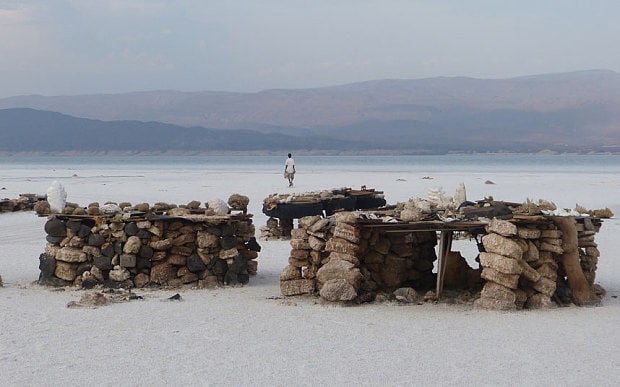 Lac Assal – the lowest point in Africa Photo: AP/FOTOLIADjibouti is out of this world. It’s a claim no travel writer should ever make, but it really is as if a great chunk of Mars has been carved out and jigsawed on to the Horn of Africa. Seated on the Afar Triple Junction – the meeting point for three of the Earth’s tectonic plates, which are pulling slowly away from one another – Djibouti is a jostle of black volcanic rock, flat plains haunted by dust devils and a brilliant-blue coastline bulging out into the Gulf of Aden. These are the raw lands that 20-year-old Wilfred Thesiger travelled through in the 1930s and later featured in his Danakil Diaries travelogue.Until recently, travellers have been slow to follow in his footsteps. Images of the civil war that broke out in the region during the 1990s linger – as do concerns about pirates in the Gulf. But these impressions are outdated. Aside from the occasional pickpocket, Djibouti is safe and unassociated with the problems that persist in neighbouring Somalia and Eritrea, its coastal towns insulated from marauders by the Gulf of Tadjoura.It offers intrepid travellers a new frontier. Outside the colonial-style capital, Djibouti city, development is in its infancy: accommodation and services are relatively frill-free, there’s no public transport and it’s expensive. But the real draw is the wealth of adventure activities on offer, from trekking up the dormant Ardoukoba volcano and snorkelling with whale sharks in the Bay of Ghoubbet, to floating in the briny waters of Lac Assal – the lowest point in Africa.One of its most impressive landmarks is Lac Abbé – a salt lake on the border with Ethiopia. It’s the terminus of the 750-mile-long Awash River, which starts life west of Addis Ababa. Droughts and extraction for irrigation upstream have caused the water level to drop 20ft, leaving behind copper-coloured flats studded with jagged limestone chimneys that bite the skyline. It’s so otherworldly they were used as a filming location for the first Planet of the Apes.As we drive towards the plains, heat warps the air and the chimneys appear on the horizon like a long caravan of humped camels marching through the desert. In the distance, Afar women draped in cloths of purple, orange, red or blue flash bright as birds against the sandy sky.
Lac Assal – the lowest point in Africa Photo: AP/FOTOLIADjibouti is out of this world. It’s a claim no travel writer should ever make, but it really is as if a great chunk of Mars has been carved out and jigsawed on to the Horn of Africa. Seated on the Afar Triple Junction – the meeting point for three of the Earth’s tectonic plates, which are pulling slowly away from one another – Djibouti is a jostle of black volcanic rock, flat plains haunted by dust devils and a brilliant-blue coastline bulging out into the Gulf of Aden. These are the raw lands that 20-year-old Wilfred Thesiger travelled through in the 1930s and later featured in his Danakil Diaries travelogue.Until recently, travellers have been slow to follow in his footsteps. Images of the civil war that broke out in the region during the 1990s linger – as do concerns about pirates in the Gulf. But these impressions are outdated. Aside from the occasional pickpocket, Djibouti is safe and unassociated with the problems that persist in neighbouring Somalia and Eritrea, its coastal towns insulated from marauders by the Gulf of Tadjoura.It offers intrepid travellers a new frontier. Outside the colonial-style capital, Djibouti city, development is in its infancy: accommodation and services are relatively frill-free, there’s no public transport and it’s expensive. But the real draw is the wealth of adventure activities on offer, from trekking up the dormant Ardoukoba volcano and snorkelling with whale sharks in the Bay of Ghoubbet, to floating in the briny waters of Lac Assal – the lowest point in Africa.One of its most impressive landmarks is Lac Abbé – a salt lake on the border with Ethiopia. It’s the terminus of the 750-mile-long Awash River, which starts life west of Addis Ababa. Droughts and extraction for irrigation upstream have caused the water level to drop 20ft, leaving behind copper-coloured flats studded with jagged limestone chimneys that bite the skyline. It’s so otherworldly they were used as a filming location for the first Planet of the Apes.As we drive towards the plains, heat warps the air and the chimneys appear on the horizon like a long caravan of humped camels marching through the desert. In the distance, Afar women draped in cloths of purple, orange, red or blue flash bright as birds against the sandy sky.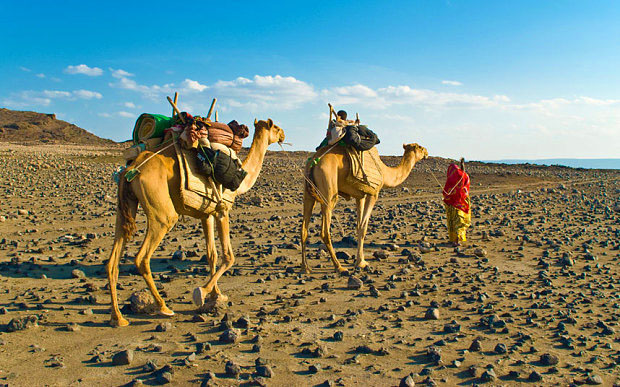 An Afar woman crosses the desert (Photo: AP/Fotolia)I lean out the window of the 4x4 as we navigate the scabs of sparkling salt that encrust the dirt and pop like bubble wrap beneath the tyres. A boy, leading his two camels, walks past us; arms dangling over the herding stick slung across his shoulders. We wave, and he nods his head in reply. Off to the left, a jackal nips at the ground. He’s cornered a rodent of some kind and darts back and forth, unsure of us but unwilling to abandon his hard-won lunch. We stop the car. He races back and plunges his snout into the earth, emerging with a furry gerbil between his teeth and darts behind a rock to eat in peace as we crackle onwards. Further on we see a pair of pug-nosed warthogs with tusks white and curved like smiles, but they quickly trot away into the haze.Hussein, our quiet Afar guide who sits in the passenger seat, holds up his hand and signals for our driver to stop. He speaks French – the national language alongside Arabic – and I translate for the others. “Follow my footsteps; be careful where you walk: there’s areas of quicksand.“ So we pace after him, eyeing up the contorted formations. One is over 200ft high and is nicknamed – rather unimaginatively – La Grande Cheminee (The Big Chimney). It’s utterly silent save for the warm, whispering wind.
An Afar woman crosses the desert (Photo: AP/Fotolia)I lean out the window of the 4x4 as we navigate the scabs of sparkling salt that encrust the dirt and pop like bubble wrap beneath the tyres. A boy, leading his two camels, walks past us; arms dangling over the herding stick slung across his shoulders. We wave, and he nods his head in reply. Off to the left, a jackal nips at the ground. He’s cornered a rodent of some kind and darts back and forth, unsure of us but unwilling to abandon his hard-won lunch. We stop the car. He races back and plunges his snout into the earth, emerging with a furry gerbil between his teeth and darts behind a rock to eat in peace as we crackle onwards. Further on we see a pair of pug-nosed warthogs with tusks white and curved like smiles, but they quickly trot away into the haze.Hussein, our quiet Afar guide who sits in the passenger seat, holds up his hand and signals for our driver to stop. He speaks French – the national language alongside Arabic – and I translate for the others. “Follow my footsteps; be careful where you walk: there’s areas of quicksand.“ So we pace after him, eyeing up the contorted formations. One is over 200ft high and is nicknamed – rather unimaginatively – La Grande Cheminee (The Big Chimney). It’s utterly silent save for the warm, whispering wind.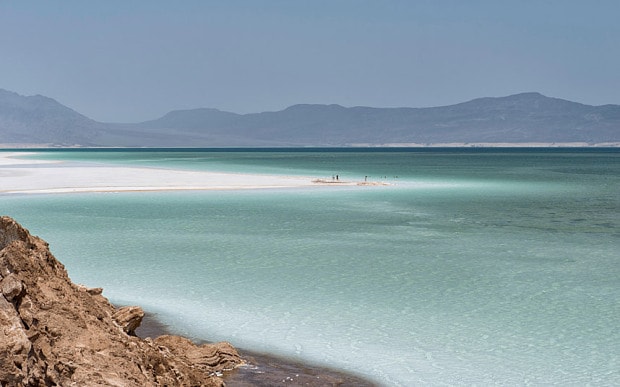 The country offers intrepid travellers a new frontier (Photo: Alamy)At the base of another, Hussein points to a fumerole – a pool of boiling water that bubbles and steams invitingly like a Jacuzzi. “See. This place really is heaven and hell,” he smiles. “It comes from so deep that it reaches halfway up the vents,” he says, pointing to nooks further up where I notice pigeons roosting. “They have to be careful not to cook themselves” Hussein says, grinning and rubbing his tummy hungrily.Leading away from the pool is a thin, shallow channel carved through the salt and dirt. “What’s this for?” I ask. “Afar adults build them to steer the hot water – which cools enroute – to small fields where they grow grass for their animals,” he explains. “Then the children bring the goats and sheep here.”
The country offers intrepid travellers a new frontier (Photo: Alamy)At the base of another, Hussein points to a fumerole – a pool of boiling water that bubbles and steams invitingly like a Jacuzzi. “See. This place really is heaven and hell,” he smiles. “It comes from so deep that it reaches halfway up the vents,” he says, pointing to nooks further up where I notice pigeons roosting. “They have to be careful not to cook themselves” Hussein says, grinning and rubbing his tummy hungrily.Leading away from the pool is a thin, shallow channel carved through the salt and dirt. “What’s this for?” I ask. “Afar adults build them to steer the hot water – which cools enroute – to small fields where they grow grass for their animals,” he explains. “Then the children bring the goats and sheep here.”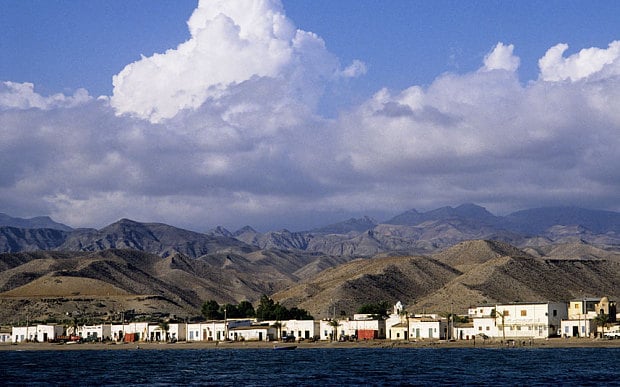 Tadjoura (Photo: Alamy)The Muslim Afar – or Danakil – make up a third of Djibouti’s population of under a million, and have a fierce reputation. One of their most beloved proverbs reads: “It’s better to die than live without killing.” Today, their attitudes are softening, but smiles are not easily won.We return to the car and drive up to a small escarpment where a basic campsite sits overlooking the chimneys and fumeroles. Accommodation is in the form of ari – traditional Afar huts built from a matrix of branches bent into a dome with a woven mat slung over the top to act as a roof. Beneath this is an Army-style camp bed.We wander into the cool, dark interior of the main tent. Its dark-green canvas walls flap in the wind. The only decoration is a dried leopard pelt – head and ears intact – splayed across a side table; its regality all the more poignant amid the barrenness.Inside are four travellers – two men, two women – sitting around a simple table on folding chairs; their legs splayed out in rest. The camp cook offers us small, scratched glasses of piping-hot coffee, which we pincer carefully between fingers and thumb. I sip at the brown water and let out a long, quiet whistle; it’s so sweet my fillings rattle.“What brings you to Djibouti?” I ask the group of newly assembled friends who had met in Ethiopia. “Adventure!” they cheer in unison. “I can’t wait to sleep in my hut tonight,” beams an Irishman called Enda, his sun-reddened cheeks blending into his russet beard.
Tadjoura (Photo: Alamy)The Muslim Afar – or Danakil – make up a third of Djibouti’s population of under a million, and have a fierce reputation. One of their most beloved proverbs reads: “It’s better to die than live without killing.” Today, their attitudes are softening, but smiles are not easily won.We return to the car and drive up to a small escarpment where a basic campsite sits overlooking the chimneys and fumeroles. Accommodation is in the form of ari – traditional Afar huts built from a matrix of branches bent into a dome with a woven mat slung over the top to act as a roof. Beneath this is an Army-style camp bed.We wander into the cool, dark interior of the main tent. Its dark-green canvas walls flap in the wind. The only decoration is a dried leopard pelt – head and ears intact – splayed across a side table; its regality all the more poignant amid the barrenness.Inside are four travellers – two men, two women – sitting around a simple table on folding chairs; their legs splayed out in rest. The camp cook offers us small, scratched glasses of piping-hot coffee, which we pincer carefully between fingers and thumb. I sip at the brown water and let out a long, quiet whistle; it’s so sweet my fillings rattle.“What brings you to Djibouti?” I ask the group of newly assembled friends who had met in Ethiopia. “Adventure!” they cheer in unison. “I can’t wait to sleep in my hut tonight,” beams an Irishman called Enda, his sun-reddened cheeks blending into his russet beard.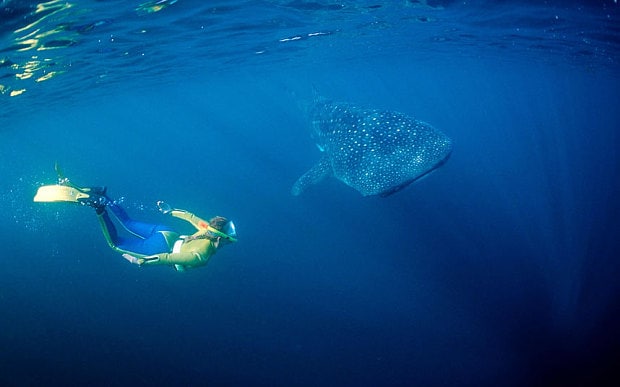 Snorkellers can spot whale sharks off the coast (Photo: Alamy)The sun is starting to set so we them bid farewell and drive back down to the plains. The low light casts silhouettes making the chimneys appear as dark mountains from a distance; serrated like the backbone of a dinosaur.As we wander towards one of the grassy patches, we notice two girls and a younger boy grazing their goats. They stare at us unflinchingly. I crouch down to run my fingers through the turf and, looking up, lock eyes with the eldest. She leans her head against the shepherding branch clasped in her hands. I can just make out the tribal markings on her face; two blackened stripes, as if a bird had lightly perched on either cheek. I nod and smile, but she doesn’t respond.The light is fading fast now. Hussein says it’s time to go and starts walking back to the 4x4. I hang back to take in the surroundings and realise the children are following me. I turn and greet them in French, but they stay silent; I take pictures on my smartphone and flip the camera so they can see themselves, but they peer at the screen wordlessly. And then I have it. Fastened to the fraying satchel slung around my body is a gold Omani badge pin featuring two crossed khanjars (daggers); a small token I picked up on my travels. I take it off and attach it to the dress of the eldest girl, near her shoulder. It glints in the sun and she runs her fingers over the small button. Before she can stop herself, her lips crack and curve into a smile revealing bright-white teeth. Quickly, she whips her hand up to her mouth to cover it and her eyes settle into a tough stare again. We’re nearly at the car. She grabs my hand and gives it a quick, firm squeeze and runs back towards the grass and goats.Djibouti can be disconcerting at first. It’s unlike any other African country: in place of the cool eucalyptus forests and green terraced valleys found in Ethiopia, are unique gnarly landscapes forged from rock, sand and salt. It’s wild and totally alien, but it offers something rather precious nowadays: the chance for raw adventure as yet untainted by multitudinous tour operators. Give it a few days and it will – as with the young girl – elicit the sincerest of smiles.
Snorkellers can spot whale sharks off the coast (Photo: Alamy)The sun is starting to set so we them bid farewell and drive back down to the plains. The low light casts silhouettes making the chimneys appear as dark mountains from a distance; serrated like the backbone of a dinosaur.As we wander towards one of the grassy patches, we notice two girls and a younger boy grazing their goats. They stare at us unflinchingly. I crouch down to run my fingers through the turf and, looking up, lock eyes with the eldest. She leans her head against the shepherding branch clasped in her hands. I can just make out the tribal markings on her face; two blackened stripes, as if a bird had lightly perched on either cheek. I nod and smile, but she doesn’t respond.The light is fading fast now. Hussein says it’s time to go and starts walking back to the 4x4. I hang back to take in the surroundings and realise the children are following me. I turn and greet them in French, but they stay silent; I take pictures on my smartphone and flip the camera so they can see themselves, but they peer at the screen wordlessly. And then I have it. Fastened to the fraying satchel slung around my body is a gold Omani badge pin featuring two crossed khanjars (daggers); a small token I picked up on my travels. I take it off and attach it to the dress of the eldest girl, near her shoulder. It glints in the sun and she runs her fingers over the small button. Before she can stop herself, her lips crack and curve into a smile revealing bright-white teeth. Quickly, she whips her hand up to her mouth to cover it and her eyes settle into a tough stare again. We’re nearly at the car. She grabs my hand and gives it a quick, firm squeeze and runs back towards the grass and goats.Djibouti can be disconcerting at first. It’s unlike any other African country: in place of the cool eucalyptus forests and green terraced valleys found in Ethiopia, are unique gnarly landscapes forged from rock, sand and salt. It’s wild and totally alien, but it offers something rather precious nowadays: the chance for raw adventure as yet untainted by multitudinous tour operators. Give it a few days and it will – as with the young girl – elicit the sincerest of smiles.Djibouti essentials
Emma Thomson travelled to Djibouti as part of a new 12-day Addis to Djibouti Adventure with Explore Worldwide (01252 883 795; explore.co.uk), which costs from £2,676 per person including flights and accommodation. British nationals require a visa to enter Djibouti. A one-month tourist visa can be acquired on arrival at the airport costing US$60 (£40), but if you’re travelling overland a visa should be applied for in advance. There is no Djiboutian embassy in London; it’s best to apply via a courier service such as Visa Swift (visaswift.com), which costs £130, including handling fee.Source: http://www.telegraph.co.uk
http://www.somaliaonline.com/it-may-sit-in-one-of-africas-most-troubled-regions-but-the-somali-speaking-country-of-djiboutis-is-africas-hottest-new-travel-destination/ -
MINNEAPOLIS—The path of reform for Abdullahi Yusuf, a U.S. teenager who tried to become a radical Islamic soldier, passes through writings of Martin Luther King Jr., readings of the U.S. Constitution and discussions about life and literature with a fellow Somali-American named Ahmed Amin.
Mr. Yusuf’s attempt to travel to the Middle East last year helped lead authorities to six Minnesota men who were charged last month in connection with a plan to join Islamic State abroad. The 19-year-old has become a test case for whether Americans lured by Islamic extremism can be deradicalized.
A Minnesota judge earlier this year sent Mr. Yusuf to a halfway house, where he adheres to a tailor-made curriculum aimed at reintegrating him into American society and his immigrant community here. If the program succeeds, Mr. Yusuf’s sentence could be reduced—and the approach to his deradicalization replicated, experts say.
Teacher Ahmed Amin is counseling Somali-American Abdullahi Yusuf as part of a ‘deradicalization’ program that is viewed as an experiment. PHOTO: T.C. WORLEY FOR THE WALL STREET JOURNALCounterterrorism experts believe it is the first such effort in the U.S. to try to turn a young person connected to a terror prosecution away from an extremist Islamist ideology since the advent of groups like al-Shabaab and Islamic State, or ISIS.
A lot is riding on the experiment, as worries grow about the effect of extremist propaganda in Muslim communities across the country. Most recently, two Phoenix men attempted an assault on a Prophet Muhammad cartoon contest in Garland, Texas. Both were killed by police.
U.S. intelligence estimates that 150 Americans have attempted or succeeded in reaching Syria or Iraq to fight with Islamic terrorist groups. At least 15 of them came from Minneapolis.
“All eyes are on...Minneapolis,” said John Horgan, director of the Center for Terrorism & Security Studies at the University of Massachusetts Lowell.
While the Minnesota effort “doesn’t resemble a full-fledged initiative,’’ Dr. Horgan said, “any failure associated with it will inevitably be used to discourage future efforts” because there is limited openness in the U.S. to alternatives to incarceration since they are perceived as high risk.
Mr. Amin, a history teacher who, like his pupil, came to the U.S. as a boy, didn’t sign on to advise him until after they had met. “I realized Yusuf is a smart, everyday American kid,” he said. “He has a chance to succeed.”
As many as 40 deradicalization programs exist around the world, many in Europe, the Middle East and Southeast Asia. They vary from intensive, formalized programs offering religious education, psychological counseling and job training to informal one-on-one conversations.
Under a program in Saudi Arabia, initiated about a decade ago, former or would-be terrorists receive therapy and religious education from imams, and are given access to sports complexes and art programs. They also sometimes are provided a car and a wife, and jobs for family members.
Saudi Arabia “can do things that will not be possible in Minnesota,” said Jessica Stern, a lecturer on terrorism at Harvard University who consulted on a deradicalization program for the U.S. military in Iraq.
The Saudis have touted their program as having a recidivism rate of just 10% to 20%, according to a report on deradicalization written by Dr. Stern. But one graduate of the Saudi program later became a leader of al Qaeda in Yemen.
Pakistan’s relatively new program takes youngsters aged 12 to 18 off the battlefield and places them in military-run schools. They receive mental-health services, and some are provided jobs after their release.
Any rehabilitation program has to be tailored to the person targeted, experts say. “There’s so much involved in trying to figure out what makes the kid do this,” Dr. Stern said.
Even supporters of deradicalization efforts, like Dr. Stern and Dr. Horgan, say claims about their effectiveness may be unreliable. Lack of data and different cultural standards mean it is tough to know which elements of such programs worked—or if they can be credited at all.
Last May, Mr. Yusuf was detained when he tried to fly to Istanbul from the Minneapolis-St. Paul airport. In court, he admitted that he had planned to reach Syria and join ISIS. His alleged co-conspirator, Abdi Nur, is believed to be fighting for the group.
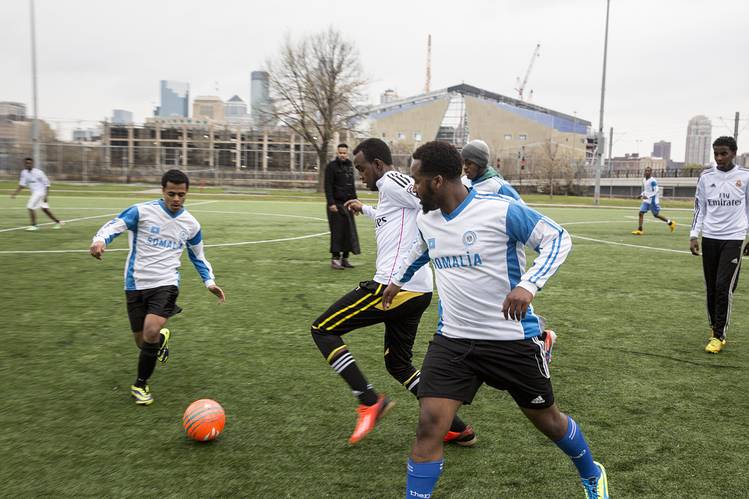 ENLARGEMembers of the Somali community play in a soccer tournament in the Cedar Riverside neighborhood in Minneapolis last month. PHOTO: ACKERMAN + GRUBER FOR THE WALL STREET JOURNAL
ENLARGEMembers of the Somali community play in a soccer tournament in the Cedar Riverside neighborhood in Minneapolis last month. PHOTO: ACKERMAN + GRUBER FOR THE WALL STREET JOURNALFederal prosecutors charged Mr. Yusuf with conspiring to join a terrorist organization, which would typically keep him in jail until trial. But Chief U.S. District Judge Michael Davis, after reviewing documents and hearing arguments from his attorneys, agreed to allow Mr. Yusuf to undergo rehabilitation at a halfway house until his sentencing. A sentencing date hasn’t been set.
Mr. Yusuf hasn’t been made available for interviews, and details of the program haven’t been released. But his attorney, Mr. Amin and the head of the nonprofit overseeing the program agreed to disclose some aspects of it.
“This is brand new,” said Mr. Yusuf’s attorney, Jean Brandl. She deemed the process for his rehabilitation “careful, deliberate and slow.” She said she is convinced that Mr. Yusuf has the potential to be “a contributing member of society” and an “emissary to his community.”
Heartland Democracy, the Minneapolis nonprofit handling Mr. Yusuf’s program, said it adapted a “civic-engagement” curriculum about identity and values for at-risk youth to a program specifically for Mr. Yusuf.
Mr. Yusuf, who wears an ankle monitor, leaves the halfway house with an escort only to visit federal offices, see his attorneys or meet with religious scholars, Mr. Amin or Mary McKinley, Heartland Democracy’s executive director. Ms. McKinley formerly worked on national security issues at nonprofits including the Aspen Institute.
The teenager has become an avid reader of the history books, essays and poetry he has been assigned, his mentors say. He then composes commentaries about them for discussion with Mr. Amin.
Recently, Mr. Amin, who has a master’s degree in education, asked Mr. Yusuf to read an article about what inspired Native American author Sherman Alexie, the first in his family to go to college, to start writing. Mr. Alexie discusses a poem titled “I am the reservation of my mind,” which helped him realize the limitations he placed on himself and those imposed by society.
“I told him he had to go home and think about the reservations of his own mind—who he is, what he wants to become—and then write a poem,” said Mr. Amin.
Mr. Yusuf also has read Richard Wright’s “Native Son,” about an African-American unable to escape the poverty, violence, and discrimination that afflict his Chicago ghetto and American society in the 1930s.
Mr. Amin said that Mr. Yusuf wrestles with challenges facing many Somali-American youngsters, who may feel caught between two worlds: that of their conservative parents intent on him preserving their culture and religion and that of free, secular America.
The U.S. is home to about 155,000 Somalis, according to the Pew Research Center. The majority are refugees from civil war, and began arriving in large numbers in the mid-1990s. In Minneapolis, site of the biggest Somali community, large families crowd into government-subsidized housing. With limited education and skills and years stuck in camps, many adults struggle to make ends meet, according to advocates, who say that more than half of Somali families in the area live below the poverty line. Most are observant Muslims.
“There are strict rules about what it means to be Somali, like being obedient and doing whatever your parents want and practicing your religion,” said Mr. Amin. “Then you go outside to the world, and you can do what you want—and you want to fit in.”
Mr. Amin said some students who attend the high school where he teaches shed their traditional Somali garb and change into clothes of urban American teenagers for the day.
Until last year, Mr. Yusuf, whose father is a commercial van driver and whose mother is a homemaker, seemed to be on a routine track. He finished high school and attended community college. Tall and thin, he loved playing basketball, said his mentors.
Like other Somali Americans lured by extremists, “what is puzzling is that they seem to understand how the [u.S.] system works and what they need to do to get ahead,” said Mr. Amin, “but there is a stronger force that pulls” them toward extremism.
As he sees it, Mr. Yusuf and his peers have to figure out how to be a “hybrid”: a person who can feel American while still identifying with both cultures.
“There are a lot of people thinking we should lock them up and not give them a chance,” said his attorney, Ms. Brandl. “But he shows there is reason for hope.”
Source: http://www.wsj.com
-
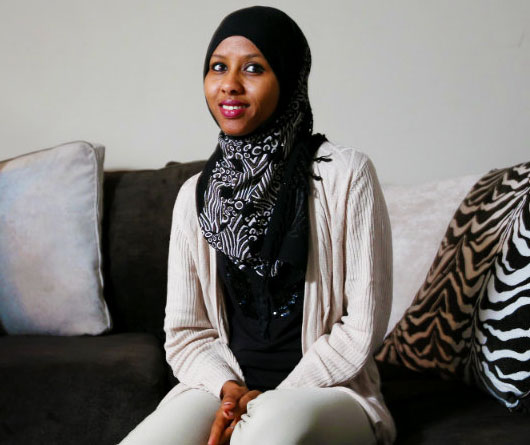 If the Columbus Police Division doesn’t change its policy banning head scarves for female Muslim officers, Ismahan Isse might have a couple of options outside Ohio.The Edmonton Police Service in Alberta, Canada, has reached out to Isse, the 29-year-old Somali-American who said she dropped out of the Columbus police academy this year because she was prohibited from wearing her head scarf, or hijab.The Dispatch wrote about Isse last week, and Staff Sgt. Mark Farnell, an Edmonton police recruiter, read about her dilemma online.He said Edmonton police designed a uniform for Muslim women that includes the head scarf.“She really wanted to be a police officer,” Farnell said. “Why not touch base (and) see if she is interested in coming to Canada and take a look?“She’s a great potential applicant to us.”Edmonton has a growing Somali community and is looking to update its police force to better reflect the city’s diversity, Farnell said. It currently has no Somali police officers.Isse said she spoke to Farnell on Friday.“I’m actually considering (the offer) strongly,” she said.She said she also was contacted by a representative of the Somali-American Police Association in Minneapolis. The Minneapolis-St. Paul area has the largest Somali population in the country. Columbus is No. 2.But Isse, who has an associate degree in criminal justice and works as a temporary office worker for a logistics company, said she would prefer to stay in Columbus.She said that she did not wear her hijab during her four months at the academy. She wore it during background interviews, she said, and the detective who interviewed her said she could not wear it during training.Columbus police officials have said that head scarves are not allowed for safety reasons and because officers should have a uniform look. However, Mayor Michael B. Coleman has asked his safety officials to re-examine the policy.The Police Division’s concerns can be easily addressed by modifying the color and style of head scarves worn by Muslim women, said Romin Iqbal, staff attorney for the Council on American-Islamic Relations’ Ohio chapter.Iqbal said the city should re-examine its policy of addressing religious accommodations in all of its departments, for everyone. The same would go for Christian crosses, Sikh turbans or Jewish yarmulkes, he said.“It’s about more than just one woman and the police department,” he said.Iqbal said he sent a letter to Coleman and to Napoleon Bell, executive director of the city’s Community Relations Commission, last week, urging them to enact suitable regulations to address religious-accommodation requests, even if Isse’s situation is worked out.He said his group also wants to start a similar conversation with Franklin County officials and those in central Ohio suburbs.“This is about helping the city and other local governments, not being adversarial,” Iqbal said.Bell said he wants to know what other cities are doing.“We want to have a very diverse police force that is reflective of our community,” he said. “ We want to look at all opportunities to employ the best and brightest and persons from all backgrounds.”Source: http://www.dispatch.com
If the Columbus Police Division doesn’t change its policy banning head scarves for female Muslim officers, Ismahan Isse might have a couple of options outside Ohio.The Edmonton Police Service in Alberta, Canada, has reached out to Isse, the 29-year-old Somali-American who said she dropped out of the Columbus police academy this year because she was prohibited from wearing her head scarf, or hijab.The Dispatch wrote about Isse last week, and Staff Sgt. Mark Farnell, an Edmonton police recruiter, read about her dilemma online.He said Edmonton police designed a uniform for Muslim women that includes the head scarf.“She really wanted to be a police officer,” Farnell said. “Why not touch base (and) see if she is interested in coming to Canada and take a look?“She’s a great potential applicant to us.”Edmonton has a growing Somali community and is looking to update its police force to better reflect the city’s diversity, Farnell said. It currently has no Somali police officers.Isse said she spoke to Farnell on Friday.“I’m actually considering (the offer) strongly,” she said.She said she also was contacted by a representative of the Somali-American Police Association in Minneapolis. The Minneapolis-St. Paul area has the largest Somali population in the country. Columbus is No. 2.But Isse, who has an associate degree in criminal justice and works as a temporary office worker for a logistics company, said she would prefer to stay in Columbus.She said that she did not wear her hijab during her four months at the academy. She wore it during background interviews, she said, and the detective who interviewed her said she could not wear it during training.Columbus police officials have said that head scarves are not allowed for safety reasons and because officers should have a uniform look. However, Mayor Michael B. Coleman has asked his safety officials to re-examine the policy.The Police Division’s concerns can be easily addressed by modifying the color and style of head scarves worn by Muslim women, said Romin Iqbal, staff attorney for the Council on American-Islamic Relations’ Ohio chapter.Iqbal said the city should re-examine its policy of addressing religious accommodations in all of its departments, for everyone. The same would go for Christian crosses, Sikh turbans or Jewish yarmulkes, he said.“It’s about more than just one woman and the police department,” he said.Iqbal said he sent a letter to Coleman and to Napoleon Bell, executive director of the city’s Community Relations Commission, last week, urging them to enact suitable regulations to address religious-accommodation requests, even if Isse’s situation is worked out.He said his group also wants to start a similar conversation with Franklin County officials and those in central Ohio suburbs.“This is about helping the city and other local governments, not being adversarial,” Iqbal said.Bell said he wants to know what other cities are doing.“We want to have a very diverse police force that is reflective of our community,” he said. “ We want to look at all opportunities to employ the best and brightest and persons from all backgrounds.”Source: http://www.dispatch.com -
 "With my last breath, my soul will slip"Where the ground is what this blood knows"We simply greet it and rest"— "Lay Me Down"Cold Specks"Sons of Anarchy" fans will never forget Season 5's shocking episode "Laying Pipe" set to the memorizing vocals of Cold Specks."I had no idea about it until it came out, but I have never watched the show. My brother-in-law's a huge fan. He heard it and told me about it," says Ladan Hussein, a.k.a. Al Spx, a.k.a. Cold Specks, who also performed "Lay Me Down" on venerable late night British TV show "Later With Jools Holland" along with guests Pete Townsend, plus Florence and the Machines.After transfixing the whole nation with her electrifying debut that Holland lauded as "the power of the single human voice" Spx simple calls the fateful appearance "good luck.""I started writing songs when I was a teenager (in Etobicoke). I was in university (studying English) I made a collection of song demos that I gave to a friend of mine. He passed them on to his brother Jim Anderson, (Blur, Depeche Mode) who was a record producer in England."
"With my last breath, my soul will slip"Where the ground is what this blood knows"We simply greet it and rest"— "Lay Me Down"Cold Specks"Sons of Anarchy" fans will never forget Season 5's shocking episode "Laying Pipe" set to the memorizing vocals of Cold Specks."I had no idea about it until it came out, but I have never watched the show. My brother-in-law's a huge fan. He heard it and told me about it," says Ladan Hussein, a.k.a. Al Spx, a.k.a. Cold Specks, who also performed "Lay Me Down" on venerable late night British TV show "Later With Jools Holland" along with guests Pete Townsend, plus Florence and the Machines.After transfixing the whole nation with her electrifying debut that Holland lauded as "the power of the single human voice" Spx simple calls the fateful appearance "good luck.""I started writing songs when I was a teenager (in Etobicoke). I was in university (studying English) I made a collection of song demos that I gave to a friend of mine. He passed them on to his brother Jim Anderson, (Blur, Depeche Mode) who was a record producer in England." Spx (with a sister in K-W) is "self taught," also learning from her father and a "lot of Somalian singing" in the household.Cold Specks is taken from James Joyce's "Ulysses" line "born all in the dark wormy earth, cold specks of fire, evil, lights shining in the darkness."Spx, now based in Montreal, hearkens the spirituals of Mahalia Jackson, the vintage soul of James Carr, and the chutzpah of Grace Jones. She is vocally entrancing writing songs of strange comfort yet underlying menace. Produced by Anderson, dark-folk debut "I Predict a Graceful Expulsion" (Mute Records, England, Arts and Crafts, Canada) featuring "Blank Maps," (UK hit single) "Holland" and "The Mark" became Spx-dubbed "doom-soul." "I Predict" also made the 2012 Polaris Music Prize Short List, and garnered Cold Specks a 2013 Juno nod for Breakthrough Artist.She also collaborated with Moby ("A Case Of Shame") Swans singer Michael Gira ("Bring the Sun") and Joni Mitchell trumpeter Ambrose Akinmusire ("Ceaseless Inexhaustible Child").
Spx (with a sister in K-W) is "self taught," also learning from her father and a "lot of Somalian singing" in the household.Cold Specks is taken from James Joyce's "Ulysses" line "born all in the dark wormy earth, cold specks of fire, evil, lights shining in the darkness."Spx, now based in Montreal, hearkens the spirituals of Mahalia Jackson, the vintage soul of James Carr, and the chutzpah of Grace Jones. She is vocally entrancing writing songs of strange comfort yet underlying menace. Produced by Anderson, dark-folk debut "I Predict a Graceful Expulsion" (Mute Records, England, Arts and Crafts, Canada) featuring "Blank Maps," (UK hit single) "Holland" and "The Mark" became Spx-dubbed "doom-soul." "I Predict" also made the 2012 Polaris Music Prize Short List, and garnered Cold Specks a 2013 Juno nod for Breakthrough Artist.She also collaborated with Moby ("A Case Of Shame") Swans singer Michael Gira ("Bring the Sun") and Joni Mitchell trumpeter Ambrose Akinmusire ("Ceaseless Inexhaustible Child"). These collaborations and the urge to exorcise media catch phrase "hauntingly beautiful singer" spawned Cold Specks' sophomore album "Neuroplasticity" (how the human brain learns), partly written at a cottage in Somerset, England and finished off in Montreal (Hotel2Tango — Arcade Fire, Belle Orchestre) and Toronto (Revolution Recordings — Sarah Slean, Danko Jones). Collaborations continued with Swans-singer Gira on album tracks "Exit Plan" and Akinmusire on mournful finale "A Season of Doubt."Produced by bass/synth player Anderson, "Neuroplasticity" is deliberately more atmospheric (think Massive Attack or Portishead), but vocally visceral. Spx's voice has transcended into a bewitching southern goth-drenched doom-soul. The album includes "Old Knives" (decapitating a sleeping lover), uptempo menace mantra "Bodies at Bay" and eerie ritualistic video single "Absisto" (Latin for withdraw)."I was in a cottage outside of Glastonbury in a very bizarre town (Wick, Somerset) which is full of spiritual hippies. I could not find a pair of pants, socks or underwear in town, but I could probably get crystal green cauldrons and a bunch of weird stuff. I wrote several strange songs. So I think that probably affected the tone of my writing," says Spx with a coy laugh, adding that her dream collaboration is singing with Kate Bush.Source: http://www.guelphmercury.com/
These collaborations and the urge to exorcise media catch phrase "hauntingly beautiful singer" spawned Cold Specks' sophomore album "Neuroplasticity" (how the human brain learns), partly written at a cottage in Somerset, England and finished off in Montreal (Hotel2Tango — Arcade Fire, Belle Orchestre) and Toronto (Revolution Recordings — Sarah Slean, Danko Jones). Collaborations continued with Swans-singer Gira on album tracks "Exit Plan" and Akinmusire on mournful finale "A Season of Doubt."Produced by bass/synth player Anderson, "Neuroplasticity" is deliberately more atmospheric (think Massive Attack or Portishead), but vocally visceral. Spx's voice has transcended into a bewitching southern goth-drenched doom-soul. The album includes "Old Knives" (decapitating a sleeping lover), uptempo menace mantra "Bodies at Bay" and eerie ritualistic video single "Absisto" (Latin for withdraw)."I was in a cottage outside of Glastonbury in a very bizarre town (Wick, Somerset) which is full of spiritual hippies. I could not find a pair of pants, socks or underwear in town, but I could probably get crystal green cauldrons and a bunch of weird stuff. I wrote several strange songs. So I think that probably affected the tone of my writing," says Spx with a coy laugh, adding that her dream collaboration is singing with Kate Bush.Source: http://www.guelphmercury.com/ -
A British woman has spoken of her shock at discovering her mother is an influential jihadist who helps suicide bombers and is known as Mama Shabab. Amal Farah was stunned when police knocked on her door to tell her that Faduma Jama had become a pivotal member of Al Shabab, the Somali jihadists behind the Westgate mall massacre in Nairobi. Mother-of-two Ms Farah had cut off all contact from her strict Muslim family five years earlier and fearful for her life, had changed her number, her name and hidden her whereabouts.
Describing the moment she was told, Ms Farah told The Sunday People: 'The man and the woman were from the anti-terror unit. It was utterly devastating.' Known as Mama Shabab, Faduma Jama allegedly ran a safe house for suicide bombers and Western fighters recruited into the militant Islamic organisation.The police officers told Ms Farah, 34, to Google her mother's name if she wanted to know why she was in trouble.She said: 'It was not until I got to work that I could Google her name. There were all these pictures of people injured by suicide bombs.'As I read about what she'd done I felt so alone. I couldn't just turn to my colleagues and say, "Guess what? My mum's a wanted terrorist." 'I couldn't believe my own mother was involved. I cried non-stop for days after that.'Shocking discovery: Amal Farah (left) was stunned when police knocked on her door to tell her that her mother Faduma Jama (right) had become a pivotal member of Al Shabab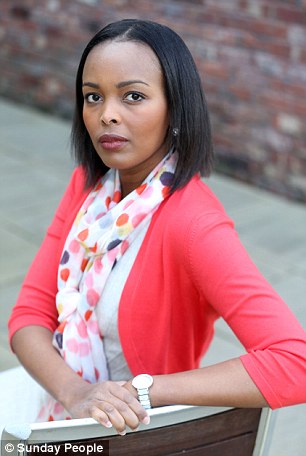
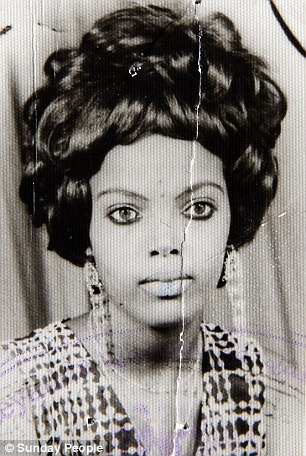 In the three years since that earth-shattering day in July 2012, Ms Farah said: 'I've grieved for her. It's brought closure to any romantic idea about one day things being better with my mum.'I've accepted I'll never see her again. How could she ever explain that she'd joined Al Shabab? 'It's too terrible. I fear that one day I will see her on TV or I'll get a knock on the door to say she's been killed. But despite all the terrible things she's done, she is still my mother.'For her own protection, we are not disclosing the details of Ms Farah's current location or that of her family.But using contacts she has from Somalia, where she was born, she discovered her mother married one of Al Shabab's leaders.She added: 'I don't know about my mother's involvement with Western recruits like Samantha Lewthwaite but I know it's alleged. I think Mama Shabab is a horrible name.' Oddly, though, Ms Farah can see how her mother might have earned the chillingly affectionate title.She explained: 'She could be very kind and charming. I can see how natural it would be for her to be that motherly figure.'She is utterly devoted to what she believes in and being a wife of a jihadist is a way she can help as a woman.'Loving: Amal, pictured left with her mother, was born in the Somalian capital Mogadishu but now lives in Britain. Pictured right, Faduma Jama, now known as Mama Shabab, meets a soldier in Syria in 1984
In the three years since that earth-shattering day in July 2012, Ms Farah said: 'I've grieved for her. It's brought closure to any romantic idea about one day things being better with my mum.'I've accepted I'll never see her again. How could she ever explain that she'd joined Al Shabab? 'It's too terrible. I fear that one day I will see her on TV or I'll get a knock on the door to say she's been killed. But despite all the terrible things she's done, she is still my mother.'For her own protection, we are not disclosing the details of Ms Farah's current location or that of her family.But using contacts she has from Somalia, where she was born, she discovered her mother married one of Al Shabab's leaders.She added: 'I don't know about my mother's involvement with Western recruits like Samantha Lewthwaite but I know it's alleged. I think Mama Shabab is a horrible name.' Oddly, though, Ms Farah can see how her mother might have earned the chillingly affectionate title.She explained: 'She could be very kind and charming. I can see how natural it would be for her to be that motherly figure.'She is utterly devoted to what she believes in and being a wife of a jihadist is a way she can help as a woman.'Loving: Amal, pictured left with her mother, was born in the Somalian capital Mogadishu but now lives in Britain. Pictured right, Faduma Jama, now known as Mama Shabab, meets a soldier in Syria in 1984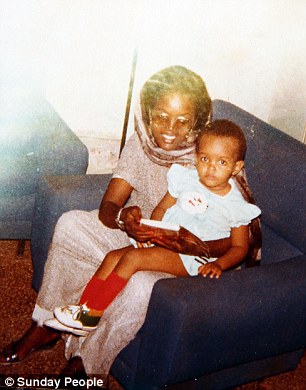
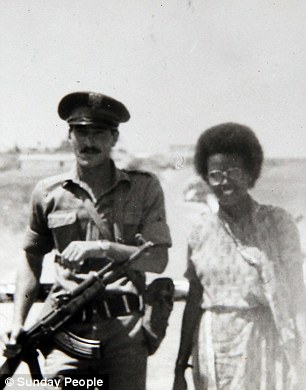 TV appearance: Mother-of-two Amal Farah was recently interviewed about her ordeal on ITV's Lorraine
TV appearance: Mother-of-two Amal Farah was recently interviewed about her ordeal on ITV's Lorraine But the image of her mother as Mama Shabab is a long way from the woman of Ms Farah's earliest memories.She said: 'When I was little my mum loved fashion. She had these fantastic hairstyles. Her brother lived in Geneva and she would visit him and bring back all these amazing clothes.'Mum was an independent, educated woman. She even divorced my dad because she wanted to travel.' Ms Farah's father was a colonel in the Somali army under military dictator Siad Barre.When she was two he went into exile in Ethiopia to campaign for democracy and a year later he was killed by a landmine. By then Ms Farah's mother had become more religious and her childhood more restrictive - being forced to wear the hijab at the age of six.When she was ten her family fled Somalia after being granted refugee status in Canada.Amal Farah recalls living with mum under strict Islam rule
But the image of her mother as Mama Shabab is a long way from the woman of Ms Farah's earliest memories.She said: 'When I was little my mum loved fashion. She had these fantastic hairstyles. Her brother lived in Geneva and she would visit him and bring back all these amazing clothes.'Mum was an independent, educated woman. She even divorced my dad because she wanted to travel.' Ms Farah's father was a colonel in the Somali army under military dictator Siad Barre.When she was two he went into exile in Ethiopia to campaign for democracy and a year later he was killed by a landmine. By then Ms Farah's mother had become more religious and her childhood more restrictive - being forced to wear the hijab at the age of six.When she was ten her family fled Somalia after being granted refugee status in Canada.Amal Farah recalls living with mum under strict Islam rule But any hope of a Western upbringing was quashed after she was enrolled in a strict Islamic school.She said: 'Suddenly I was wasn't allowed to play with my male cousins. We weren't allowed to listen to music.'Anything that was deemed frivolous, anything that took you away from the importance of Allah, was forbidden.'When she was 15 her mother split from her latest husband and took her and her five younger siblings to live in Leicester. It was only when she began studying for a degree in molecular biology that a new world opened up.'It was a revelation,' she said. 'I met atheists, Christians, Jews, Hindus - they challenged me about my views, and I about theirs. It was an incredible sensation to be able to discuss ideas without fear.'She felt in her heart that to be true to herself she could no longer call herself a Muslim.Recalling the day she broached the subject with her family, Ms Farah said: 'My mum's first words were, "You're going to hell!" Then my uncle flew over from Saudi Arabia and for three days I was locked in the house and forced to listen to him.'When she failed to change her mind, her mother cut off all contact with her. She even left Britain and took the family to Dubai.She explained: 'She was petrified that the rest of my siblings would leave Islam like I had. I was a sheep lost to the wolves and she had to protect the rest of the flock.'She could be very kind and charming. I can see how natural it would be for her to be that motherly figure.Amal Farah on her motherMs Farah got an evening job in a call centre and with the support of friends built a new life for herself. She stopped wearing a headscarf and started listening to music.The last time Amal saw her mother was at Leicester train station in 2005, shortly before she left. She said: 'It was my dream to get out and finally I had escaped. 'It was a haze. I didn't know it would be the last time I would see her. We hugged but she made it clear I was putting her through a lot of pain. She was genuinely worried for my soul.'At that time her younger sister Asia was also leading a double life.'She'd had a secret part-time job as a waitress and had a wardrobe of shorts and miniskirts. Mum found them and I knew Asia was in trouble', Ms Farah adds.Ms Farah (pictured right, with her father in Somalia) cut off all contact with her family several years ago
But any hope of a Western upbringing was quashed after she was enrolled in a strict Islamic school.She said: 'Suddenly I was wasn't allowed to play with my male cousins. We weren't allowed to listen to music.'Anything that was deemed frivolous, anything that took you away from the importance of Allah, was forbidden.'When she was 15 her mother split from her latest husband and took her and her five younger siblings to live in Leicester. It was only when she began studying for a degree in molecular biology that a new world opened up.'It was a revelation,' she said. 'I met atheists, Christians, Jews, Hindus - they challenged me about my views, and I about theirs. It was an incredible sensation to be able to discuss ideas without fear.'She felt in her heart that to be true to herself she could no longer call herself a Muslim.Recalling the day she broached the subject with her family, Ms Farah said: 'My mum's first words were, "You're going to hell!" Then my uncle flew over from Saudi Arabia and for three days I was locked in the house and forced to listen to him.'When she failed to change her mind, her mother cut off all contact with her. She even left Britain and took the family to Dubai.She explained: 'She was petrified that the rest of my siblings would leave Islam like I had. I was a sheep lost to the wolves and she had to protect the rest of the flock.'She could be very kind and charming. I can see how natural it would be for her to be that motherly figure.Amal Farah on her motherMs Farah got an evening job in a call centre and with the support of friends built a new life for herself. She stopped wearing a headscarf and started listening to music.The last time Amal saw her mother was at Leicester train station in 2005, shortly before she left. She said: 'It was my dream to get out and finally I had escaped. 'It was a haze. I didn't know it would be the last time I would see her. We hugged but she made it clear I was putting her through a lot of pain. She was genuinely worried for my soul.'At that time her younger sister Asia was also leading a double life.'She'd had a secret part-time job as a waitress and had a wardrobe of shorts and miniskirts. Mum found them and I knew Asia was in trouble', Ms Farah adds.Ms Farah (pictured right, with her father in Somalia) cut off all contact with her family several years ago
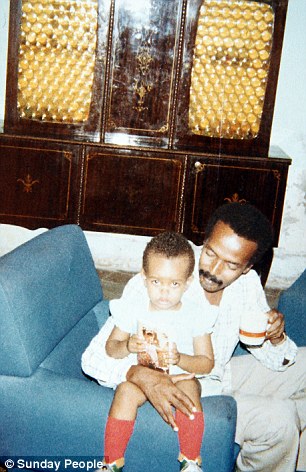 'I panicked and emailed her, saying no matter what, she must not to go to Somalia. I knew she'd never leave if she did.'I was told to butt out if I knew what was good for me. A few weeks later my mother called me to say Asia was getting married in two days' time. Just like that. I was heartbroken.'The last time Ms Farah spoke to her mother was in 2007. She said: 'She was preaching to me to over the phone. She kept saying "Are you praying?" She couldn't accept that I had left Islam.'I asked where she was and she said, "I can't tell you, I'm being pursued by your infidel uncle." She meant a friend of my father's who was then president of Somalia. I realise she must have been in the thick of Al Shabab even then.'By then Ms Farah had met her husband, a Jewish lawyer, at university but she had a sense of dread.She explained: 'I knew they would do what they could to prevent us being together.'I knew I would never be safe, that I was a thorn in my family's side. So I changed my number and made sure they didn't know where I was living.'I knew I would never be safe, that I was a thorn in my family's side. So I changed my number and made sure they didn't know where I was living.At their wedding in 2010 none of her family were present. Ms Farah said: 'It was tinged with sadness. I would have loved to have seen my mother there but there was no way she would ever have approved, especially of someone Jewish.'Since finding out about her mother Amal has become a member of the Council of Ex-Muslims of Britain, speaking against radical Islam, and of One Law For All, a campaign group.Her life now is one that she never thought she would have as a child.She says: 'All my dreams have come true. I have a wonderful family, an incredible husband and I just feel so fortunate. Sometimes I pinch myself. It's the life I never thought I'd have.'But I miss my siblings, especially my sister. I hope wherever they are that they are happy. I love my mum but I will never be able to make sense of the terrible things she has done.'It hurts knowing I won't see her again but she has made her choice.' Source: http://www.dailymail.co.ukThe white widow: Ms Farah says she is uncertain of her mother's involvement with Samantha Lewthwaite, a British woman who is one of the world's most wanted female terror suspects
'I panicked and emailed her, saying no matter what, she must not to go to Somalia. I knew she'd never leave if she did.'I was told to butt out if I knew what was good for me. A few weeks later my mother called me to say Asia was getting married in two days' time. Just like that. I was heartbroken.'The last time Ms Farah spoke to her mother was in 2007. She said: 'She was preaching to me to over the phone. She kept saying "Are you praying?" She couldn't accept that I had left Islam.'I asked where she was and she said, "I can't tell you, I'm being pursued by your infidel uncle." She meant a friend of my father's who was then president of Somalia. I realise she must have been in the thick of Al Shabab even then.'By then Ms Farah had met her husband, a Jewish lawyer, at university but she had a sense of dread.She explained: 'I knew they would do what they could to prevent us being together.'I knew I would never be safe, that I was a thorn in my family's side. So I changed my number and made sure they didn't know where I was living.'I knew I would never be safe, that I was a thorn in my family's side. So I changed my number and made sure they didn't know where I was living.At their wedding in 2010 none of her family were present. Ms Farah said: 'It was tinged with sadness. I would have loved to have seen my mother there but there was no way she would ever have approved, especially of someone Jewish.'Since finding out about her mother Amal has become a member of the Council of Ex-Muslims of Britain, speaking against radical Islam, and of One Law For All, a campaign group.Her life now is one that she never thought she would have as a child.She says: 'All my dreams have come true. I have a wonderful family, an incredible husband and I just feel so fortunate. Sometimes I pinch myself. It's the life I never thought I'd have.'But I miss my siblings, especially my sister. I hope wherever they are that they are happy. I love my mum but I will never be able to make sense of the terrible things she has done.'It hurts knowing I won't see her again but she has made her choice.' Source: http://www.dailymail.co.ukThe white widow: Ms Farah says she is uncertain of her mother's involvement with Samantha Lewthwaite, a British woman who is one of the world's most wanted female terror suspects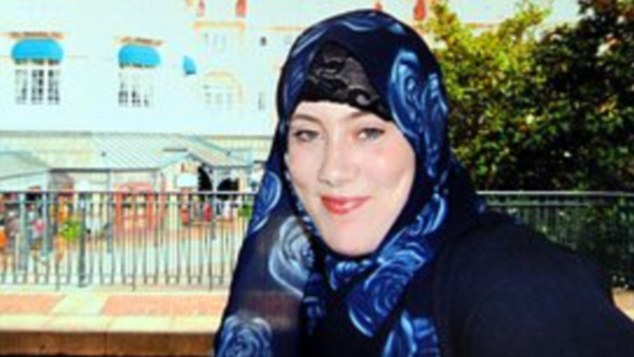
-
Yesterday, the Second of May, 2015, President Hassan Sheikh Mohamud and Puntland President Abdiwali Gaas signed a political agreement in Garowe, Puntland that severely tasks the mind and whose consequences have far reaching political as well as constitutional ramifications. This is what you get when you have timid leaders with small souls, small hearts, small brains and small balls. These leaders have shamelessly signed this agreement which contains provisions that are illegal, unconstitutional, un-Somali and also unconscionable. Article 4 (c ) of the agreement declares that no Somali residents of Puntltand can take part in the on-going Cadaado conference on the formation of the Central Somalia State; in other words this agreement that President Hassan Sheikh Mohamud committed his signature to prohibits Somali citizens from exercising their fundamental rights to freedom of assembly and also freedom of mobility.
The fundamental inalienable rights of Somali citizens are enshrined in Chapter Two of the Provisional Constitution of Somalia, adopted on August 1, 2012 and which is the legal foundation under which the President was elected.
Article 16 of the Constitution guarantees all Somali citizens the freedom of assembly and affirms that the state cannot force citizens to associate or disassociate whom the government desires or does not desire. Furthermore, Article 21 of the constitution guarantees all Somali citizens the freedom to move, visit, leave or reside in any city, town, village or hamlet anywhere in Somalia.
The agreement that the president signed clearly constitutes a colossal violation of the constitution and may trigger a credible cause for his impeachment. The president already stands accused of usurping the powers of every prime minister under his appointment, – powers that are invested with the council of Ministers under Article 97 of the constitution-, as he is also faulted with interfering with the independence of the judiciary. His signature on this agreement would serve as the straw that broke the camels back, and it should signal to the Somali public that this president has a grave propensity for bending the rules, and in this case he has stomped on the basic law of the country, the constitution, notwithstanding the fact that he is duty bound to be the guardian of the constitution as reflected in Article 87(1)© of the constitution.
Now, what is the purpose of the impugned provision of this agreement? It is a provision that President Abdiwali Gaas of puntland has inserted in the framework of the agreement in order to placate his Puntland constituency and play to the political gallery at home. It is politics as its raw and it is understandable but both His Excellency Hassan Sheikh Mohamud and His Excellency Abdiwali Gaas have demonstrated that they have no qualms to appeal to the basic primordial instincts of a traumatized and emotional public in order to cynically gain personal political gains; in the case of Mr. Gaas, to win the support of the man in the street in Puntland, and in the case of HSM, to obtain consent for an extension of his term from Puntland and the other emerging administrations, a pipe dream. Yet, this calculation, while grossly loopy, also conveniently discounts the reality surrounding how the federation process should be legally undertaken within the ambit of the constitution.
Neither the president nor the leaders of the regional administrations have any primary role in the state formation process and the consequent formations of the federal units under the constitution. Indeed, under Article 49 and 111E of the constitution, the federation process and the creation of federal units is within the purview of the Federal Parliament of Somalia and the Independent Boundaries and Federations Commission, and no where in these articles is it proscribed a role for the president and the leaders of the regional administrations. More specifically, Article 111E(5) is very clear as to which institution is tasked with the determination of the boundaries of the potential federal units. It emphatically states that “the final determination of the boundaries of the Federal Member states shall be made by the Federal Parliament and shall be based on the recommendations of the Boundaries and the Federations Commission.”
This ill thought out agreement also raises broader philosophical principles about peace, reconciliation and the sanctity of Somali citizenship. The very essence of the Constitution making process was predicated on the utility of the constitutional text and processes as a conflict resolution tool whose ultimate expected outcome would be durable and sustainable peace among Somali communities. It is therefore utter madness for our leaders to partition Mudug communities along clan lines. When you divide communities along clan or other ascribed identities, you essentially set in place institutionalized hostility, when what the Galkayo conundrum requires is genuine reconciliation and the fostering of a culture of cooperative co-existence. But given the fact that we have small leaders in this case-with small souls, small hearts and small balls-our politics has been reduced to a warped sense of imagination.
This agreement is illegal and should not only be damned but also ignored. The correct platform for determining the boundary of a future Central Somalia state is the Boundaries and Federations Commission, which ought to make an informed and expert recommendation to the Federal parliament, and it is the Federal Parliament of Somalia that is constitutionally tasked to make the final determination. As such, both the president of Puntland and the President of Somalia have exceeded their authority in entering into this illegal agreement.
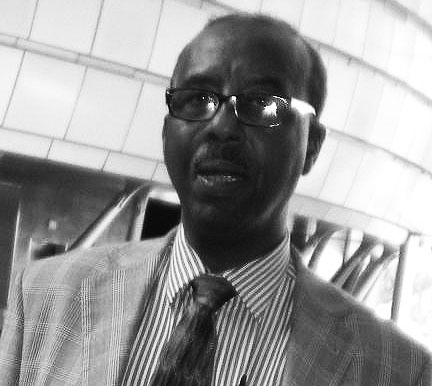 Abdi Hosh is former Minister of constitutional Affairs and Reconciliation at Transitional Federal government of Somalia( 2011/2012). He is currently a federal MP. He can be reached at abdihosh1@gmail.com
Abdi Hosh is former Minister of constitutional Affairs and Reconciliation at Transitional Federal government of Somalia( 2011/2012). He is currently a federal MP. He can be reached at abdihosh1@gmail.com -
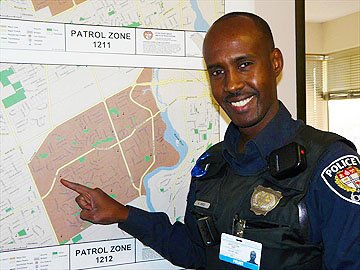 The federal election is six months away but already, considerable excitement and debate has gripped the Ottawa ethnic community over the surprise nomination of Ottawa police officer Abdulkadir Abdi as Conservative party candidate for Ottawa West-Nepean.And it is a debate that could have a significant bearing on who wins this bellwether riding on October 19. The city’s black community in particular, has worked long and hard for the day when someone from their ranks would be elected to office.With the blessing of now-departed incumbent John Baird and support from local Conservative stalwarts such as Senator Vernon White, Abdi won the nomination. Unlike many past candidates who had neither the community profile nor a powerful organization behind them, Abdi appears to have both. A member of the Somali community, he has been a police officer for more than 10 years.You’d think such a candidate would be embraced by a community hungry for a winner, but you’d be wrong. The excitement over his candidacy is tempered by considerable unease over his choice of party. Generally, the ethnic minority community in Ottawa tends to gravitate toward the Liberal party, and the Conservative outreach to ethnic minorities hasn’t been felt in the capital. Antipathy toward the Conservative party is particularly strong in the Muslim community where many believe that Prime Minister Stephen Harper not only dislikes them, but fuels prejudice against them. They point to his recent comments on the niqab and their use for Conservative party fundraising as the latest example.Even though many in the ethnic community are excited about the prospect of the city’s first black or Muslim MP, there is considerable opposition to voting for someone who would not only help Harper win, but go on to vote for his policies. A number of community leaders I spoke with, including Muslims, (this is no scientific poll) are agonizing over this, and for now, are not willing to tip their hand. Somali community leaders are reaching out to other communities for support and it remains to be seen how successful they’ll be. It goes without saying that there’s no love lost between Harper’s Conservative party and many Muslims, but the irony here is that the city’s first Muslim MP could well turn out to be a Conservative.Abdi will face Liberal Anita Vandenbeld, and it is not fanciful to think he could win. Liberals and Conservatives have both won the riding in its current and earlier incarnation. But since long-running Liberal MP Marlene Catterall retired in 2005, Baird has held the seat for a decade. In 2011, he won with about 45 per cent of the vote, compared with 32 per cent for Vandenbeld, and 20 per cent for NDP’s Marlene Rivier. Baird’s larger-than-life profile was clearly a key factor in his chain of victories, and Abdi obviously doesn’t have Baird’s cachet. Liberals will fancy their chances this time, but with the Conservative political machine, and a reputedly large war chest behind him, it would be a mistake to write Abdi off.Whatever happens on election day, Abdi’s nomination is a coup for Conservatives, who can say that they are a big tent party that is welcoming to all. The Somali community is certainly excited about Abdi’s candidacy, and is sparing no effort to back him, just as they helped him sign up new members to win the nomination. Ethnic minorities make up about 28 per cent of Ottawa West-Nepean, and if they can be mobilized to come out in numbers and vote for Abdi, October 19 could be a long day for Vandenbeld. But it is a big “if.”Ottawa West-Nepean has a knack for offering must-watch races, and the coming election will be no different. This will not be a battle of giants, but the prospect of a Muslim running on a Conservative party ticket in a must-win riding for both Liberals and Conservatives, will be no less fascinating.This article was written by Ottawa Citizen columnist Mohammed Adam.Source: http://www.ottawacitizen.com/
The federal election is six months away but already, considerable excitement and debate has gripped the Ottawa ethnic community over the surprise nomination of Ottawa police officer Abdulkadir Abdi as Conservative party candidate for Ottawa West-Nepean.And it is a debate that could have a significant bearing on who wins this bellwether riding on October 19. The city’s black community in particular, has worked long and hard for the day when someone from their ranks would be elected to office.With the blessing of now-departed incumbent John Baird and support from local Conservative stalwarts such as Senator Vernon White, Abdi won the nomination. Unlike many past candidates who had neither the community profile nor a powerful organization behind them, Abdi appears to have both. A member of the Somali community, he has been a police officer for more than 10 years.You’d think such a candidate would be embraced by a community hungry for a winner, but you’d be wrong. The excitement over his candidacy is tempered by considerable unease over his choice of party. Generally, the ethnic minority community in Ottawa tends to gravitate toward the Liberal party, and the Conservative outreach to ethnic minorities hasn’t been felt in the capital. Antipathy toward the Conservative party is particularly strong in the Muslim community where many believe that Prime Minister Stephen Harper not only dislikes them, but fuels prejudice against them. They point to his recent comments on the niqab and their use for Conservative party fundraising as the latest example.Even though many in the ethnic community are excited about the prospect of the city’s first black or Muslim MP, there is considerable opposition to voting for someone who would not only help Harper win, but go on to vote for his policies. A number of community leaders I spoke with, including Muslims, (this is no scientific poll) are agonizing over this, and for now, are not willing to tip their hand. Somali community leaders are reaching out to other communities for support and it remains to be seen how successful they’ll be. It goes without saying that there’s no love lost between Harper’s Conservative party and many Muslims, but the irony here is that the city’s first Muslim MP could well turn out to be a Conservative.Abdi will face Liberal Anita Vandenbeld, and it is not fanciful to think he could win. Liberals and Conservatives have both won the riding in its current and earlier incarnation. But since long-running Liberal MP Marlene Catterall retired in 2005, Baird has held the seat for a decade. In 2011, he won with about 45 per cent of the vote, compared with 32 per cent for Vandenbeld, and 20 per cent for NDP’s Marlene Rivier. Baird’s larger-than-life profile was clearly a key factor in his chain of victories, and Abdi obviously doesn’t have Baird’s cachet. Liberals will fancy their chances this time, but with the Conservative political machine, and a reputedly large war chest behind him, it would be a mistake to write Abdi off.Whatever happens on election day, Abdi’s nomination is a coup for Conservatives, who can say that they are a big tent party that is welcoming to all. The Somali community is certainly excited about Abdi’s candidacy, and is sparing no effort to back him, just as they helped him sign up new members to win the nomination. Ethnic minorities make up about 28 per cent of Ottawa West-Nepean, and if they can be mobilized to come out in numbers and vote for Abdi, October 19 could be a long day for Vandenbeld. But it is a big “if.”Ottawa West-Nepean has a knack for offering must-watch races, and the coming election will be no different. This will not be a battle of giants, but the prospect of a Muslim running on a Conservative party ticket in a must-win riding for both Liberals and Conservatives, will be no less fascinating.This article was written by Ottawa Citizen columnist Mohammed Adam.Source: http://www.ottawacitizen.com/ -
The student, a Somali woman named Rawdah Abdisalaam, who was known under the Twitter handle @_UmmWaqqas was discovered to be working as a senior recruiter while living and studying in the coastal city. Reporters for Channel 4 News in the UK figured out she was based in Seattle by identifying background locations in photos she posted on her account.
Her Twitter account had multiple names like @Rawdah_Abdi and @Rodaa27 and she had 8,000 followers. It has since been deactivated. Media had in the past speculated that she was Dutch or British. She was a shadowy figure, face never shown, who would be one of the last contacts potential recruits for the Islamic State would reach out to before crossing into their new life of combat. But her Twitter account gave her away as she tweeted photos of football games (she's a Broncos fan) or pizza from the comfort of a major American city, all while encouraging young men and women to emigrate to the Islamic State's battle grounds.
"I'm actually lost for words," one school friend who didn't want to reveal their name told Channel 4 News. "The Rawdah you are referring to is a childhood friend." Friends confirmed that @_UmmWaqqas was Abdisalaam's account but that she had left Seattle, indicating to reporters she may have headed to Saudi Arabia, or to Denver, Colorado. Among the content posted on the @_UmmWaqqas account was information on how to emigrate to Syria, commentary about watching extremist lectures and deciding to leave journalism to become a teacher, and IS training materials and videos.
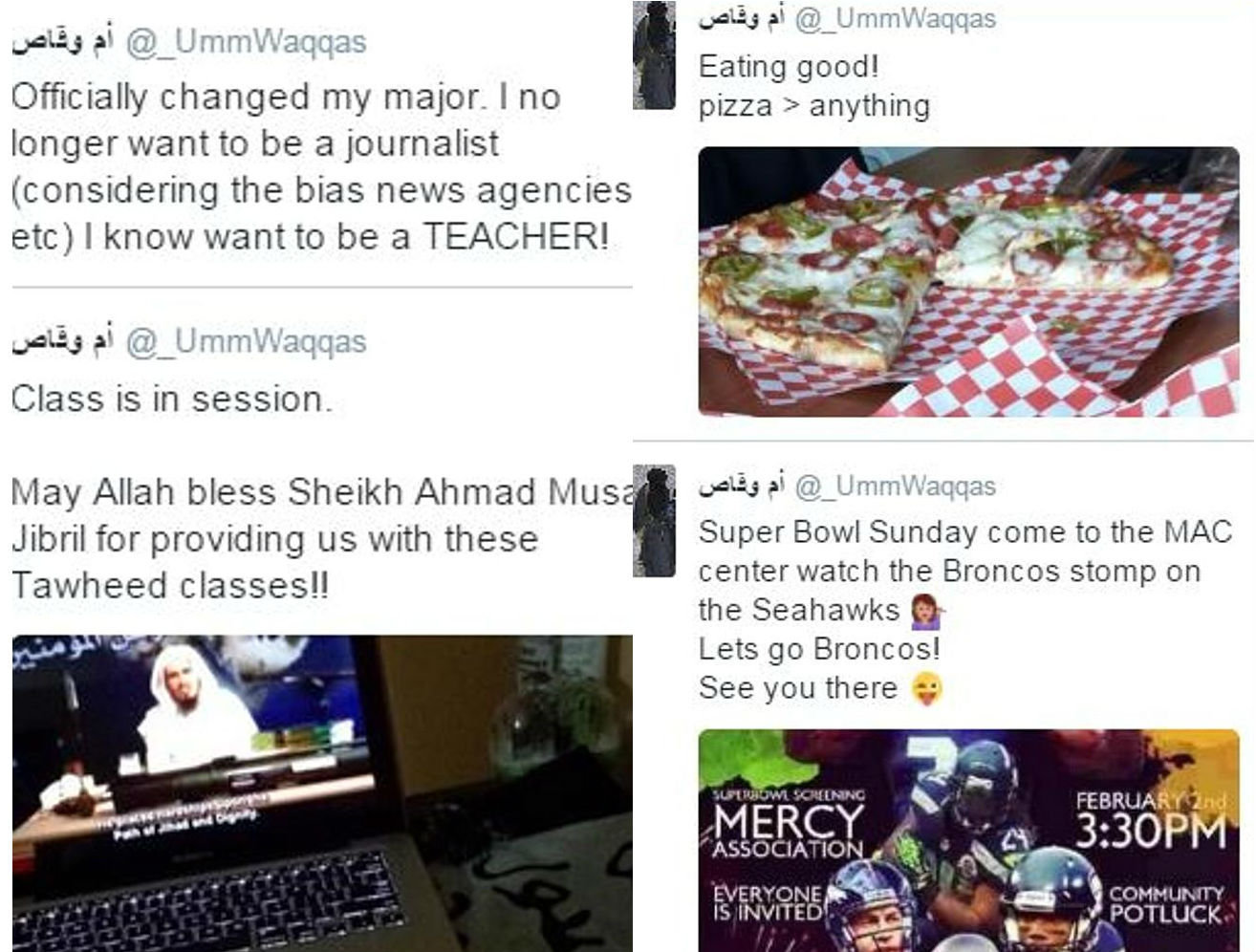 Some of the tweets on @_UmmWaqqas' account reflected her interest in extremist lectures, her disenchantment with her journalism studies, and her excitement over Denver Broncos football.
Some of the tweets on @_UmmWaqqas' account reflected her interest in extremist lectures, her disenchantment with her journalism studies, and her excitement over Denver Broncos football.She also tweeted support after the shocking filmed murder of the Jordanian pilot who the Islamic State burned in a cage — “an eye for an eye if you ask me!” Her contact details are also reported included in a travel "guidebook" for new recruits. @_UmmWaqqas' account was particularly popular among women and she was known to have been in touch with, and often mention, "Umm Layth," another name for Aqsa Mahmood, a girl from Glasgow who joined the Islamic State in 2013, and the public Twitter exchanges show they maintained contact after Mahmood arrived in Syria. It's been clear since the Islamic State burst onto the scene with territorial gains that took Western powers by surprise that they had a novel, and effective social media strategy combining a seemingly inexhaustible network of twitter accounts with slickly produced recruitment and propaganda videos.
Some have likened the discovery to the unmasking of Shami Witness — a popular ISIL account with 18,000 followers that was eventually traced to an executive in Bangalore, India. Both highlight the tricky nature of social media recruitment, where voices can be amplified even by those far from the fighting or even any association with the Islamic State.
Recently it has been European countries that were concerned about radicalized young people fleeing to join IS — The UK has reported that around 600 of its citizens have travelled to join the fighting in Syria and Iraq.
Earlier this month, however, six US militants were arrested by the FBI, demonstrating that the fight isn't so far away as to make the UNited States immune to its potential pull. @_UmmWaqqas was evidently in contact with a few of them.
"I think that there would be enough information from what you've provided me that we would open a case," Seattle FBI's former head of counterintelligence told Channel 4 News in repsonse to the information reporters had gathered.
"If the information we receive suggests she has gone beyond merely advocating for ISIS and actually assisting people to gain access that would become material support and we would open a case."
Read more: http://sputniknews.com
-
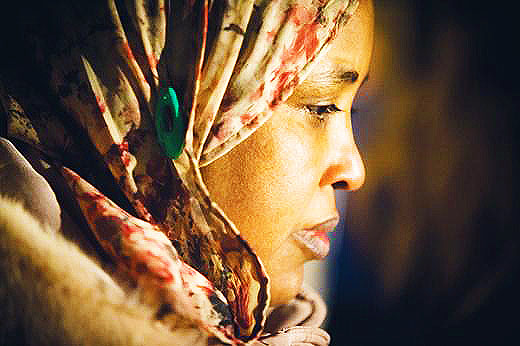 Faduma Arab, co-founder of the advocacy group Positive Change, at a 2013 candlelight vigil on Parliament Hill for the more than 50 Somali Canadian young men who have been murdered across Canada in recent years. Photo by Ashley Fraser/Ottawa Citizen (Reprinted with permission.)
Canada's Somali community continues to struggle with higher-than-average levels of violence, unemployment and discriminationHibaq Gelle is desensitized to death. Last December, when the 25-year-old arrived at a women’s group meeting in west Toronto, the others told her the news: Musa Yusuf had been found stabbed to death in his apartment. His 22-year-old nephew was later charged with second-degree murder. Gelle says she didn’t get upset or angry. “I went home and told my mom, and she seemed surprised I didn’t know. It’s just constant grieving.”Death and murder are no strangers to Gelle. Each time news breaks of a stabbing or shooting, she and her neighbours clench: Let it not be Somali. They dread what has become all too common, another name added to the long list of men from the community lost to violence. “So many other men I know . . . just murdered.”The oldest of four children, Gelle is a second-generation Canadian whose parents fled war-ravaged Somalia in the 1980s for a better life in Canada. They settled in the Toronto suburb of Etobicoke in an area dubbed Little Mogadishu, arguably the largest community of Somalis outside the African nation. Growing up, Gelle rarely saw her mother, who worked three jobs and went to night school to put food on the table for her family. Graduating in 2012 with a degree in applied science, fitness and health promotion, Gelle is now employed as a support worker, helping newcomers to Canada, mostly Somalis, navigate social and immigration services.Gelle is a rare case of success in a community plagued by violence — not only in Toronto, but right across Canada. Many fled civil war in Somalia only to replace warlords with drug lords on the streets of their Canadian neighbourhoods. More than 50 young Somali Canadian men have been murdered in Ontario and Alberta in the last decade, says Positive Change, a group of concerned Somali Canadians tackling youth violence in their community. Experts both inside and outside the Somali community say the root cause of the violence lies in the group’s struggle to integrate.“I Am Canadian,” a 2013 study by the Institute for Research on Public Policy (IRPP), reports that “many young Somali Canadians encounter significant roadblocks that are not conducive to integration or social cohesion. These include systematic, institutional racism on the part of schools, by police and intelligence agencies, and the media.” Three decades after they began immigrating to this country, many Somalis live in poverty, in sub-par housing, and lack adequate education and well-paying jobs. Frustrated and disenchanted, some — too many, it would seem — fall into criminal behaviour and its associated violence.The Somali Canadian population was all but non-existent until civil unrest broke out in the East African nation. Beginning in the 1980s, insurgents mobilized to force the military dictatorship of Siad Barre out of power. By 1991 they had succeeded, but the rush to claim power sparked a years-long civil war. As a result, an estimated 350,000 Somalis died of disease, starvation and violence. It was during this time that the first wave of Somali migrants began to arrive in Canada. Today, anywhere from 80,000 to 140,00 Somalis live in Toronto, and tens of thousands in Ottawa, Calgary and Edmonton. Another 3,000 live in Fort McMurray, Alta., drawn by oil sands jobs (see “Hard times in Alberta”).Though they came to Canada with high hopes for peace, security, a decent home and a good job, the reality is often far from their dreams. Migrants often lack the proper documents from their home country to satisfy the requirements for permanent residency in Canada. This has left many in limbo: without a permanent residency card, newcomers cannot access health-care coverage or become legally employed, and they may have difficulty finding a landlord willing to rent them a home. These problems — coupled with language barriers, illiteracy and being visible and religious minorities (nearly all Somalis are Muslim) — have led to a multitude of obstacles to integration. In some cases, immigrants also suffer from post-traumatic stress disorder.The school dropout rate, according to the Toronto District School Board’s Somali Task Force, is about 25 percent for Somali Canadians, nearly double the board’s average — and even higher for Somali Canadian boys, at 33 percent.Living in marginalized neighbourhoods carries real risk for children, boys in particular, who become criminalized in their quest for acceptance, according to the IRPP report. “Students are told at school that they’ll never make it in university, and police actively criminalize young Somali men,” Rima Berns-McGown, a University of Toronto professor and author of the IRPP report, told a writer for the U of T website. “You can create kids that are bitter, upset and disproportionately in the criminal justice system this way.”Toronto’s ethnic Somalis, broadly speaking, have been unable to find an economic foothold. A 2000 report by York University’s Michael Ornstein, drawing from 1996 census data, showed that 63 percent of Toronto’s ethnic Somali families were living below the poverty line. A 2013 study from the Wellesley Institute found that only 33 percent of Toronto Somali respondents had full-time work.The stories Gelle hears daily reflect the statistics and frustration with a system that isn’t doing enough to prepare newcomers for a successful life in Canada. One woman often comes to Gelle’s office just to cry. After her husband died in Somalia, she and her two boys moved to Canada in 1998. She hoped her sons would go to university and build a better future. Both struggled to integrate and are now in jail for violent crimes. “She’s resentful for coming here,” says Gelle.In many ways, the Somali experience reflects the obstacles faced by most newcomers to the country. Immigrants with specific skills and training too often find their qualifications aren’t recognized in Canada. “Immigrants feel they were promised the moon, and they get here and it’s made of paper,” says Valerie Pruegger, director of the University of Calgary’s diversity, equity and protected disclosure office. Fast-tracking into their careers is difficult, she adds, if not nearly impossible.“If you come over here with reasonable expectations, you might be able to put up with some of the issues,” Pruegger says. “But if you come with high expectations, it takes a toll on your psychological health.” The stress of adjusting to a new country, trying to find appropriate housing and being able to pay the bills creates a cycle in which immigrants are trapped in unstable jobs, she notes.“Most people can’t find good-paying jobs,” says Gelle. When people like her mother are juggling two or three jobs to scrape by, it signals a system that works against immigrant communities, she adds, not for them. “We have the most educated taxi drivers in Toronto,” quips Gelle. “There are so many people who have degrees who are driving taxis and cleaning houses. There needs to be work done.”Canadians value their country’s reputation as a place to escape inequality, violence and oppression. Indeed, many migrants are grateful to leave their home countries behind, says Debbie Douglas, executive director of the Ontario Council of Agencies Serving Immigrants. But they are counting on Canada to be “welcoming and open and a place where you can succeed. They are finding that this is not necessarily true.”Drawing on 2006 census figures, a staggering report from the National Council of Welfare showed a poverty rate for racialized Canadians of 22 percent, more than double that of white Canadians. Overall, racialized people had a median income in 2005 that was 30 percent lower than non-racialized people ($19,100 versus $27,100). And a 2008 study found that Canadian-born visible minorities experienced a rate of crime almost double that of non-visible minorities. This may have something to do with the fact that 32 percent of those living in poverty in Canada are visible minorities, according to the NCW report.While the immigration system has been tinkered with during the life of the current government, the larger question of how this all connects hasn’t been asked, says Chris Friesen, director of settlement services for the Immigrant Services Society of British Columbia. “The future of this country is increasingly going to rely on the policy lever of immigration,” he says. “We need to come together to figure out exactly what is happening and what immigration system we want in the future.” He and others believe a comprehensive discussion needs to take place, such as a Royal Commission on immigration. Otherwise, he says, the inability of today’s immigrants to fully contribute to society will ultimately damage Canada’s prosperity and success.Members of the Somali Canadian community are also working to overcome their problems. Faduma Arab and Habiba Adan, both of whom lost sons to gun violence, founded Positive Change in 2012 to stop Somali men from gravitating toward gangs. The organization has set its sights on the upper echelons of power: the decision-makers in schools, at police headquarters and in every level of government. Bolstered by support from both inside and outside the Somali community, Positive Change is helping young Somali men become contributing, successful community members. “We need to do better as a society and stand up for the oppressed and the marginalized,” says Gelle. “We need to create less barriers in all areas of society and be more inclusive and supportive.”Andrew Livingstone is an award-winning journalist based in Toronto.HARD TIMES IN ALBERTAAbas Abukar wanted to be successful. At 21, the Somali immigrant was studying toward a business degree. He’d worked two summer jobs to pay his tuition at Toronto’s Humber College, one at Rogers Communications and the other at Home Depot, but it wasn’t enough. In June 2008, Abukar moved to Edmonton. He’d planned to work for a year, making enough money to cover his tuition. Four months later, his body was found in a park; he had been shot to death.Abukar is among the dozens of young Somali men who have been murdered in Alberta in the last decade. Many of these men, like Abukar, were attracted to the oil-rich province by the allure of well-paying jobs that would allow them to save for their futures or to send money home to their families in Ontario.While Abukar did find work as an electrical technician, many others who head west are disappointed. Instead, they end up in poorly paid jobs or unemployed — and may be easily drawn into the lucrative drug trade. The recent plunge in oil prices worsens their prospects.In Alberta, police estimate the drug industry at $5 billion, with drug dealers flooding the oil patches of northern Alberta with cheap hard drugs like cocaine. In Fort McMurray, for instance, cocaine trafficking charges outnumbered marijuana charges five to one in 2010.In January, days after two more Somali men were shot dead in separate incidents, Calgary Imam Abdi Hersy told a local newspaper that violence over the last decade has created “a graveyard for Somali boys.” Other Somali community leaders have characterized these young men as being part of a lost generation who don’t belong. Police suspect Abukar had friends connected to the gangs, which may have led to his murder.Some stories end in frustration rather than tragedy. Abla Nurah’s father was a teacher in Somalia before coming to Toronto in 1992. Because his teaching credentials didn’t meet provincial standards, he moved to Fort McMurray, leaving his family behind. “He’s had to settle for labour,” says Nurah, 24. “You try so hard, and you’re met with so many obstacles that you just give up. Resentment can quickly turn into complacency.”
Faduma Arab, co-founder of the advocacy group Positive Change, at a 2013 candlelight vigil on Parliament Hill for the more than 50 Somali Canadian young men who have been murdered across Canada in recent years. Photo by Ashley Fraser/Ottawa Citizen (Reprinted with permission.)
Canada's Somali community continues to struggle with higher-than-average levels of violence, unemployment and discriminationHibaq Gelle is desensitized to death. Last December, when the 25-year-old arrived at a women’s group meeting in west Toronto, the others told her the news: Musa Yusuf had been found stabbed to death in his apartment. His 22-year-old nephew was later charged with second-degree murder. Gelle says she didn’t get upset or angry. “I went home and told my mom, and she seemed surprised I didn’t know. It’s just constant grieving.”Death and murder are no strangers to Gelle. Each time news breaks of a stabbing or shooting, she and her neighbours clench: Let it not be Somali. They dread what has become all too common, another name added to the long list of men from the community lost to violence. “So many other men I know . . . just murdered.”The oldest of four children, Gelle is a second-generation Canadian whose parents fled war-ravaged Somalia in the 1980s for a better life in Canada. They settled in the Toronto suburb of Etobicoke in an area dubbed Little Mogadishu, arguably the largest community of Somalis outside the African nation. Growing up, Gelle rarely saw her mother, who worked three jobs and went to night school to put food on the table for her family. Graduating in 2012 with a degree in applied science, fitness and health promotion, Gelle is now employed as a support worker, helping newcomers to Canada, mostly Somalis, navigate social and immigration services.Gelle is a rare case of success in a community plagued by violence — not only in Toronto, but right across Canada. Many fled civil war in Somalia only to replace warlords with drug lords on the streets of their Canadian neighbourhoods. More than 50 young Somali Canadian men have been murdered in Ontario and Alberta in the last decade, says Positive Change, a group of concerned Somali Canadians tackling youth violence in their community. Experts both inside and outside the Somali community say the root cause of the violence lies in the group’s struggle to integrate.“I Am Canadian,” a 2013 study by the Institute for Research on Public Policy (IRPP), reports that “many young Somali Canadians encounter significant roadblocks that are not conducive to integration or social cohesion. These include systematic, institutional racism on the part of schools, by police and intelligence agencies, and the media.” Three decades after they began immigrating to this country, many Somalis live in poverty, in sub-par housing, and lack adequate education and well-paying jobs. Frustrated and disenchanted, some — too many, it would seem — fall into criminal behaviour and its associated violence.The Somali Canadian population was all but non-existent until civil unrest broke out in the East African nation. Beginning in the 1980s, insurgents mobilized to force the military dictatorship of Siad Barre out of power. By 1991 they had succeeded, but the rush to claim power sparked a years-long civil war. As a result, an estimated 350,000 Somalis died of disease, starvation and violence. It was during this time that the first wave of Somali migrants began to arrive in Canada. Today, anywhere from 80,000 to 140,00 Somalis live in Toronto, and tens of thousands in Ottawa, Calgary and Edmonton. Another 3,000 live in Fort McMurray, Alta., drawn by oil sands jobs (see “Hard times in Alberta”).Though they came to Canada with high hopes for peace, security, a decent home and a good job, the reality is often far from their dreams. Migrants often lack the proper documents from their home country to satisfy the requirements for permanent residency in Canada. This has left many in limbo: without a permanent residency card, newcomers cannot access health-care coverage or become legally employed, and they may have difficulty finding a landlord willing to rent them a home. These problems — coupled with language barriers, illiteracy and being visible and religious minorities (nearly all Somalis are Muslim) — have led to a multitude of obstacles to integration. In some cases, immigrants also suffer from post-traumatic stress disorder.The school dropout rate, according to the Toronto District School Board’s Somali Task Force, is about 25 percent for Somali Canadians, nearly double the board’s average — and even higher for Somali Canadian boys, at 33 percent.Living in marginalized neighbourhoods carries real risk for children, boys in particular, who become criminalized in their quest for acceptance, according to the IRPP report. “Students are told at school that they’ll never make it in university, and police actively criminalize young Somali men,” Rima Berns-McGown, a University of Toronto professor and author of the IRPP report, told a writer for the U of T website. “You can create kids that are bitter, upset and disproportionately in the criminal justice system this way.”Toronto’s ethnic Somalis, broadly speaking, have been unable to find an economic foothold. A 2000 report by York University’s Michael Ornstein, drawing from 1996 census data, showed that 63 percent of Toronto’s ethnic Somali families were living below the poverty line. A 2013 study from the Wellesley Institute found that only 33 percent of Toronto Somali respondents had full-time work.The stories Gelle hears daily reflect the statistics and frustration with a system that isn’t doing enough to prepare newcomers for a successful life in Canada. One woman often comes to Gelle’s office just to cry. After her husband died in Somalia, she and her two boys moved to Canada in 1998. She hoped her sons would go to university and build a better future. Both struggled to integrate and are now in jail for violent crimes. “She’s resentful for coming here,” says Gelle.In many ways, the Somali experience reflects the obstacles faced by most newcomers to the country. Immigrants with specific skills and training too often find their qualifications aren’t recognized in Canada. “Immigrants feel they were promised the moon, and they get here and it’s made of paper,” says Valerie Pruegger, director of the University of Calgary’s diversity, equity and protected disclosure office. Fast-tracking into their careers is difficult, she adds, if not nearly impossible.“If you come over here with reasonable expectations, you might be able to put up with some of the issues,” Pruegger says. “But if you come with high expectations, it takes a toll on your psychological health.” The stress of adjusting to a new country, trying to find appropriate housing and being able to pay the bills creates a cycle in which immigrants are trapped in unstable jobs, she notes.“Most people can’t find good-paying jobs,” says Gelle. When people like her mother are juggling two or three jobs to scrape by, it signals a system that works against immigrant communities, she adds, not for them. “We have the most educated taxi drivers in Toronto,” quips Gelle. “There are so many people who have degrees who are driving taxis and cleaning houses. There needs to be work done.”Canadians value their country’s reputation as a place to escape inequality, violence and oppression. Indeed, many migrants are grateful to leave their home countries behind, says Debbie Douglas, executive director of the Ontario Council of Agencies Serving Immigrants. But they are counting on Canada to be “welcoming and open and a place where you can succeed. They are finding that this is not necessarily true.”Drawing on 2006 census figures, a staggering report from the National Council of Welfare showed a poverty rate for racialized Canadians of 22 percent, more than double that of white Canadians. Overall, racialized people had a median income in 2005 that was 30 percent lower than non-racialized people ($19,100 versus $27,100). And a 2008 study found that Canadian-born visible minorities experienced a rate of crime almost double that of non-visible minorities. This may have something to do with the fact that 32 percent of those living in poverty in Canada are visible minorities, according to the NCW report.While the immigration system has been tinkered with during the life of the current government, the larger question of how this all connects hasn’t been asked, says Chris Friesen, director of settlement services for the Immigrant Services Society of British Columbia. “The future of this country is increasingly going to rely on the policy lever of immigration,” he says. “We need to come together to figure out exactly what is happening and what immigration system we want in the future.” He and others believe a comprehensive discussion needs to take place, such as a Royal Commission on immigration. Otherwise, he says, the inability of today’s immigrants to fully contribute to society will ultimately damage Canada’s prosperity and success.Members of the Somali Canadian community are also working to overcome their problems. Faduma Arab and Habiba Adan, both of whom lost sons to gun violence, founded Positive Change in 2012 to stop Somali men from gravitating toward gangs. The organization has set its sights on the upper echelons of power: the decision-makers in schools, at police headquarters and in every level of government. Bolstered by support from both inside and outside the Somali community, Positive Change is helping young Somali men become contributing, successful community members. “We need to do better as a society and stand up for the oppressed and the marginalized,” says Gelle. “We need to create less barriers in all areas of society and be more inclusive and supportive.”Andrew Livingstone is an award-winning journalist based in Toronto.HARD TIMES IN ALBERTAAbas Abukar wanted to be successful. At 21, the Somali immigrant was studying toward a business degree. He’d worked two summer jobs to pay his tuition at Toronto’s Humber College, one at Rogers Communications and the other at Home Depot, but it wasn’t enough. In June 2008, Abukar moved to Edmonton. He’d planned to work for a year, making enough money to cover his tuition. Four months later, his body was found in a park; he had been shot to death.Abukar is among the dozens of young Somali men who have been murdered in Alberta in the last decade. Many of these men, like Abukar, were attracted to the oil-rich province by the allure of well-paying jobs that would allow them to save for their futures or to send money home to their families in Ontario.While Abukar did find work as an electrical technician, many others who head west are disappointed. Instead, they end up in poorly paid jobs or unemployed — and may be easily drawn into the lucrative drug trade. The recent plunge in oil prices worsens their prospects.In Alberta, police estimate the drug industry at $5 billion, with drug dealers flooding the oil patches of northern Alberta with cheap hard drugs like cocaine. In Fort McMurray, for instance, cocaine trafficking charges outnumbered marijuana charges five to one in 2010.In January, days after two more Somali men were shot dead in separate incidents, Calgary Imam Abdi Hersy told a local newspaper that violence over the last decade has created “a graveyard for Somali boys.” Other Somali community leaders have characterized these young men as being part of a lost generation who don’t belong. Police suspect Abukar had friends connected to the gangs, which may have led to his murder.Some stories end in frustration rather than tragedy. Abla Nurah’s father was a teacher in Somalia before coming to Toronto in 1992. Because his teaching credentials didn’t meet provincial standards, he moved to Fort McMurray, leaving his family behind. “He’s had to settle for labour,” says Nurah, 24. “You try so hard, and you’re met with so many obstacles that you just give up. Resentment can quickly turn into complacency.”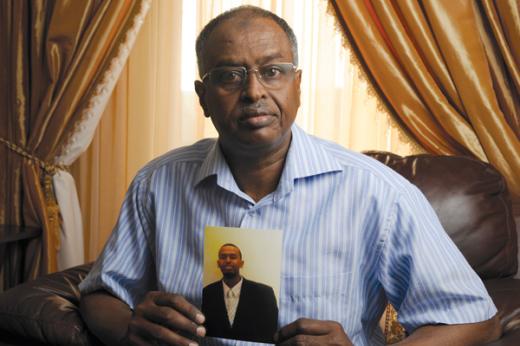 Mohamed Aden holds a photo of his son, Abas Abukar, killed in Edmonton in 2008. Photo by Tony Bock/GetStock.com
This article was written by by Andrew Livingstone, an award-winning journalist based in Toronto.Source: http://www.ucobserver.org/
Mohamed Aden holds a photo of his son, Abas Abukar, killed in Edmonton in 2008. Photo by Tony Bock/GetStock.com
This article was written by by Andrew Livingstone, an award-winning journalist based in Toronto.Source: http://www.ucobserver.org/
http://www.somaliaonline.com/broken-dreams-in-little-mogadishu-as-somali-community-continues-to-struggle-in-canada/ -
Many in the Somali diaspora are returning home to make a new life despite the continuing risks. Since 2011 when a military campaign against Al-Shabab militants began making progress, members of the diaspora community have come back to open hospitals, schools, hotels, restaurants and other businesses. The owner of a chain of hotels and restaurants who is helping to bring change to the once-deadly Somali capital.Along the Somali coastline sits the Jazeera Beach Hotel, one of the finest beach resorts in Mogadishu.It is part of The Village hotel and restaurant chain, owned by Ahmed Jama. Originally from Britain, many in Somalia now refer to him as Ahmed Village because of his thriving businesses. A chef by profession, Ahmed enjoys cooking for his ever-increasing customers.He recalls the risks he took coming back to invest in a country once regarded as a failed state.“When I left my restaurant business in London, everyone was surprised. When I opened up a hotel at Jazeera beach everyone was also surprised. But now it’s evident that all who followed my lead and invested back home have changed the narrative. And we look forward to more developments for Somalia in the near future," said Jama.With Somalia's thriving fishing industry, Ahmed’s clientele are assured of a good meal at any of his chain of hotels across the capital.A major source of employment, Ahmed has hired scores of Somalis to work at his establishments.“In this restaurant alone, I have 58 employees. At least 20 others work at my other restaurant in Hawa Tako. I have employed more than 100 people in Mogadishu alone. I have opened up a beach restaurant in Hobyo that has more than 20 employees. This is something I hope to expand all across the country if security prevails," he said.
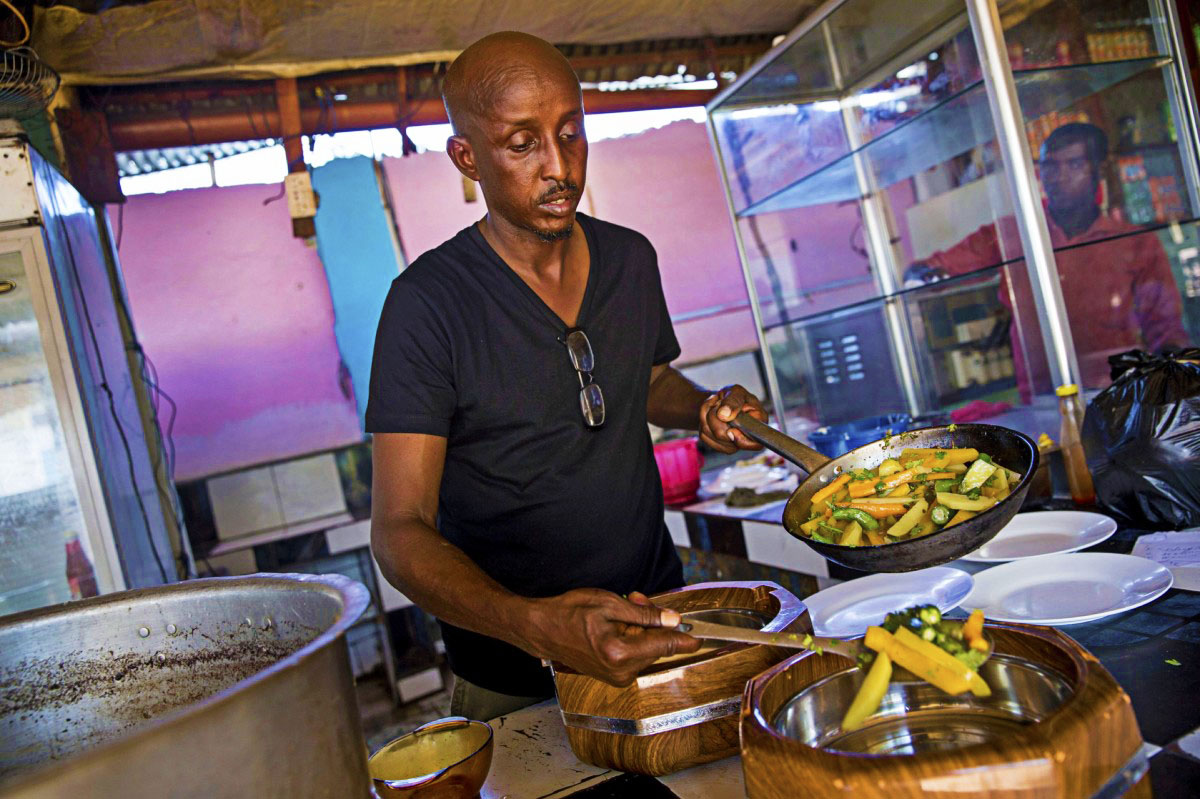 Ahmed’s restaurants in Mogadishu have been attacked numerous times by extremists. But this has not deterred Ahmed, who instead urges other Somalis in the Diaspora to return home.“It is human beings who create both conflict and peace. So as to develop Somalia, we shouldn't be afraid. It's wise if we come back and invest here instead of elsewhere. Those you offer employment opportunities to will help in creating peace and stability. The instability and challenges will come to an end one day, so it is best we stay and invest here," said Jama.In 2013, the Somali government launched the Office for the Diaspora Affairs. The agency has been holding a series of conferences with Somalis across the globe in a bid to increase their involvement with the East African nation.Ahmed Jama’s case is an example of the brave hearts who have returned to Somalia and are slowly changing a nation that was once mired in anarchy, but is now slowly settling down, and reviving.Source: http://www.voanews.com
Ahmed’s restaurants in Mogadishu have been attacked numerous times by extremists. But this has not deterred Ahmed, who instead urges other Somalis in the Diaspora to return home.“It is human beings who create both conflict and peace. So as to develop Somalia, we shouldn't be afraid. It's wise if we come back and invest here instead of elsewhere. Those you offer employment opportunities to will help in creating peace and stability. The instability and challenges will come to an end one day, so it is best we stay and invest here," said Jama.In 2013, the Somali government launched the Office for the Diaspora Affairs. The agency has been holding a series of conferences with Somalis across the globe in a bid to increase their involvement with the East African nation.Ahmed Jama’s case is an example of the brave hearts who have returned to Somalia and are slowly changing a nation that was once mired in anarchy, but is now slowly settling down, and reviving.Source: http://www.voanews.com -
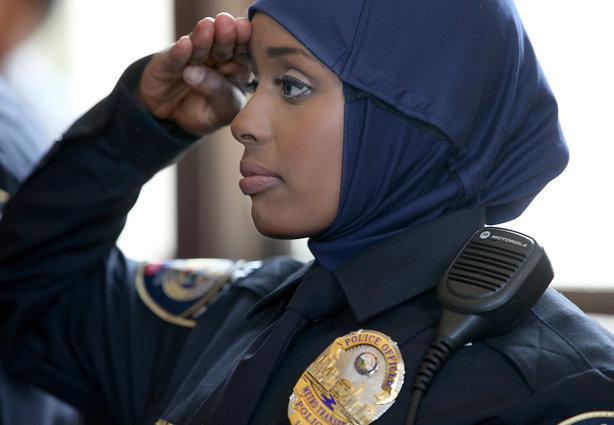 Kadra Mohamed, one of the 12 Metro Transit officers sworn in on Thursday in St. Paul, saluted the U.S. flag as she officially became a police officer.A diverse class of 12 full-time Metro Transit Police Department officers was sworn in Thursday at the Union Depot in St. Paul, including the state’s first female Somali-American officer.Officer Kadra Mohamed and her classmates will join a force of more than 200 full- and part-time police officers who work in the transit system, which includes both light rail and buses.The recruits “truly represent, in many ways, all of the diversity of the Twin Cities area,” said Metro Transit Police Chief John Harrington, adding that the class includes officers who speak two or even three languages. “It really does mean that when we have a passenger whose primary language is Spanish, or Somali, or Hmong or Arabic, we can now directly communicate with them.”Many of the city’s newest immigrant residents are regular users of public transportation, Harrington said. Having Mohamed on the force will not only help ease communication barriers, but also help female Somali-American customers who might not feel comfortable talking to a male officer because of religious or cultural taboos.“Both culturally and linguistically, Ms. Mohamed really does give us some great opportunities to make sure we are serving all of the transit-riding public,” Harrington said.The other officers sworn in Thursday were Michael Affeldt, Joseph Carchedi, Benjamin Ellringer, Haissan Hussein, James Menter, Christopher Miles, Juan Peralta, Garrin Silbernagel, Dmitriy Vecherkov, Richard Wegner and Meng Yang.Source: http://www.startribune.com
Kadra Mohamed, one of the 12 Metro Transit officers sworn in on Thursday in St. Paul, saluted the U.S. flag as she officially became a police officer.A diverse class of 12 full-time Metro Transit Police Department officers was sworn in Thursday at the Union Depot in St. Paul, including the state’s first female Somali-American officer.Officer Kadra Mohamed and her classmates will join a force of more than 200 full- and part-time police officers who work in the transit system, which includes both light rail and buses.The recruits “truly represent, in many ways, all of the diversity of the Twin Cities area,” said Metro Transit Police Chief John Harrington, adding that the class includes officers who speak two or even three languages. “It really does mean that when we have a passenger whose primary language is Spanish, or Somali, or Hmong or Arabic, we can now directly communicate with them.”Many of the city’s newest immigrant residents are regular users of public transportation, Harrington said. Having Mohamed on the force will not only help ease communication barriers, but also help female Somali-American customers who might not feel comfortable talking to a male officer because of religious or cultural taboos.“Both culturally and linguistically, Ms. Mohamed really does give us some great opportunities to make sure we are serving all of the transit-riding public,” Harrington said.The other officers sworn in Thursday were Michael Affeldt, Joseph Carchedi, Benjamin Ellringer, Haissan Hussein, James Menter, Christopher Miles, Juan Peralta, Garrin Silbernagel, Dmitriy Vecherkov, Richard Wegner and Meng Yang.Source: http://www.startribune.com -
Somalia's Shebab militants are divided over whether to maintain their allegiance to Al-Qaeda or shift to Islamic State, according to militant and security sources, analysts and clan elders.
The division comes at a time when Islamic State in Iraq and Syria has become the jihadist franchise of choice, attracting fighters from abroad and other militant groups such as Boko Haram in Nigeria, while Al-Qaeda too has recently expanded its territory in Yemen.
"Why is it a surprise to hear that Shebab may join the Islamic State? All Muslims have to unite against their enemy," said a Shebab commander, speaking to AFP on condition of anonymity.
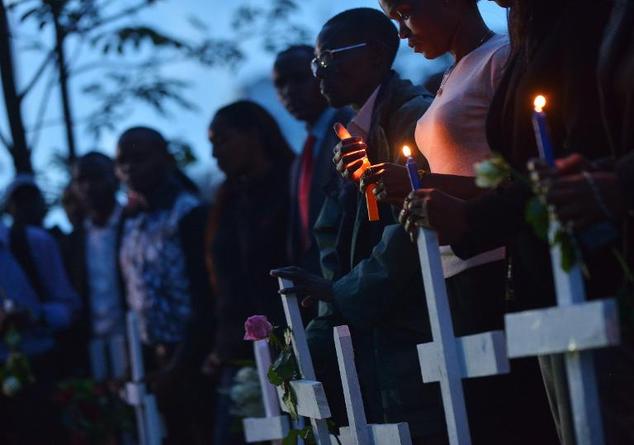
A vigil in Nairobi on April 7, 2015 to remember victims of an armed assault on a university in Garissa, Kenya, claimed by Somalia's Al-Qaeda-linked Shebab insurgents ©Tony Karumba (AFP/File)
The commander said Shebab "would be more than happy to join forces to strike the enemy of Islam harder".
The admission comes at a time when Shebab is under pressure militarily but remains able to launch guerilla and terror attacks, seemingly at will, against civilian targets in Somalia and Kenya.
This month Shebab killed 148 people, mostly students, during an armed assault on a university in Garissa, northeastern Kenya, while suicide bombers and gunmen have attacked hotels and a restaurant in Mogadishu and a United Nations minibus in the northern Somali town of Garowe.
Garissa echoed the 2013 Westgate Mall attack in Nairobi, with just four gunmen and multiple accounts of the singling out of non-Muslims for murder, a tactic also used in Shebab attacks on a bus and quarry in Mandera, Kenya, late last year.
But Garissa was both Shebab's most deadly and most brutal attack yet. The gunmen herded scores of young non-Muslim men and women into a university hall of residence. They were made to lie side-by-side on the courtyard floor and executed.
It was an assault worthy in its thirst for blood of IS, which has distinguished itself through mass executions, many of which are recorded and distributed online.
- 'Corridor to Afghanistan' -
Some see Shebab's vacillations as a sign of weakness.
"Shebab is desperate. They have lost ground in Somalia, they may be considering joining the so-called Islamic State in Iraq and Syria so that they get funds and moral support," said Mohamed Ibrahim, a Somali security official.
But others suggest Shebab is still considered a valuable partner in jihad.
"There's a debate going on between the core leaders whether to switch to IS, whether to stay with Al-Qaeda," Somalia's prime minister Omar Abdirashid Ali Sharmarke told AFP.
"Both ISIS and Al-Qaeda are appealing to Shebab to join them," he said.
Sharmarke said that recent territorial gains in Yemen by Al-Qaeda in the Arabian Peninsula (AQAP), the strongest of Al-Qaeda's franchises, might embolden and strengthen Shebab.
"It's really crucial now because this can spill over from the Yemen conflict and easily come to Somalia," he said. "The Gulf of Aden can become a corridor to Afghanistan and Pakistan."
Sources in southern Somalia, where Shebab fighters and commanders are now concentrated, confirmed that meetings have taken place to discuss the IS/AQ issue.
"We have heard about a meeting by Shebab senior leaders," said Hassan Nure, an elder in Lower Shabelle region. "They haven't agreed anything so far, some of them are still very reluctant because they want to maintain relations with Al-Qaeda."
"The dispute in Shebab over whether to remain loyal to Al-Qaeda or align instead with IS is very real," says Tres Thomas, a Washington-based Somali expert and manager of the respected Somalia Newsroom blog.
- Financial benefits -
Analysts say Shebab leader Ahmed Diriye, also known as Ahmed Umar Abu Ubaidah, is an Al-Qaeda loyalist, while the powerful secret police chief, Mahad Karate, is the most senior proponent of a shift to IS.
A shift to IS might bring financial benefits. "If Shebab were to align with IS it would mean an increase in money and resources that AQ cannot provide at the moment," said a Western security source.
It might also provide a political boost and a propaganda coup.
"In some ways you inherit the strength of the group to whom you pledge allegiance," said Roland Marchal, a terrorism expert and senior research fellow at the National Centre for Scientific Research (CNRS) in Paris.
But for Marchal, the long and strong links between Shebab and AQAP would make switching allegiance a financial and political wrench, as well as a tricky decision.
"The Shebab leadership remains closely linked to AQAP and it's hard to believe that they would switch to IS just like that."
And the extent of internal Shebab support for a move is not known.
"It is unclear how big and influential the pro-IS faction is and whether it would be able to shift broader opinion in Shebab, outside of a number of foreign fighters who are also behind an IS alliance," said Thomas.
In any case, a simple shift of allegiance may do little to increase Shebab's appeal to potential recruits.
"While Shebab would like to see jihadists, particularly those of Somali descent, come to Somalia instead of Syria and Iraq, an alliance with IS would not change the fact that Shebab's dwindling territorial control and urban attacks against civilians are still a major disincentive for recruits."
-
Cardiff full council meeting: Pontcanna / Somaliland
Members of the Somali community in Cardiff have criticised a motion by Cardiff Council to recognise Somaliland as a sovereign state.
The council passed a motion in March to call on the UK Government and Welsh Government to recognise the region as an independent state. However, some groups of expatriates have spoken out against the council’s motion which they claim could threaten cohesion between Somalian communities.
'Interfering in Somali politics'
Said Dualeh, from Cardiff Bay, originated from northern Somalia and believes Cardiff Council are interfering in politics they “don’t understand”.
He said: “We were expecting Cardiff Council to be doing the jobs we have elected them to do which is to work for the local Somalian people in Cardiff, regardless of where they come from in Somalia.
“It’s a motion which is interfering in Somali politics to the detriment of Somali people in Cardiff, which is disappointing to say the least.
“They’re affecting harmony amongst Somali people in this country.”
Somaliland is a self-declared independent state stemming from the British Empire.
Internationally it is recognised as an autonomous part of Somalia.
'Outrageous'
Cardiff is the second local authority in the UK to recognise the Republic of Somaliland, after a decision by Sheffield Council.
Following the motion being passed by the council, members of the Somaliland community celebrated outside City Hall with dancing and cheering.
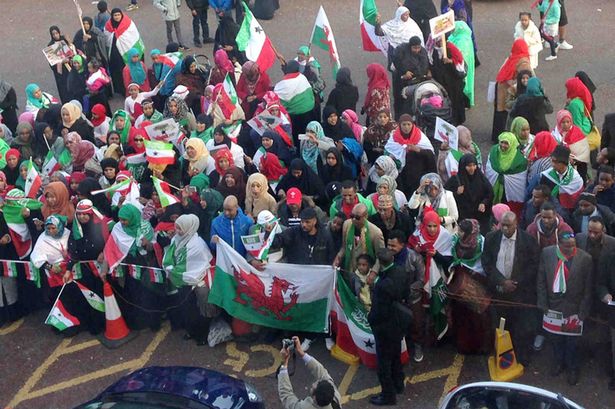 Cardiff full council meeting: Pontcanna / Somaliland
Cardiff full council meeting: Pontcanna / SomalilandAnother member of the Somalian community, who wished to remain anonymous said: “The motion is outrageous, if a small council in Somalia wanted to recognise Scotland as an independent state it would not be a friendly action towards the UK, and we view this in a similar way. “The Somali community in Cardiff has many problems because of huge cuts, youth centres are being shut down and university is becoming inaccessible because of inequality. “Councillors are supposed to be addressing issues like these.”
'One small step at a time'
Labour councillor Lynda Thorne, who proposed the motion, said she understood the differences in opinion but her reason for supporting the motion went back a long way.
She said: “A cross-party group visited Somaliland eight years ago and came up with a report which praised Somaliland and those who had introduced democracy in the country.
“The motion was on the basis of sustaining democracy and in terms of helping Somaliland be recognised by the United Nations and to bring more investment, jobs, and prosperity there and to the rest of Somalia.
“I don’t think we’re meddling, it’s about providing support to a large community in Cardiff.
“It could be said as a council we have no power to recognise Somaliland but we’re trying to help that community get support from the United Nations and the UK Government, one small step at a time.”
Source: http://www.walesonline.co.uk/
-
For the best part of the last three years I’ve been visiting, working and living in the Somali capital, Mogadishu. During that time a lot has changed. Security has improved thanks to al-Shabab retreating from the city. Mogadishu feels like it is finally being resuscitated from the bloody two-decade long civil war-induced coma. Residents are flocking to the white sandy beaches on the edge of the city to pass time and enjoy things they couldn’t afford to because of the war.
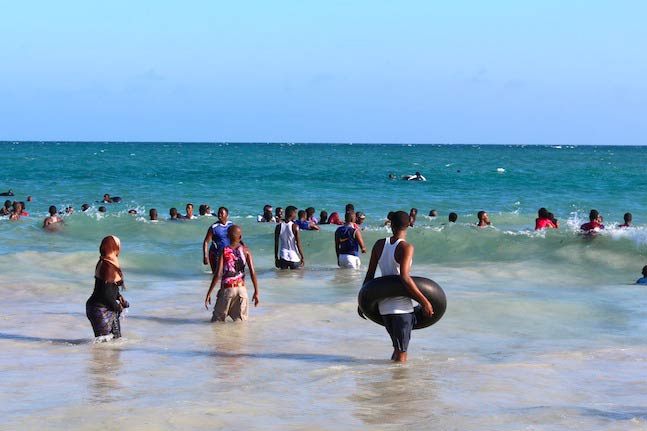 Liido Beach, where the ‘cool’ diasporan men go to mingle with the ladies. (Pic: Hamza Mohamed)There is also a new crowd calling this seaside city of one million people home. Somalis are returning from all corners of the globe – some moving back for good, others to seek business opportunities. As a result of this new addition to the city’s residents, rent is sky-high and competition between diasporans and locals for the few government jobs available is becoming cut throat.Depending on the countries the diasporans are returning from, they bring with them distinct behaviours and ways alien to Mogadishu.Somali-Brits – the serial title collectorsThey make up the majority of diasporans, and they love titles more than anything. Ask for the business card of a Somali-Brit in Mogadishu – before their name you’ll find at least three titles. Mohamed, a forklift driver from the rundown area of Harlesden in London, will be Pilot, Professor, Doctor, Diplomat Mohamed. Only Somali-Brits can fit so many titles on such small cards.Titles are not the only thing they love, though. They are also seasoned penny pinchers. They dislike tipping more than they dislike Somalia’s notorious checkpoints, and spend many minutes negotiating the price of a US $5 meal. They are experts in Qudbosiro (secret marriages). The only time Somali-Brits are happy to part with cash is when they’re paying the dowry for a secret second wife. They have a habit of bribing the local Qaadis (men who conduct weddings) so that they don’t alert the first wife back in the UK.The Americans – the Tea Party typeThis bunch is loud, big and in clothes at least two sizes bigger than your usual Somali. From their dress sense it is difficult to tell whether they came from Dadaab or Denver. Some dress in FUBU and Karl Kani labels. Unlike the Brits they will tip – only $1 dollar – and then proudly tell the whole city about their ‘generous’ deed. Because they are used to American food portions, they endlessly complain about the ‘small’ portions in local restaurants.The Tea Party types obsessively boast about the small achievements they accomplished in American cities that the average Somali person will find impossible to find on a map – like the time they graduated from a beginner’s English language course ten years ago.They are experts in local clan politics thanks to the liberal number of years they spent out of work and in tea shops in Minneapolis. They are Somalia’ tea party – their views and loyalty to their clans trumps everything.They usually visit Somalia in large numbers after they have received their tax returns – the only time they can afford economy class tickets from Minneapolis to Mogadishu.Every second sentence usually starts with, “I’m American, and you know in America…”Despite their views corresponding with the Republican Party, they claim to vote for the Democratic Party.The Canadians – Team Yolo (You Only Live Once)They are ciyaalka xafada (the cool kids on the block) and mooryans (gangsters) in the making. They are everyone’s friends. This group treats life as a party and Somalia as a dance floor. They usually arrive with few things – like a minor criminal record and a Mongolian scripture tattoo they got while under the influence on a night out in Toronto. It’s hard to find them talking about serious issues. Don’t mention school – they have usually dropped out of school and are sensitive discussing this subject. If you want them to unfriend you on Facebook, tag them in photos from your graduation ceremony.They often blame the Canadian ‘system’ for their failure in school, and regularly point to Mark Zuckerberg and Steve Jobs as examples of people who succeeded in life without completing school. Team Yolo’s favourite topic of conversation is binge-drinking in Nairobi. They’re the company to keep on a weekend when anything Halaal is not on the list.The Scandinavians – Catwalk crewUnlike their American counterparts, they don’t have weight issues and dress in body-hugging J Lindeberg T-shirts and slim-fit Jack & Jones jeans. They lack the social skills of the Canadians and have a dry sense of humour. They are the quietest of the diasporans because they speak a language no Somali in Somalia understands. Locals say the Somali-Scandinavians speak af shimbir (birds’ language).Due to their poor grasp of the English language they often lose out to local university graduates for the few international NGO jobs in the market. Because they’re linguistically challenged, they are often found sitting alone in the corners of restaurants or in meetings, and making hand signals no one understands. The Scandinavians are obsessed with their looks and clothes. They can be heard complaining about how Mogadishu’s hard water is ruining their Afro or hair colour. Thanks to the long hours they spend in front of the mirror, they are easy on the eye and take likable selfies on Instagram.The Karachi crew – the shipwrecksThis group is not considered fully diasporans nor fully local. They consist mainly of Somalis who attempted to get to Europe but weren’t lucky and ended up studying on the Indian subcontinent.They are extremely good at lecturing others on things they know little of. They are experts on all matters mysterious, like where to find water if you end up on the moon – not that many Somalis will end up on the moon.Local girls call them Kumel gar (the temporary ones) until the real diasporans turn up.Their business cards usually say advisor, consultant, analyst or researcher for a diasporan taxi-driver-turned-minister or a foreign NGO.To look cool and diasporan, they’re often found coughing on shisha or, if they’re in Nairobi, with an empty Tusker bottle – the local beer.A Karachi crew member’s Facebook profile is filled with photos they took with other diasporans in Europe and America. They harass diasporans coming from the US for Starbucks coffee sachets.They speak English with a heavy Indian accent but they believe they sound American. They have diplomatic passports issued under a president Somalis have long forgotten about.A changing SomaliaThese five groups aren’t the only ones who have moved back but they are the ones who stand out the most. The city is the liveliest it has been in more than 23 years. Locals have welcomed their long-lost countrymen with open arms, despite finding their new habits odd and funny at times.With peace holding and at least five international flights landing in Mogadishu every day, it’s just a matter of time before the Somali-Aussies arrive from the end of the world. And with new shisha parlours popping up everywhere, I bet the Somalis in the Gulf are packing their bags too. The banana-flavoured shisha here is really good.
Liido Beach, where the ‘cool’ diasporan men go to mingle with the ladies. (Pic: Hamza Mohamed)There is also a new crowd calling this seaside city of one million people home. Somalis are returning from all corners of the globe – some moving back for good, others to seek business opportunities. As a result of this new addition to the city’s residents, rent is sky-high and competition between diasporans and locals for the few government jobs available is becoming cut throat.Depending on the countries the diasporans are returning from, they bring with them distinct behaviours and ways alien to Mogadishu.Somali-Brits – the serial title collectorsThey make up the majority of diasporans, and they love titles more than anything. Ask for the business card of a Somali-Brit in Mogadishu – before their name you’ll find at least three titles. Mohamed, a forklift driver from the rundown area of Harlesden in London, will be Pilot, Professor, Doctor, Diplomat Mohamed. Only Somali-Brits can fit so many titles on such small cards.Titles are not the only thing they love, though. They are also seasoned penny pinchers. They dislike tipping more than they dislike Somalia’s notorious checkpoints, and spend many minutes negotiating the price of a US $5 meal. They are experts in Qudbosiro (secret marriages). The only time Somali-Brits are happy to part with cash is when they’re paying the dowry for a secret second wife. They have a habit of bribing the local Qaadis (men who conduct weddings) so that they don’t alert the first wife back in the UK.The Americans – the Tea Party typeThis bunch is loud, big and in clothes at least two sizes bigger than your usual Somali. From their dress sense it is difficult to tell whether they came from Dadaab or Denver. Some dress in FUBU and Karl Kani labels. Unlike the Brits they will tip – only $1 dollar – and then proudly tell the whole city about their ‘generous’ deed. Because they are used to American food portions, they endlessly complain about the ‘small’ portions in local restaurants.The Tea Party types obsessively boast about the small achievements they accomplished in American cities that the average Somali person will find impossible to find on a map – like the time they graduated from a beginner’s English language course ten years ago.They are experts in local clan politics thanks to the liberal number of years they spent out of work and in tea shops in Minneapolis. They are Somalia’ tea party – their views and loyalty to their clans trumps everything.They usually visit Somalia in large numbers after they have received their tax returns – the only time they can afford economy class tickets from Minneapolis to Mogadishu.Every second sentence usually starts with, “I’m American, and you know in America…”Despite their views corresponding with the Republican Party, they claim to vote for the Democratic Party.The Canadians – Team Yolo (You Only Live Once)They are ciyaalka xafada (the cool kids on the block) and mooryans (gangsters) in the making. They are everyone’s friends. This group treats life as a party and Somalia as a dance floor. They usually arrive with few things – like a minor criminal record and a Mongolian scripture tattoo they got while under the influence on a night out in Toronto. It’s hard to find them talking about serious issues. Don’t mention school – they have usually dropped out of school and are sensitive discussing this subject. If you want them to unfriend you on Facebook, tag them in photos from your graduation ceremony.They often blame the Canadian ‘system’ for their failure in school, and regularly point to Mark Zuckerberg and Steve Jobs as examples of people who succeeded in life without completing school. Team Yolo’s favourite topic of conversation is binge-drinking in Nairobi. They’re the company to keep on a weekend when anything Halaal is not on the list.The Scandinavians – Catwalk crewUnlike their American counterparts, they don’t have weight issues and dress in body-hugging J Lindeberg T-shirts and slim-fit Jack & Jones jeans. They lack the social skills of the Canadians and have a dry sense of humour. They are the quietest of the diasporans because they speak a language no Somali in Somalia understands. Locals say the Somali-Scandinavians speak af shimbir (birds’ language).Due to their poor grasp of the English language they often lose out to local university graduates for the few international NGO jobs in the market. Because they’re linguistically challenged, they are often found sitting alone in the corners of restaurants or in meetings, and making hand signals no one understands. The Scandinavians are obsessed with their looks and clothes. They can be heard complaining about how Mogadishu’s hard water is ruining their Afro or hair colour. Thanks to the long hours they spend in front of the mirror, they are easy on the eye and take likable selfies on Instagram.The Karachi crew – the shipwrecksThis group is not considered fully diasporans nor fully local. They consist mainly of Somalis who attempted to get to Europe but weren’t lucky and ended up studying on the Indian subcontinent.They are extremely good at lecturing others on things they know little of. They are experts on all matters mysterious, like where to find water if you end up on the moon – not that many Somalis will end up on the moon.Local girls call them Kumel gar (the temporary ones) until the real diasporans turn up.Their business cards usually say advisor, consultant, analyst or researcher for a diasporan taxi-driver-turned-minister or a foreign NGO.To look cool and diasporan, they’re often found coughing on shisha or, if they’re in Nairobi, with an empty Tusker bottle – the local beer.A Karachi crew member’s Facebook profile is filled with photos they took with other diasporans in Europe and America. They harass diasporans coming from the US for Starbucks coffee sachets.They speak English with a heavy Indian accent but they believe they sound American. They have diplomatic passports issued under a president Somalis have long forgotten about.A changing SomaliaThese five groups aren’t the only ones who have moved back but they are the ones who stand out the most. The city is the liveliest it has been in more than 23 years. Locals have welcomed their long-lost countrymen with open arms, despite finding their new habits odd and funny at times.With peace holding and at least five international flights landing in Mogadishu every day, it’s just a matter of time before the Somali-Aussies arrive from the end of the world. And with new shisha parlours popping up everywhere, I bet the Somalis in the Gulf are packing their bags too. The banana-flavoured shisha here is really good.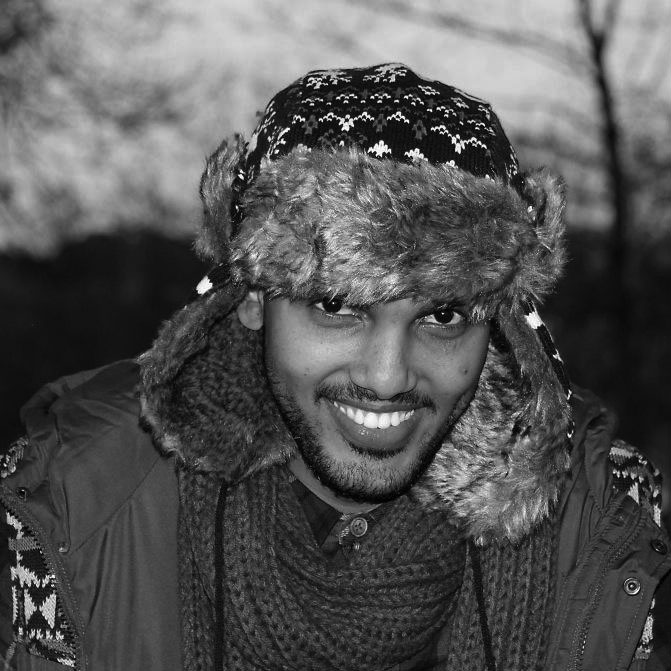 Hamza Mohamed is a journalist at Al Jazeera. Follow him on Twitter: @Hamza_Africa
Hamza Mohamed is a journalist at Al Jazeera. Follow him on Twitter: @Hamza_Africa http://www.somaliaonline.com/return-of-the-quirky-somali-diasporans-by-hamza-mohamed/
-
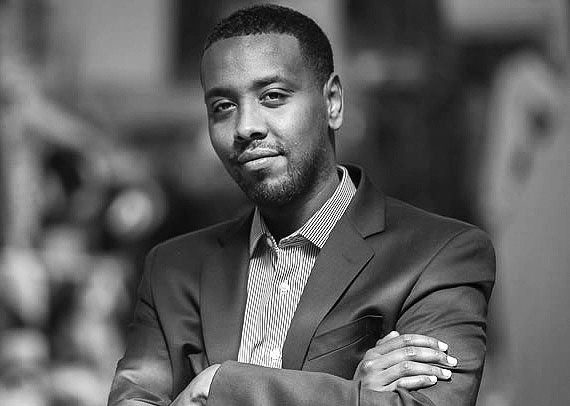 Recent days have been trying for all of us in Minnesota. We have heard stories about terror recruitment problems and the arrests of six young men who were attempting to leave the country. We have seen the grief-stricken faces of mothers on news broadcasts and on the cover of our major newspapers. On April 24 as I read the Star Tribune’s Opinion Exchange page, I came face to face with words of hatred. Former U.S. Sen. Norm Coleman’s direct statement that Somalis in Minnesota constitute a “land of 10,000 terrorists” was fear-mongering of the worst sort.Let’s start with the facts: Six young men with connections to our state were arrested and prevented from traveling to a very dangerous and unsettled part of the world. Apparently, these young men were enticed to join violent extremists in a fight based on a perverted sense of radical views. Actions like these are crimes against our country and must be punished according to our laws. But how Coleman conflates the actions of six young men to tens of thousands of Minnesotans is beyond any form of rational mathematical reasoning.Despite his intentions, I understand that, as a politician, Coleman — who is also a former St. Paul mayor — was extremely adroit at exacerbating racial divisions and at playing the fear card, especially at election time. But his implication in the April 24 article that there are 10,000 terrorists among us was racist, alarmist and just plain false.Let me assure the Star Tribune readers that there are not 10,000 terrorists among us. More than 100,000 Somalis and East Africans call Minnesota home. Nearly all of these people are citizens of the United States. For more than 20 years, East Africans have found new homes in this great state. We’ve integrated, have contributed to the economy, have educated our children here, and have tried to create a better future for our families and our fellow Minnesotans and countrymen. We work every day in some the most challenging and lowest-paid jobs in transportation, health care and building maintenance. We do so because we want desperately to be part of the American dream. We are proud, loyal and dedicated Minnesotans and Americans.But you wouldn’t know that to read Coleman’s words.Second, Coleman is transparently political. Not long ago, one of his former fellow mayors, Rudy Giuliani of New York, said that President Obama didn’t love America. It was a coldly and cynically calculated act on Giuliani’s part. He knew exactly what he was doing. Coleman is cynically playing the same trick here — making an outrageous suggestion, knowing full well it is a lie, then sitting back and knowing that he’s accomplished the smear in the public’s mind.Coleman’s call to wake up the governor, the Minnesota Legislature and civic leaders on the need to act is just his cover up for the libel he perpetrated. Obama and U.S. Attorney Andy Luger began working on this issue months ago when a major summit from around the world was held in Washington. The Star Tribune covered that event with a front-page story in February. I and many others have been working with federal, state, county and city officials, as well as those from private companies and foundations, to bring hope, education and meaningful job opportunities to East African youths in our city. One of the biggest things we can do is to not bring the racist stereotypes.The difference is that the people of goodwill and good faith who have and are needed to work on this problem have not and will not use the hateful, divisive and downright evil tactics that Coleman used in his “Land of 10,000 Terrorist” screed.There is serious work to do in education, employment, housing, transportation, recreation and health care. But there is also a lot of work to do in getting the issues framed correctly and put into perspective. Coleman failed the most basic test in understanding what needs to be done.
Recent days have been trying for all of us in Minnesota. We have heard stories about terror recruitment problems and the arrests of six young men who were attempting to leave the country. We have seen the grief-stricken faces of mothers on news broadcasts and on the cover of our major newspapers. On April 24 as I read the Star Tribune’s Opinion Exchange page, I came face to face with words of hatred. Former U.S. Sen. Norm Coleman’s direct statement that Somalis in Minnesota constitute a “land of 10,000 terrorists” was fear-mongering of the worst sort.Let’s start with the facts: Six young men with connections to our state were arrested and prevented from traveling to a very dangerous and unsettled part of the world. Apparently, these young men were enticed to join violent extremists in a fight based on a perverted sense of radical views. Actions like these are crimes against our country and must be punished according to our laws. But how Coleman conflates the actions of six young men to tens of thousands of Minnesotans is beyond any form of rational mathematical reasoning.Despite his intentions, I understand that, as a politician, Coleman — who is also a former St. Paul mayor — was extremely adroit at exacerbating racial divisions and at playing the fear card, especially at election time. But his implication in the April 24 article that there are 10,000 terrorists among us was racist, alarmist and just plain false.Let me assure the Star Tribune readers that there are not 10,000 terrorists among us. More than 100,000 Somalis and East Africans call Minnesota home. Nearly all of these people are citizens of the United States. For more than 20 years, East Africans have found new homes in this great state. We’ve integrated, have contributed to the economy, have educated our children here, and have tried to create a better future for our families and our fellow Minnesotans and countrymen. We work every day in some the most challenging and lowest-paid jobs in transportation, health care and building maintenance. We do so because we want desperately to be part of the American dream. We are proud, loyal and dedicated Minnesotans and Americans.But you wouldn’t know that to read Coleman’s words.Second, Coleman is transparently political. Not long ago, one of his former fellow mayors, Rudy Giuliani of New York, said that President Obama didn’t love America. It was a coldly and cynically calculated act on Giuliani’s part. He knew exactly what he was doing. Coleman is cynically playing the same trick here — making an outrageous suggestion, knowing full well it is a lie, then sitting back and knowing that he’s accomplished the smear in the public’s mind.Coleman’s call to wake up the governor, the Minnesota Legislature and civic leaders on the need to act is just his cover up for the libel he perpetrated. Obama and U.S. Attorney Andy Luger began working on this issue months ago when a major summit from around the world was held in Washington. The Star Tribune covered that event with a front-page story in February. I and many others have been working with federal, state, county and city officials, as well as those from private companies and foundations, to bring hope, education and meaningful job opportunities to East African youths in our city. One of the biggest things we can do is to not bring the racist stereotypes.The difference is that the people of goodwill and good faith who have and are needed to work on this problem have not and will not use the hateful, divisive and downright evil tactics that Coleman used in his “Land of 10,000 Terrorist” screed.There is serious work to do in education, employment, housing, transportation, recreation and health care. But there is also a lot of work to do in getting the issues framed correctly and put into perspective. Coleman failed the most basic test in understanding what needs to be done. Abdi Warsame is a member of the Minneapolis City Council, representing the Sixth Ward. He is a member of the Democratic–Farmer–Labor Party in Minneapolis, Minnesota. In 2013, he was elected to the Minneapolis City Council, becoming the first Somali American to be elected the position.
Abdi Warsame is a member of the Minneapolis City Council, representing the Sixth Ward. He is a member of the Democratic–Farmer–Labor Party in Minneapolis, Minnesota. In 2013, he was elected to the Minneapolis City Council, becoming the first Somali American to be elected the position. -
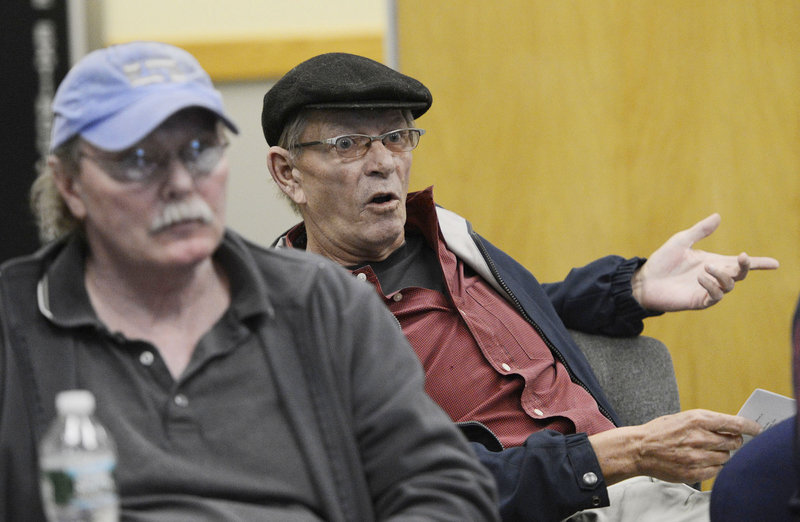 PORTLAND, Maine — A local taxi cab driver is now suing the city of Portland in federal court because he contends the city’s system of permitting cabs is discriminatory against him and other white drivers.Paul McDonough’s lawsuit, which was moved from Superior Court to U.S. District Court late last week, argues the city violated the state’s Human Rights Act by perpetuating a system in which only Somali and Iranian taxi drivers can secure potentially lucrative permits to serve airport passengers.“I’m sure there are people in the community who would say Paul’s lawsuit is politically undesirable,” said McDonough’s attorney, David Turesky. “The problem is, we also have a Constitution, and you can’t discriminate.”The city has argued that its system for distributing the permits was not based on the applicants’ nationalities or races, and that it was purely “happenstance” that no whites were in positions to receive them.The Maine Human Rights Commission dismissed McDonough’s complaint last year “due to lack of reasonable grounds to believe that unlawful discrimination had occurred,” city attorneys wrote in a court filing.Only drivers with so-called “non-reserved” jetport permits are allowed to service the Portland International Jetport without prearranged reservations. In 2013, the city reduced the number of those permits from 50 to 45 and implemented a lottery system among existing permit holders to determine who would receive the coveted slots.Those drivers — all of whom are either Somali or Iranian, McDonough argues — have then since been grandfathered into the system, leaving no room for McDonough or any other new drivers to apply.McDonough, a South Portland resident, alleges in his lawsuit that he sought to enter the lottery for one of the 45 permits in 2013, but wasn’t allowed because he didn’t have an existing permit at the time.“They have a closed system — they closed it, and they closed it after they created a discriminatory system,” Turesky said. “The system on its base has a disparate impact by not allowing any white folks to get in.”Portland city officials did not immediately respond to a request for comment Tuesday, but in previous Superior Court filings, city attorneys denied any allegations of discrimination based on race or nationality.Preti Flaherty attorney Sigmund Schutz is representing the Airport Taxi Group, a coalition of current non-reserved jetport permit holders. His group filed a motion to intervene in the case at the Superior Court level, and argued McDonough failed to prove the city used race or nationality as a criteria in determining who could get the non-reserved permits.“[McDonough] alleges that all of the current non-reserved airport access permit holders are Somali or Iranian, but does not allege that any of the non-reserved permits were originally granted to any of the current permit holders because of their color, race, ethnicity, or any other protected characteristic,” Schutz wrote in a previous Superior Court filing.Schutz also argued the city’s tax permitting system does not fall under the definition of a “public accommodation” as protected under the Maine Human Rights Act.McDonough’s lawsuit is not the first time the city’s airport taxi permitting has come under legal fire.In 2011, it was Schutz and a group of Somali immigrant taxi drivers seeking a court order to prevent the city from implementing a policy change blocking their local representatives from using power of attorney privileges to renew permits.Schutz argued at the time the policy change, which was later rescinded by the city, would have forced immigrant drivers to reapply for their annual permits in person, creating a hardship on those who frequently left the country to tend to family matters and left their permitting affairs in the hands of local attorneysSource: https://bangordailynews.com
PORTLAND, Maine — A local taxi cab driver is now suing the city of Portland in federal court because he contends the city’s system of permitting cabs is discriminatory against him and other white drivers.Paul McDonough’s lawsuit, which was moved from Superior Court to U.S. District Court late last week, argues the city violated the state’s Human Rights Act by perpetuating a system in which only Somali and Iranian taxi drivers can secure potentially lucrative permits to serve airport passengers.“I’m sure there are people in the community who would say Paul’s lawsuit is politically undesirable,” said McDonough’s attorney, David Turesky. “The problem is, we also have a Constitution, and you can’t discriminate.”The city has argued that its system for distributing the permits was not based on the applicants’ nationalities or races, and that it was purely “happenstance” that no whites were in positions to receive them.The Maine Human Rights Commission dismissed McDonough’s complaint last year “due to lack of reasonable grounds to believe that unlawful discrimination had occurred,” city attorneys wrote in a court filing.Only drivers with so-called “non-reserved” jetport permits are allowed to service the Portland International Jetport without prearranged reservations. In 2013, the city reduced the number of those permits from 50 to 45 and implemented a lottery system among existing permit holders to determine who would receive the coveted slots.Those drivers — all of whom are either Somali or Iranian, McDonough argues — have then since been grandfathered into the system, leaving no room for McDonough or any other new drivers to apply.McDonough, a South Portland resident, alleges in his lawsuit that he sought to enter the lottery for one of the 45 permits in 2013, but wasn’t allowed because he didn’t have an existing permit at the time.“They have a closed system — they closed it, and they closed it after they created a discriminatory system,” Turesky said. “The system on its base has a disparate impact by not allowing any white folks to get in.”Portland city officials did not immediately respond to a request for comment Tuesday, but in previous Superior Court filings, city attorneys denied any allegations of discrimination based on race or nationality.Preti Flaherty attorney Sigmund Schutz is representing the Airport Taxi Group, a coalition of current non-reserved jetport permit holders. His group filed a motion to intervene in the case at the Superior Court level, and argued McDonough failed to prove the city used race or nationality as a criteria in determining who could get the non-reserved permits.“[McDonough] alleges that all of the current non-reserved airport access permit holders are Somali or Iranian, but does not allege that any of the non-reserved permits were originally granted to any of the current permit holders because of their color, race, ethnicity, or any other protected characteristic,” Schutz wrote in a previous Superior Court filing.Schutz also argued the city’s tax permitting system does not fall under the definition of a “public accommodation” as protected under the Maine Human Rights Act.McDonough’s lawsuit is not the first time the city’s airport taxi permitting has come under legal fire.In 2011, it was Schutz and a group of Somali immigrant taxi drivers seeking a court order to prevent the city from implementing a policy change blocking their local representatives from using power of attorney privileges to renew permits.Schutz argued at the time the policy change, which was later rescinded by the city, would have forced immigrant drivers to reapply for their annual permits in person, creating a hardship on those who frequently left the country to tend to family matters and left their permitting affairs in the hands of local attorneysSource: https://bangordailynews.com -
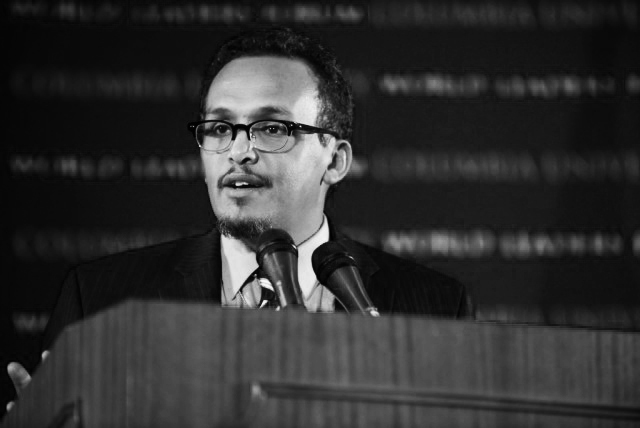 Violent extremism presents existential dilemma to all irrespective of faith, race, political and economic status. Countering such seemingly ubiquitous threat requires comprehensive strategy that addresses the root causes and effects of the issue at hand.It requires broad-based collaboration and coordination that, needless to say, can only be achieved when there is strong foundation of goodwill and trust between parties.Unfortunately, in the past decade or so, some U.S. agencies and offices, such as the FBI and the Homeland Security Office of Civil Rights and Civil Liberties, have played relentless political roles that polarized Muslim leadership, stigmatized major organizations, and stereotyped communities. By and large, these practices have eroded the U.S. Muslim community’s confidence on the neutrality and fairness of the FBI.In the U.S., the tragic events of 9/11 have blurred the demarcation of authority or checks and balances; so much so that there is not a distinction between the law-enforcement and offices established to protect the constitutional rights of people in the U.S. In 2009, I wrote a piece titled “Bridges of Rhetoric and Suspension,” which argued precisely that. Some active members of my Somali and other Muslim community wrote to me recommending that I, in a nutshell, should “stop overreacting.”It wasn’t until last year, after The Federal Civil Rights Engagement with Arab and Muslim American Communities post-9/11 report was released, that I was vindicated. Yes, the FBI has been exploiting community trust by abusing its own outreach programs across the country, and planting agent saboteurs in mosques.
Violent extremism presents existential dilemma to all irrespective of faith, race, political and economic status. Countering such seemingly ubiquitous threat requires comprehensive strategy that addresses the root causes and effects of the issue at hand.It requires broad-based collaboration and coordination that, needless to say, can only be achieved when there is strong foundation of goodwill and trust between parties.Unfortunately, in the past decade or so, some U.S. agencies and offices, such as the FBI and the Homeland Security Office of Civil Rights and Civil Liberties, have played relentless political roles that polarized Muslim leadership, stigmatized major organizations, and stereotyped communities. By and large, these practices have eroded the U.S. Muslim community’s confidence on the neutrality and fairness of the FBI.In the U.S., the tragic events of 9/11 have blurred the demarcation of authority or checks and balances; so much so that there is not a distinction between the law-enforcement and offices established to protect the constitutional rights of people in the U.S. In 2009, I wrote a piece titled “Bridges of Rhetoric and Suspension,” which argued precisely that. Some active members of my Somali and other Muslim community wrote to me recommending that I, in a nutshell, should “stop overreacting.”It wasn’t until last year, after The Federal Civil Rights Engagement with Arab and Muslim American Communities post-9/11 report was released, that I was vindicated. Yes, the FBI has been exploiting community trust by abusing its own outreach programs across the country, and planting agent saboteurs in mosques.Nature of the Beast
In its essence, violent extremism is terrorism, and terrorism is an evil act regardless of the executing agent (Muslim, Jew, Christian, Buddhist or Atheist) or the geographical space (U.S., U.K., Pakistan, or Palestine) or the method employed (machine gun, suicide-belt, machete, drone or carpet-bombing).Especially since the Paris terrorist attacks, Muslim communities in Europe and U.S. have been subjected to unbearable stereotyping and fishing expeditions that made many feel alienated from the rest. Never mind the Pew Research Center Report on Global Attitudes and Trends’ findings that violent extremist “cults,” such as the Islamic State in Iraq and Syria (ISIS) and al-Shabaab, don’t have the popularity that certain special interest groups project them to have, and that anti-extremist sentiments are on upward trend in most, if not all, majority Muslim countries.At the Washington summit to counter violent extremism, Obama aptly said that “all of us have a responsibility to refute the notion that groups like [iSIS] somehow represent Islam, because that is a falsehood that embraces the terrorist narrative.”However, in certain political circles both in U.S. and Europe, there are polarizing politicians who have been aggressively pushing a motto that is intended to indict the religion of Islam as a terrorist manifesto. They pressure the U.S. government to drop the use of “violent extremism” and use instead terms such as “Islamic terrorism” or “Islamic extremism” as that appeals to their conservative political base.“You cannot defeat an enemy if you refuse to acknowledge what it is” insists U.S. Senator Ted Cruz, who is also running for president in the coming election.Under Scrutiny
While the threat of violent extremism is real, any hyperbolic approach in appraising said threat or reckless reaction in its “preemption” could only exacerbate the situation and promote the recruitment of more terrorists.Ironically, the FBI must come clean. Granted, every aspect of security-related strategy cannot and should not be placed in a glass display or in the public domain. However, if two parties with history of mutual suspicion should partner for the common good, first they must hash certain things out of the way for confidence-building measures.Yes, we should all partner in countering violent extremism. However, such partnership could only succeed if/when it is genuinely in the interest of the common good.To this day — though with slight modifications — the U.S. national security strategy is based on Neocon world vision- a foreign policy based on global war on terrorism and a domestic policy based on the infamous FBI COINTELPRO.Within this arrangement, many wrongs were done unto many people.The Human Rights Watch, in collaboration with Columbia Law School’s Human Rights Institute, has produced a damning 200-page report titled “Illusion of Justice: Human Rights Abuses in US Terrorism Prosecutions.”As a result of a separate revelation, recently the Justice Department and the FBI have acknowledgeddecades of false forensic expert testimonies that eventually convicted innocent Americans. It should be noted that the investigation, which revealed this chilling pattern of deception, would have remained shrouded in secrecy had the Washington Post not confronted the right office with critical query. This, needless to say, underscores the importance of media’s critical role of vigilance to keep power in check and defend public interest.If the FBI could allow this to happen to Americans who mostly defy the stereotypical terrorist image,is it outlandish to assume that those who fit in the stereotypical profile can only be saved by the grace of God.According to Glenn Greenwald of The Intercept, an irrefutably dubious pattern has developed over the years in which the law enforcement — namely the FBI — “target a Muslim: not due to any evidence of intent or capability to engage in terrorism, but rather for the ‘radical ‘political views he expresses. In most cases, the Muslim targeted by the FBI is a very young (late teens, early 20s), adrift, unemployed loner who has shown no signs of mastering basic life functions, let alone carrying out a serious terror attack, and has no known involvement with actual terrorist groups.”Greenwald argues if the FBI had substantive findings of criminality or intention of terrorism, it would not rely on blackmailed testimonies or count on trying the case through the court of public opinion.In February of this year, a Somali-American youth was arrested in Columbus, Ohio for having alleged ties with terrorists in Syria. Almost instantaneously, the case became international news. I got a call from local media for a comment. I accepted the Columbus Dispatch offer with the condition that I would be asked all questions in writing, and I would answer them all the same. I received one question soliciting my thoughts on said arrest and home-grown terrorist threat. My response was as follow:If the accused is found ‘guilty as charged’ through a fair trial, it is only fair that he faces what the court hands him.That said, I must confess I was intrigued by three particular things:First: Why would the Feds let the county Prosecutor spearhead a terrorism case? Second: How would a person accused of misdemeanor theft of $15.33 (actual charge) have the money and resources to support a terrorist organization? Third, what compelled the Dispatch to publish the address of a family of accused citizen?Shortly after sending my answer, I received a response informing me that the reporter has opted out. That was hardly shocking.It wasn’t till April 16, after weeks of law enforcement visible camping in the neighborhood and the verdict of the court of public opinion became clear, that the case has officially become a federal terrorism case and the county prosecutor dropped all charges.This past weekend, six more Somali-American youth were indicted in Minnesota for supporting ISIS.Foreign Policy and Violent Extremism
The duality, or more accurately, the “Dr. Jekyll and Mr. Hyde” aspect of the U.S. foreign policy, is one of the elements that ignites violent extremism. On one hand, the U.S. promotes values like governance by legitimate means, human rights, free-market economy; on the other hand—mostly covertly—it operates in the dark and plays by rule of the jungle.The more a given group of citizens, or a particular religious community, is squeezed, routinely placed under the microscope or are unfairly ostracized, the more they become disillusioned or feel disenfranchised and see themselves as non-stakeholders.To gain the confidence of the majority of the Muslim community in collaborating to counter violent extremism effectively, the following factors should be taken into consideration.First, stereotyping and paranoiac cynicism that often leads to covert campaign of guilt by association must come to an end.Second, law-enforcement agencies and support offices should be periodically provided sensitivity trainings by professionals who have no zero-sum political agenda to advance.Third, the “mainstream media” still hold monopoly on framing debates and raising awareness on issues of contention and conflicts; whenever they neglect their objective role or jingoistically relinquish their duties to a particular group, they become part of the problem. That needs to stop.Fourth, political leaders need to stop routinely spewing hateful narratives that project or insinuate that Muslim in the West are ticking bombs. This alienates American Muslims and, subsequently, radicalizes some of their youth, who may decide to join extremist to push back against those who deny them their constitutional rights.Fifth, we must muster the moral courage to accept this reality: Greed-driven foreign policy sows hate and counter hate. Doing so only sows domestic fear and insecurity, whether actual or anticipated.Sixth, resist the “overblown” factor by assessing threats within the appropriate context and proportional reaction.In conclusion, like anti-Semitism, Islamophobia must be systematically curtailed and eradicated. This, of course, would require an educational campaign, a collaborative efforts that include governmental and non-governmental institutions, such as think tanks, media groups, academia and public education sectors. Abukar Arman is a former diplomat (Somalia's Special Envoy to the US). He is a widely published analyst. His focus is Foreign policy/Islam/post-civil war Somalia/extremism. He is a DiploAct of a sort (fusion of diplomacy & activism). You may follow him on Twitter: @4DialogSK or reach him via e-mail:abukar_arman@yahoo.com
Abukar Arman is a former diplomat (Somalia's Special Envoy to the US). He is a widely published analyst. His focus is Foreign policy/Islam/post-civil war Somalia/extremism. He is a DiploAct of a sort (fusion of diplomacy & activism). You may follow him on Twitter: @4DialogSK or reach him via e-mail:abukar_arman@yahoo.com
-
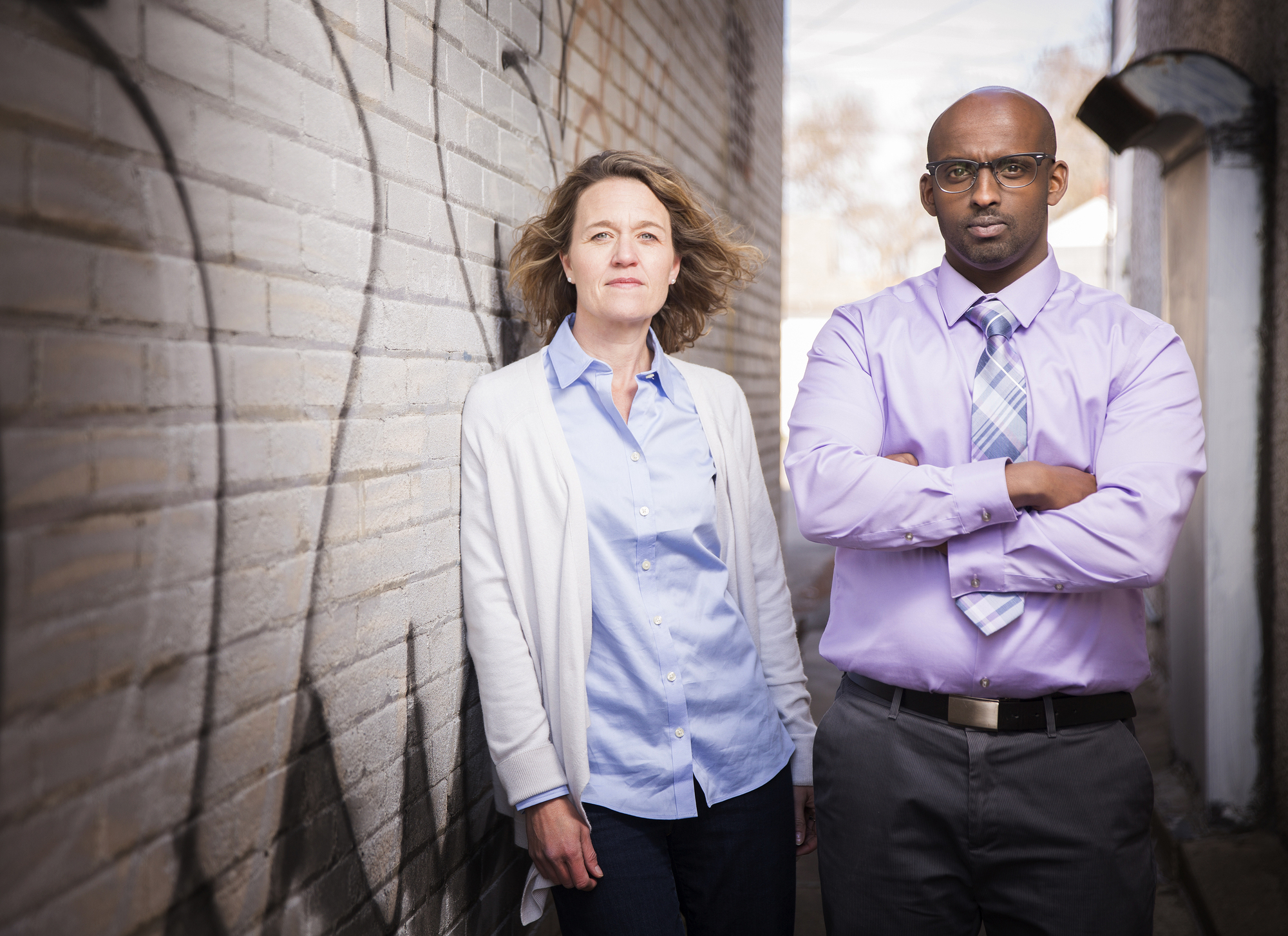 They have known each other barely a month, but their lives are linked by a shared story — the struggle to find a new identity in a new land.One is a quiet, lanky Somali-American teen from Minneapolis, arrested by the FBI last fall and accused of trying to join a brutal terrorist group in the Middle East.The other is a Somali-American schoolteacher who came to the United States when he was 12 without a hint of English on his tongue. He teaches history at Roosevelt High School in Minneapolis, where he’s the coach of a scrappy debate team and an eloquent instructor who shows his students the power of words to change minds.Today, Abdullahi Yusuf and Ahmed Amin find their paths intertwined — drawn into an intensifying global terrorism fight through an unusual new experiment to see if radicalized Somali-American youths can be talked off the path of violence and extremism.Amin and a team of religious scholars and teachers pulled together by Heartland Democracy, a Minneapolis nonprofit serving at-risk youths, have been assigned by a federal judge to mentor Yusuf, an 18-year-old who, like the six young men arrested on conspiracy charges last week, stands accused of trying to leave the United States to be a terrorist. U.S. District Chief Judge Michael Davis diverted Yusuf to the Heartland project in what is thought to be a first for the federal court system in a terror case.“Someone’s life is on the line,” said Amin. “Many [of the accused] are great kids, but kids who are lost. It’s for us to help them discover who they are — and not who they are told they are by being brainwashed.”With Minnesota thrust again into the international struggle against Islamist violence, Amin and his colleagues also find themselves walking a path that could lead to a new form of justice in such cases.“This is all new territory for us,” said Mary McKinley, Heartland’s executive director.Yusuf came to the attention of federal investigators in the Twin Cities last spring, when he applied for an expedited passport but couldn’t answer basic questions about his plans to travel to Istanbul. He would be the first of nearly a dozen young Somali-Minnesotans now caught up in a yearlong federal grand jury investigation. The FBI placed him under surveillance and, a few weeks later, stopped him as he tried to board an overseas flight at Minneapolis-St. Paul International Airport.From the first, Yusuf showed signs that his life could be redeemed. An FBI agent testified that, after Yusuf was stopped at the airport in May, he ceased associating with other suspects in the terrorism investigation. Considered low-risk, he was an ideal candidate for Heartland Democracy’s new effort.After Yusuf was arrested and charged, in November, Davis made it clear that he was keeping him on a short tether. He ordered Yusuf to wear a GPS-tracking ankle bracelet and to check in frequently with probation authorities after his first court appearance.Yusuf, then a student at Inver Hills Community College, didn’t disappoint the judge. Around the time Davis was considering the Heartland diversion project, Yusuf’s GPS unit went off randomly. “Call Officer now,” it read. The young man was in a philosophy class and didn’t have his cellphone — it had been confiscated by the FBI.“He ran home 2 miles to call his probation officer,” an attorney wrote in her argument to show Yusuf was a good candidate for diversion.After pleading guilty last winter, Yusuf was assigned to a halfway house.Living in two worldsAmin and his colleagues are forbidden to discuss their conversations with Yusuf. Nevertheless, the case is producing powerful insights into the minds of young Somali-Americans who present a deep and troubling puzzle.When they confronted him at the Twin Cities airport, agents asked Yusuf whether his parents knew where he was going. He said he had told them he was “Gonna be gone for a while.” Asked whether his father knew where was, Yusuf replied, “I don’t think he cares.”Then, at some of the first meetings documented by Heartland in court filings for Yusuf’s case, he shared more intimate pain, exposing exactly the kind of wounds that Heartland wants to try to mend.Yusuf described living parallel but separate lives — by night an obedient son of Somali refugees, by day an American high school student who enjoyed the freedoms and pleasures of a secular society — customs unimaginable in his family’s homeland.“It’s like we young people live in two different worlds,” he explained. “We go to school, we speak English, we are American. And we go home and when we walk in the door it’s like walking into a different country.”At home, he added, “It’s like Somalia, and our parents are very worried about what’s going on there.”Amin sees Yusuf and his generation as “the hybrids.” Some, he said, have embraced the life of an American teen. Others remain suspicious of what can still seem a strange culture.“I work in a school where there are kids who have not bought into America,” Amin said. “It’s almost as if you have to sell them the idea that there is a good life that America affords you. We have to implore them. I read where one of the defendants said he was through with America and wanted to burn his ID. Well, if you don’t have the role models, that’s what can happen.“These are the kids trying to figure it out,” Amin continued. “The ‘right’ question to start asking is not just about being a Somali-American and embracing this country and democracy. It’s ‘What does it mean to be a Somali-Muslim-American?’ ”Amin is confronted by Somali parents who don’t want their daughters to read certain books; he leaves school at day’s end knowing that all the energy he put into “trying to explain that the Constitution is a living document” will likely fall by the wayside in some students’ homes.“What is being taught in the home?” he asked. “What are the attitudes? Civic education about embracing this country and democracy, does that match up at home?”Of the more than 20 Somali-Minnesotans in the first wave of departures, who left to fight in Somalia, roughly one-third had — like Amin himself — attended Roosevelt.Good kids, bad choices?Mary McKinley is a realist. A veteran of civic nonprofits such as the Open Society Institute and the Aspen Institute, she returned to Minnesota five years ago after a long career overseas and in Washington, D.C. She bristles at any suggestion that she’s merely, as she puts it, “the bleeding heart liberal” out of touch with reality. She knows her organization’s curriculum — civic engagement for at-risk youths — is not going to work for many of the people who are charged with terrorism.In January correspondence to the U.S. Public Defender’s Office in Minneapolis, whose attorneys were representing Yusuf, McKinley was blunt.“Make no mistake: We realize this would be an experiment, a pretrial release program unlike any other, especially in dealing with the ISIL threat and the counterterrorism efforts that are the focus of the FBI, the U.S. Attorney and the White House.“This community has been the victim of benign neglect and we know the consequences,’’ she added. “Youth involved in violence, gangs, drug use and trafficking, high rates of poverty, extremely high unemployment rates, and now terrorism.”In an interview last week, McKinley elaborated.“I don’t use the term, ‘de-radicalization.’ Our program works with young people to connect with themselves, their community and their world. We believe that when young people make bad choices — some extremely bad choices — there’s still an opportunity to turn your life around.”Source: http://www.startribune.com
They have known each other barely a month, but their lives are linked by a shared story — the struggle to find a new identity in a new land.One is a quiet, lanky Somali-American teen from Minneapolis, arrested by the FBI last fall and accused of trying to join a brutal terrorist group in the Middle East.The other is a Somali-American schoolteacher who came to the United States when he was 12 without a hint of English on his tongue. He teaches history at Roosevelt High School in Minneapolis, where he’s the coach of a scrappy debate team and an eloquent instructor who shows his students the power of words to change minds.Today, Abdullahi Yusuf and Ahmed Amin find their paths intertwined — drawn into an intensifying global terrorism fight through an unusual new experiment to see if radicalized Somali-American youths can be talked off the path of violence and extremism.Amin and a team of religious scholars and teachers pulled together by Heartland Democracy, a Minneapolis nonprofit serving at-risk youths, have been assigned by a federal judge to mentor Yusuf, an 18-year-old who, like the six young men arrested on conspiracy charges last week, stands accused of trying to leave the United States to be a terrorist. U.S. District Chief Judge Michael Davis diverted Yusuf to the Heartland project in what is thought to be a first for the federal court system in a terror case.“Someone’s life is on the line,” said Amin. “Many [of the accused] are great kids, but kids who are lost. It’s for us to help them discover who they are — and not who they are told they are by being brainwashed.”With Minnesota thrust again into the international struggle against Islamist violence, Amin and his colleagues also find themselves walking a path that could lead to a new form of justice in such cases.“This is all new territory for us,” said Mary McKinley, Heartland’s executive director.Yusuf came to the attention of federal investigators in the Twin Cities last spring, when he applied for an expedited passport but couldn’t answer basic questions about his plans to travel to Istanbul. He would be the first of nearly a dozen young Somali-Minnesotans now caught up in a yearlong federal grand jury investigation. The FBI placed him under surveillance and, a few weeks later, stopped him as he tried to board an overseas flight at Minneapolis-St. Paul International Airport.From the first, Yusuf showed signs that his life could be redeemed. An FBI agent testified that, after Yusuf was stopped at the airport in May, he ceased associating with other suspects in the terrorism investigation. Considered low-risk, he was an ideal candidate for Heartland Democracy’s new effort.After Yusuf was arrested and charged, in November, Davis made it clear that he was keeping him on a short tether. He ordered Yusuf to wear a GPS-tracking ankle bracelet and to check in frequently with probation authorities after his first court appearance.Yusuf, then a student at Inver Hills Community College, didn’t disappoint the judge. Around the time Davis was considering the Heartland diversion project, Yusuf’s GPS unit went off randomly. “Call Officer now,” it read. The young man was in a philosophy class and didn’t have his cellphone — it had been confiscated by the FBI.“He ran home 2 miles to call his probation officer,” an attorney wrote in her argument to show Yusuf was a good candidate for diversion.After pleading guilty last winter, Yusuf was assigned to a halfway house.Living in two worldsAmin and his colleagues are forbidden to discuss their conversations with Yusuf. Nevertheless, the case is producing powerful insights into the minds of young Somali-Americans who present a deep and troubling puzzle.When they confronted him at the Twin Cities airport, agents asked Yusuf whether his parents knew where he was going. He said he had told them he was “Gonna be gone for a while.” Asked whether his father knew where was, Yusuf replied, “I don’t think he cares.”Then, at some of the first meetings documented by Heartland in court filings for Yusuf’s case, he shared more intimate pain, exposing exactly the kind of wounds that Heartland wants to try to mend.Yusuf described living parallel but separate lives — by night an obedient son of Somali refugees, by day an American high school student who enjoyed the freedoms and pleasures of a secular society — customs unimaginable in his family’s homeland.“It’s like we young people live in two different worlds,” he explained. “We go to school, we speak English, we are American. And we go home and when we walk in the door it’s like walking into a different country.”At home, he added, “It’s like Somalia, and our parents are very worried about what’s going on there.”Amin sees Yusuf and his generation as “the hybrids.” Some, he said, have embraced the life of an American teen. Others remain suspicious of what can still seem a strange culture.“I work in a school where there are kids who have not bought into America,” Amin said. “It’s almost as if you have to sell them the idea that there is a good life that America affords you. We have to implore them. I read where one of the defendants said he was through with America and wanted to burn his ID. Well, if you don’t have the role models, that’s what can happen.“These are the kids trying to figure it out,” Amin continued. “The ‘right’ question to start asking is not just about being a Somali-American and embracing this country and democracy. It’s ‘What does it mean to be a Somali-Muslim-American?’ ”Amin is confronted by Somali parents who don’t want their daughters to read certain books; he leaves school at day’s end knowing that all the energy he put into “trying to explain that the Constitution is a living document” will likely fall by the wayside in some students’ homes.“What is being taught in the home?” he asked. “What are the attitudes? Civic education about embracing this country and democracy, does that match up at home?”Of the more than 20 Somali-Minnesotans in the first wave of departures, who left to fight in Somalia, roughly one-third had — like Amin himself — attended Roosevelt.Good kids, bad choices?Mary McKinley is a realist. A veteran of civic nonprofits such as the Open Society Institute and the Aspen Institute, she returned to Minnesota five years ago after a long career overseas and in Washington, D.C. She bristles at any suggestion that she’s merely, as she puts it, “the bleeding heart liberal” out of touch with reality. She knows her organization’s curriculum — civic engagement for at-risk youths — is not going to work for many of the people who are charged with terrorism.In January correspondence to the U.S. Public Defender’s Office in Minneapolis, whose attorneys were representing Yusuf, McKinley was blunt.“Make no mistake: We realize this would be an experiment, a pretrial release program unlike any other, especially in dealing with the ISIL threat and the counterterrorism efforts that are the focus of the FBI, the U.S. Attorney and the White House.“This community has been the victim of benign neglect and we know the consequences,’’ she added. “Youth involved in violence, gangs, drug use and trafficking, high rates of poverty, extremely high unemployment rates, and now terrorism.”In an interview last week, McKinley elaborated.“I don’t use the term, ‘de-radicalization.’ Our program works with young people to connect with themselves, their community and their world. We believe that when young people make bad choices — some extremely bad choices — there’s still an opportunity to turn your life around.”Source: http://www.startribune.com -
A Somali who's living and working abroad wants to send money to his grandmother in a remote village. A money transfer company gets the cash delivered in a flash.An aid organization wants to pay its Somali staff. Again, money transfer companies do the job in a country where the banking system shut down in 1991, when the government collapsed.But now, the transfer businesses are under siege. After the April 2 massacre of at least 148 university students and staff in Garissa, Kenya, attributed to the terrorist group al-Shabab, the Kenyan government has revoked the licenses of the 13 Somali money transfer companies that handled almost all funds flowing into Somalia from family members and aid organizations based in East Africa. The government's concern was that these transfer agents could be used to fund al-Shabab.Emma Naylor-Ngugi, the regional director for CARE International, says payments that were pending from her offices in Nairobi to staff, contractors and aid recipients in Somalia were suspended without warning.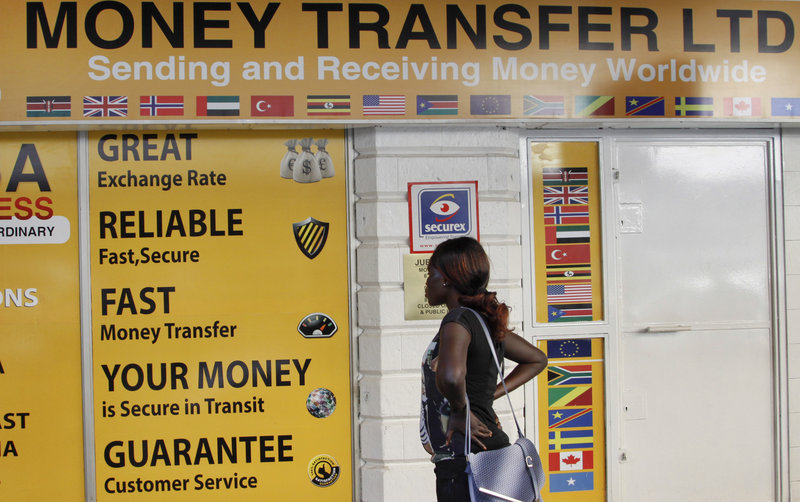 The Kenyan government closed this money-transfer service to prevent money from reaching the terrorist group al-Shahab in Somalia.Khalil Senosi/AP"We're talking about people who already live on the edge," Naylor-Ngugi says. "We really feel very worried that in the next few weeks we're going to see more and more distress."Money transfer companies play an important role in Somalia. "They do money transfers like Western Union does," says John Kisimir. "That is the driving force of the economy."The aid organizations that use Somali transfer agents marvel at their efficiency. "You can buy a sort of money order in Nairobi, and that money will reappear instantly in Somalia," says Naylor-Ngugi. "It's very, very impressive, compared to even what you might find in developed countries."The role of the transfer companies is all the more important in Somalia because millions depend on money sent from relatives abroad."If you're sitting around the table in Somalia with four people, chances are two of them rely on remittances from relatives overseas," says Anne-Marie Schryer-Roy, communications and advocacy manager at Adeso, a Kenya-based humanitarian organization. "Most people literally rely on [remittances] to put food on the table or to pay school fees or medical bills."These person-to-person transfers are estimated to account for 40 percent of Somalia's gross domestic product, more than all international aid and foreign investment combined.Remittances were under threat long before the Kenyan government's clampdown. Since 2011, banks in Britain and the United States have been closing the accounts of Somali money transfer businesses. The banks are wary that they could be charged with money laundering and the funding of terrorist groups.Ed Pomfret, acting country director for Oxfam in Somalia, believes that U.S. banks could adhere to regulations and still allow the best of the Somali money transfer companies to operate. "It's because of a perception that Somalia from a distance looks like a dangerous and chaotic place," says Pomfret. "What we know working on the ground in Somalia is that there's actually an awful lot of transparency in a lot of these financial transactions, and there's a lot of oversight."The creative Somalis in this business have tried to adapt to the clampdown, sometimes by using cash couriers."They are literally putting money into suitcases and flying it from the U.S. to Dubai, which is where the clearinghouses are for the money transfer companies," Schryer-Roy says. "It's fairly obvious that if the objective of the regulations is to increase transparency and reduce the risk of money laundering and terrorism financing, putting money into suitcases is defeating the purpose of the law."Like the Somali transfer operators, aid organizations are looking for workarounds. Most humanitarian groups are considering more costly options like routing funds via Djibouti or Dubai.Any delays could have serious consequences in Somalia. "There are over 30,000 children in Somalia who are severely malnourished; essentially they are at death's door," says Pomfret. "So even if one week the money doesn't come through to Somalia, it could in some cases be a matter of life and death."The uncertainty is also hampering rapid response to a new crisis: Yemeni refugees entering Somalia to flee war at home.Aid organizations are trying to persuade the Kenyan government to allow some of the Somali money transfer companies to trade again. "We're not going to say they are all innocent, we're just saying vet them, so you know whether they are doing anything fishy," says Kisimir at World Vision. "And then let those who are clean continue doing business so that people do not suffer in the process."Source: http://www.npr.orgA Somali woman counts the cash she collected from a money transfer service in Mogadishu, the capital city.Farah Abdi Warsameh/AP
The Kenyan government closed this money-transfer service to prevent money from reaching the terrorist group al-Shahab in Somalia.Khalil Senosi/AP"We're talking about people who already live on the edge," Naylor-Ngugi says. "We really feel very worried that in the next few weeks we're going to see more and more distress."Money transfer companies play an important role in Somalia. "They do money transfers like Western Union does," says John Kisimir. "That is the driving force of the economy."The aid organizations that use Somali transfer agents marvel at their efficiency. "You can buy a sort of money order in Nairobi, and that money will reappear instantly in Somalia," says Naylor-Ngugi. "It's very, very impressive, compared to even what you might find in developed countries."The role of the transfer companies is all the more important in Somalia because millions depend on money sent from relatives abroad."If you're sitting around the table in Somalia with four people, chances are two of them rely on remittances from relatives overseas," says Anne-Marie Schryer-Roy, communications and advocacy manager at Adeso, a Kenya-based humanitarian organization. "Most people literally rely on [remittances] to put food on the table or to pay school fees or medical bills."These person-to-person transfers are estimated to account for 40 percent of Somalia's gross domestic product, more than all international aid and foreign investment combined.Remittances were under threat long before the Kenyan government's clampdown. Since 2011, banks in Britain and the United States have been closing the accounts of Somali money transfer businesses. The banks are wary that they could be charged with money laundering and the funding of terrorist groups.Ed Pomfret, acting country director for Oxfam in Somalia, believes that U.S. banks could adhere to regulations and still allow the best of the Somali money transfer companies to operate. "It's because of a perception that Somalia from a distance looks like a dangerous and chaotic place," says Pomfret. "What we know working on the ground in Somalia is that there's actually an awful lot of transparency in a lot of these financial transactions, and there's a lot of oversight."The creative Somalis in this business have tried to adapt to the clampdown, sometimes by using cash couriers."They are literally putting money into suitcases and flying it from the U.S. to Dubai, which is where the clearinghouses are for the money transfer companies," Schryer-Roy says. "It's fairly obvious that if the objective of the regulations is to increase transparency and reduce the risk of money laundering and terrorism financing, putting money into suitcases is defeating the purpose of the law."Like the Somali transfer operators, aid organizations are looking for workarounds. Most humanitarian groups are considering more costly options like routing funds via Djibouti or Dubai.Any delays could have serious consequences in Somalia. "There are over 30,000 children in Somalia who are severely malnourished; essentially they are at death's door," says Pomfret. "So even if one week the money doesn't come through to Somalia, it could in some cases be a matter of life and death."The uncertainty is also hampering rapid response to a new crisis: Yemeni refugees entering Somalia to flee war at home.Aid organizations are trying to persuade the Kenyan government to allow some of the Somali money transfer companies to trade again. "We're not going to say they are all innocent, we're just saying vet them, so you know whether they are doing anything fishy," says Kisimir at World Vision. "And then let those who are clean continue doing business so that people do not suffer in the process."Source: http://www.npr.orgA Somali woman counts the cash she collected from a money transfer service in Mogadishu, the capital city.Farah Abdi Warsameh/AP
http://www.somaliaonline.com/why-somali-grandmas-and-aid-workers-might-be-short-on-cash/ -
Former Senator Norm Coleman faces criticism over a Star Tribune editorial that a Minneapolis City Council member calls "racist" and "hateful.”Council member Abdi Warsame said the title of Coleman's editorial, "Land of 10,000 Terrorists," is "unbelievable and characterizes all Somali citizens in Minnesota as terrorists."Warsame said the piece is "shocking and I am asking Senator Coleman to apologize to all Somali citizens in Minnesota."Warsame said he agrees with many of Coleman's points in the editorial and he has a great deal of respect for the former senator, but he said, "I cannot accept the overall message that he is putting out, because it is hurtful and counter-productive."Warsame said there are Somalis in his ward who are Republicans and "they've even called me and told me they reached out to the party telling them this is unacceptable and they want an apology."We reached Coleman, by phone, in Washington, D.C. and he says he stands by his editorial. He told us "we have to raise this issue to another level, because the consequences of failure are just too great." Coleman also praised U.S. Attorney, Andrew Luger, for his hard work in bringing suspected terrorist sympathizers to justice in Minnesota.Coleman did say the Star Tribune wrote the headline for the piece, but Warsame said Coleman used the phrase "Land of 10,000 Terrorists" inside the editorial, even if he did not write the actual headline.Source: http://kstp.com
-
Since a devastating civil war that began in 1991, Somalia has faced severe and devastating conflicts. Attacks by the militant Islamic group Al-Shabab in Somalia and surrounding countries have contributed to an international reputation for the northeast African country as a locus of deadly violence.Ugaaso Abukar Boocow, a 27-year-old Somalian woman who works for the Ministry of Reconstruction, which focuses on planning and development in the troubled country, decided to turn to Instagram to help change Somalia’s image away from its association with terror and destruction.“Although devastated by the war, the future of my country is very promising. We are living in an era when social media is a reliable source of information. And it’s fast! So, I’ve taken the opportunity to show the story of a human and pleasant side of Somalia,”she explained to Le Monde.On her vibrant Instagram account, Boocow portrays Somali dishes, places to live, and fine sand beaches -- not to mention plenty of selfies in vibrant Somali prints. She’s posted nearly 500 pictures of her “human and pleasant” Somalia -- and amassed 74,500 followers in the process.Check out some of Boocow’s photos below, and see more at her Instagram page.
Instagram/ugaasadda
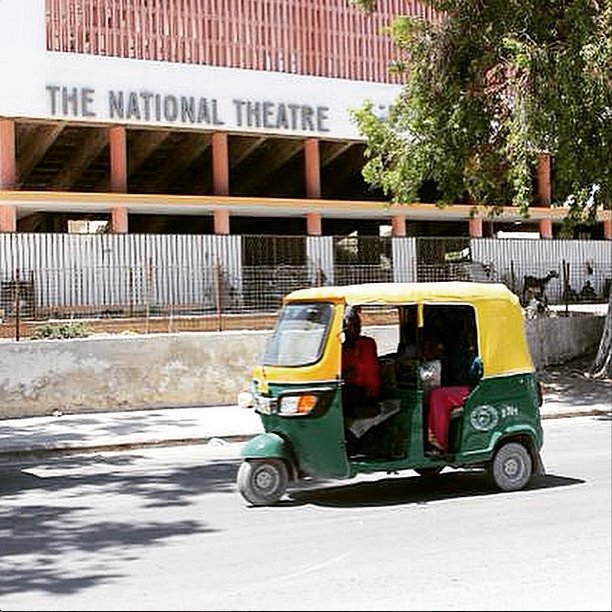 Instagram/ugaasadda
Instagram/ugaasadda Instagram/ugaasadda
Instagram/ugaasadda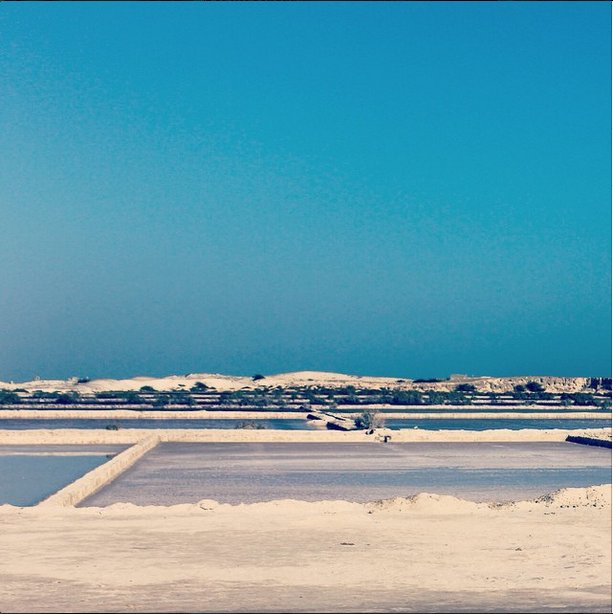 Instagram/ugaasadda
Instagram/ugaasadda Instagram/ugaasadda
Instagram/ugaasadda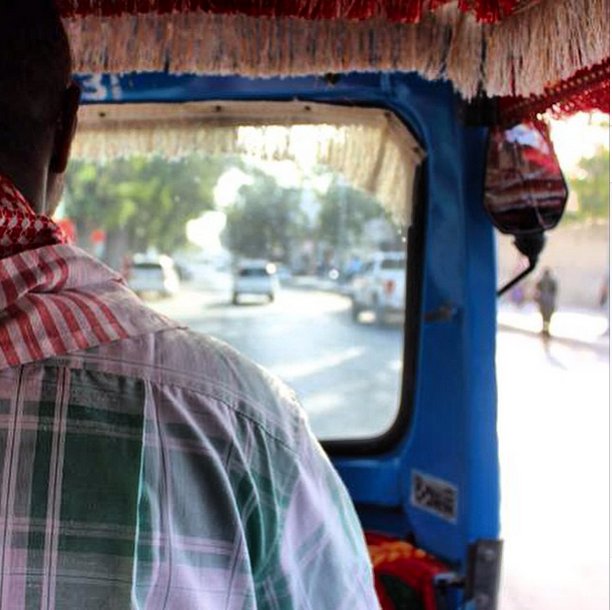 Instagram/ugaasadda
Instagram/ugaasadda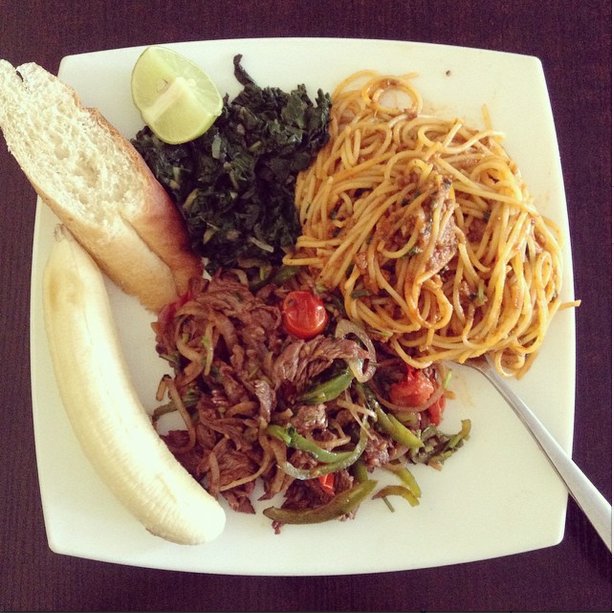 Instagram/ugaasadda
Instagram/ugaasadda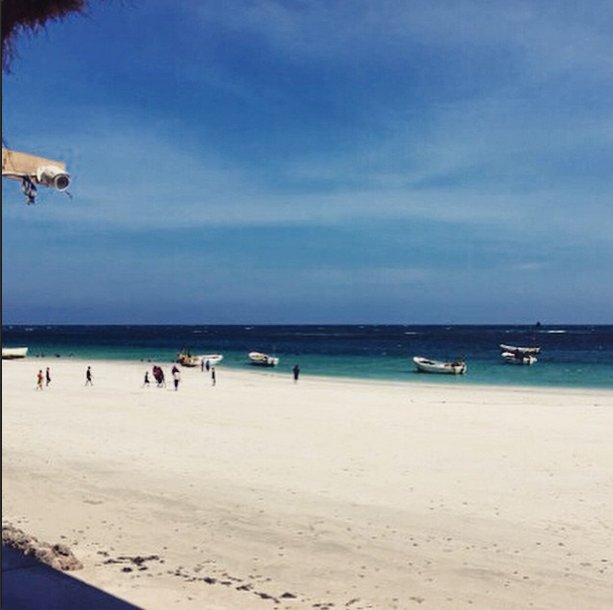 Instagram/ugaasadda
Instagram/ugaasadda instagram/ugaasada
instagram/ugaasada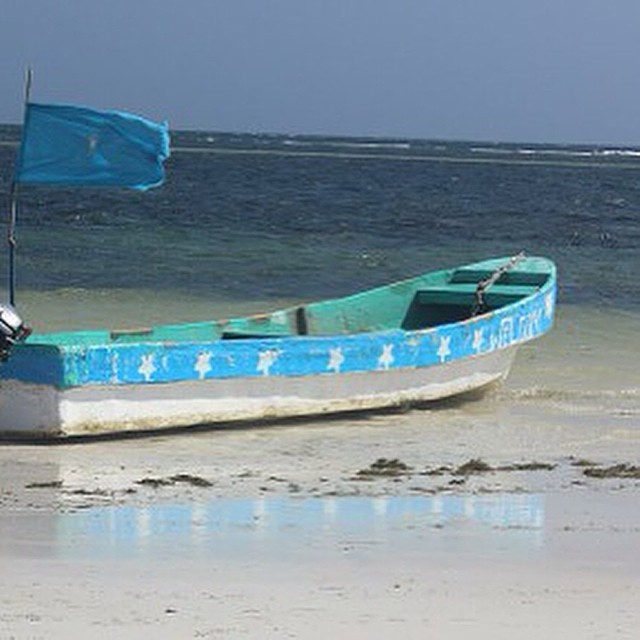 instagram.com/ugaasadainstagram.com/ugaasada
instagram.com/ugaasadainstagram.com/ugaasada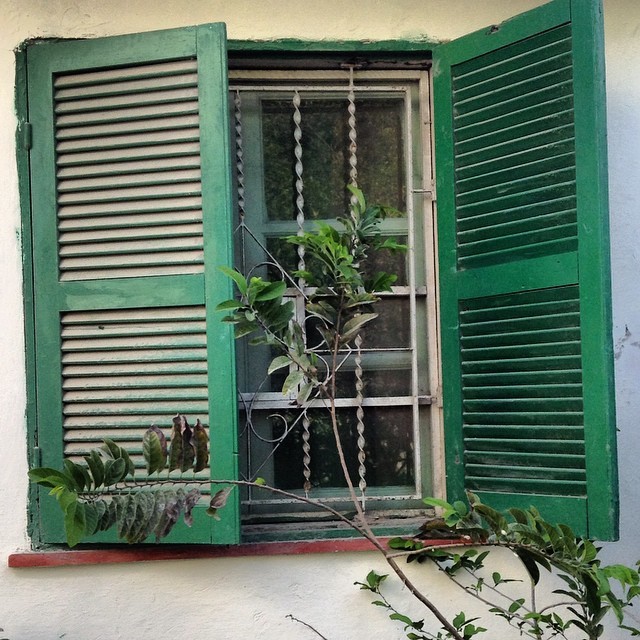 Source: http://www.huffingtonpost.com
Source: http://www.huffingtonpost.com -
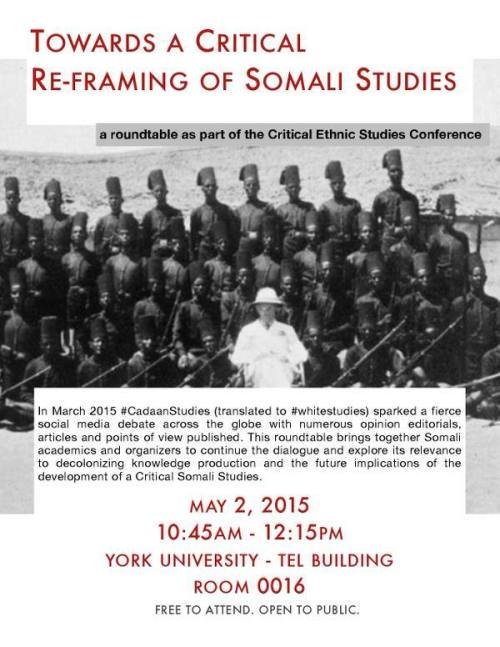 Last month, the Somaliland Journal of African Studies (SJAS) was launched with no Somali academics or researchers on the editorial and advisory boards. This raised a very necessary debate on the continued whiteness of academia, and more specifically on the production of knowledge on and about Africa. It prompted Safia Aidid to start the hashtag #cadaanstudies as a way to engage Somali academics in a conversation on the historical representations of Somalis and Somalia, and create a space for postcolonial and critical academic work by and for Somalis.Listen to an interview with Safia Aidid hereRead Safia’s article in The New InquiryCheck out the storify pageJoin a discussion on #cadaanstudies in Toronto on May 2nd at 10:45am at York University.
Last month, the Somaliland Journal of African Studies (SJAS) was launched with no Somali academics or researchers on the editorial and advisory boards. This raised a very necessary debate on the continued whiteness of academia, and more specifically on the production of knowledge on and about Africa. It prompted Safia Aidid to start the hashtag #cadaanstudies as a way to engage Somali academics in a conversation on the historical representations of Somalis and Somalia, and create a space for postcolonial and critical academic work by and for Somalis.Listen to an interview with Safia Aidid hereRead Safia’s article in The New InquiryCheck out the storify pageJoin a discussion on #cadaanstudies in Toronto on May 2nd at 10:45am at York University. -
Suleqa Isakh, 35, is thought to be one of just two Muslim women locally who drive cabs. She tools around the city six, sometimes seven, days a week in a yellow 2011 minivan. By Annysa Johnson of the Journal SentinelApril 18, 2015When Suleqa Isakh called Ali Mohamed (right) about driving for his Yellow Cab Co-Operative, Mohamed, a fellow Somalian immigrant, consulted a local imam, who gave his blessing.When Suleqa Isakh slid behind the wheel of a Yellow Cab for the first time in January, not everyone approved.It didn't seem right, some of her male Muslim colleagues opined, for a woman of the faith to work in such a way.Ali Mohamed, president of Yellow Cab Co-Operative, consulted a local imam, who gave his blessing. And now Isakh is one of the more than 180 drivers affiliated with Milwaukee's Yellow Cab co-op."I'm excited to do this," said a beaming Isakh, her round face framed by a jeweled hijab, the traditional headscarf worn by Muslim women in her native Somalia."America is a free country. If I want to be a police officer, I can do it. If I want to drive taxi, no one can tell me I can't."While there have been female taxi drivers in Milwaukee over the years, Isakh, 35, is thought to be one of just two Muslim women locally who drive cabs. (Another works independently.) She tools around the city six, sometimes seven, days a week in a gleaming yellow 2011 minivan that she's leasing. Hers is the quintessential immigrant story — one of heartache and hope, of hard work and sacrifice to build a new life in a new land.And, like many immigrants, she remains tethered to those she loves a world away. Isakh lives simply and sends much of what she earns to support her elderly mother, her sister and her sister's three small children in Kenya."I love my mom," she says again and again, closing her eyes as if to remember her mother's face. Her hope is to some day bring them to America."If only myself, I would not work so many hours," said Isakh, whose day sometimes stretches from 6:30 in the morning to 3 a.m. the next day. "But I have to support my mom and so many others."Born in Mogadishu, Isakh was just 10 when her family fled the civil war in Somalia to the relative safety of nearby Kenya. She spent more than a decade there before immigrating with her older cousin to the United States in 2005.Two years later, she stood in the cavernous lobby of Milwaukee's U.S. Courthouse, raised her right hand and vowed her allegiance to her new adopted country.
By Annysa Johnson of the Journal SentinelApril 18, 2015When Suleqa Isakh called Ali Mohamed (right) about driving for his Yellow Cab Co-Operative, Mohamed, a fellow Somalian immigrant, consulted a local imam, who gave his blessing.When Suleqa Isakh slid behind the wheel of a Yellow Cab for the first time in January, not everyone approved.It didn't seem right, some of her male Muslim colleagues opined, for a woman of the faith to work in such a way.Ali Mohamed, president of Yellow Cab Co-Operative, consulted a local imam, who gave his blessing. And now Isakh is one of the more than 180 drivers affiliated with Milwaukee's Yellow Cab co-op."I'm excited to do this," said a beaming Isakh, her round face framed by a jeweled hijab, the traditional headscarf worn by Muslim women in her native Somalia."America is a free country. If I want to be a police officer, I can do it. If I want to drive taxi, no one can tell me I can't."While there have been female taxi drivers in Milwaukee over the years, Isakh, 35, is thought to be one of just two Muslim women locally who drive cabs. (Another works independently.) She tools around the city six, sometimes seven, days a week in a gleaming yellow 2011 minivan that she's leasing. Hers is the quintessential immigrant story — one of heartache and hope, of hard work and sacrifice to build a new life in a new land.And, like many immigrants, she remains tethered to those she loves a world away. Isakh lives simply and sends much of what she earns to support her elderly mother, her sister and her sister's three small children in Kenya."I love my mom," she says again and again, closing her eyes as if to remember her mother's face. Her hope is to some day bring them to America."If only myself, I would not work so many hours," said Isakh, whose day sometimes stretches from 6:30 in the morning to 3 a.m. the next day. "But I have to support my mom and so many others."Born in Mogadishu, Isakh was just 10 when her family fled the civil war in Somalia to the relative safety of nearby Kenya. She spent more than a decade there before immigrating with her older cousin to the United States in 2005.Two years later, she stood in the cavernous lobby of Milwaukee's U.S. Courthouse, raised her right hand and vowed her allegiance to her new adopted country.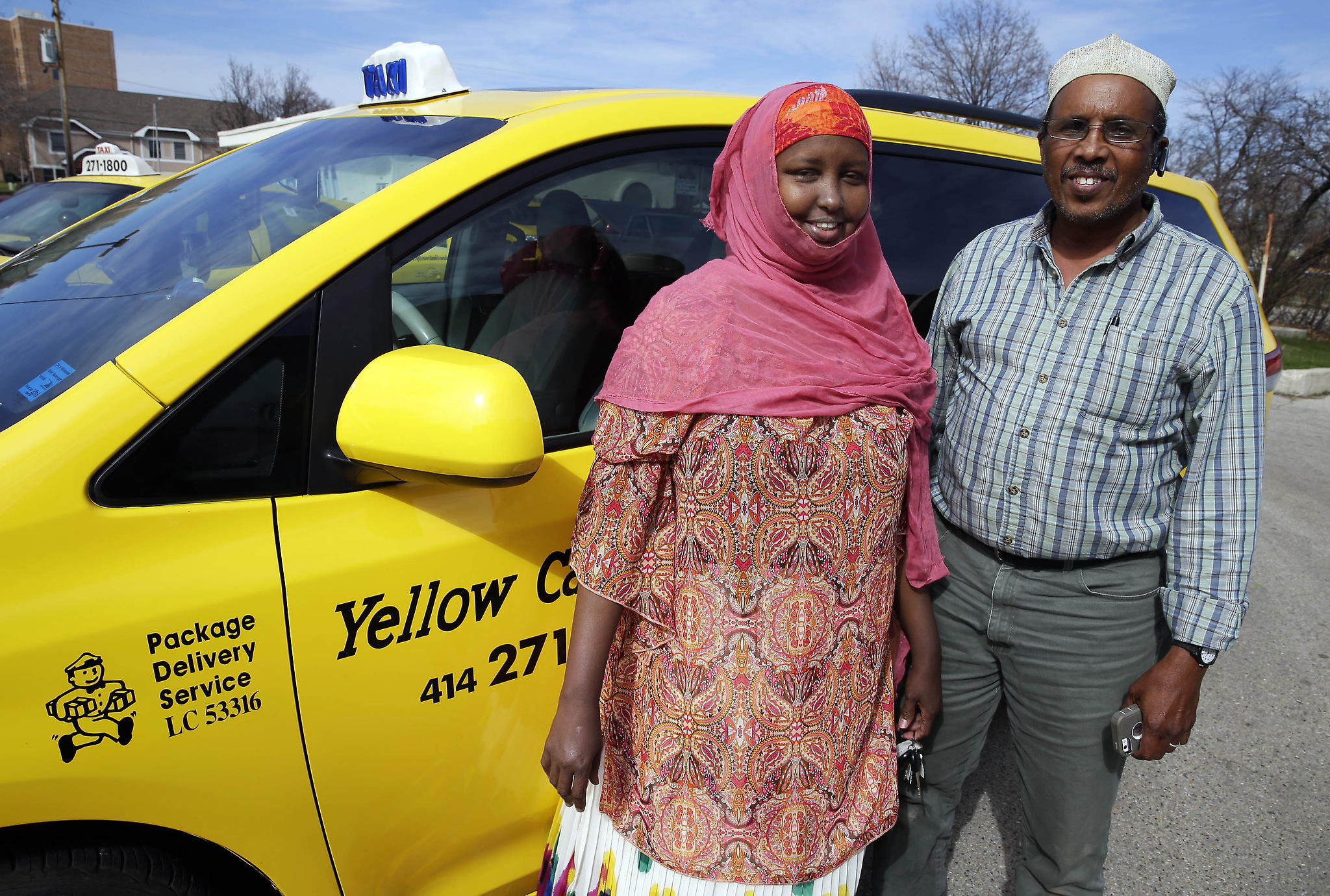 "I'm a citizen," she boasts, not three minutes into the conversation. "I love America, honestly," she says, almost breathless. "I'm a free woman. American woman."Isakh threw herself into this new life and all of the opportunities it presented. She took classes in English and got a job in the warehouse of a costume distributor. She went on to work as a dietary aide in an assisted living home for seniors. But, as much as she loved the work and the residents, the $9.40 an hour was just not enough to support six people on two continents.And so, she cold-called Mohamed, one of the owners at Yellow Cab, and a fellow Somalian immigrant — though she did not know him.Women drive in Somalia, and in most of the Muslim world. So it's not a shock to see a veiled woman behind the wheel of a car. Still, Somalia is a traditional culture where in many families women tend the home while men earn a paycheck, Mohamed said. And some of the other Muslim drivers bristled at the idea of bringing on a woman.Mohamed consulted Zulfiqar Shah, an internationally respected Islamic scholar and religious director at the Islamic Center of Milwaukee.Some ultraconservative interpretations require that Muslim women not be alone with men who are not members of their own families, for their safety and to avoid any risk of intimate contact, Shah explained."But when it comes to two evils, we always look at which is the greater one," he said. "If she is sitting home depending on the system for food stamps or unable to take care of her family's needs, that is a greater evil than being in the company of men."If her work is secure, it gives her more money, she is protected from being a sexual victim, then this is acceptable," he said.Isakh, too, is mindful of her faith and traditions.She prays throughout the day for Allah to keep her safe.She still wears the headscarf and the flowing blouses and skirts that cover her arms and legs in public. She runs home at the faith's designated prayer times, lays down her prayer rug facing Mecca, and bows and prostrates herself in prayerful supplication.Mohamed says Isakh has really taken to the work."I told her, 'Think twice about it. It's not an easy job,'" said Mohamed, who's been driving a cab in Milwaukee for more than two decades.Many people are friendly and generous, he told her. Others not so much. Mohamed recalls one person, who, after learning he was Muslim, got out of his cab slammed the door and stormed off.Isakh was undeterred."I thought she wouldn't like it," Mohamed said. "But she's doing a good job."Isakh hasn't encountered any of the hostility Mohamed experienced.In fact, she says, many passengers — especially women — are pleasantly surprised to find a female driver and curious about her hijab."A lot of people ask, 'Where are you from?' I never have problem," she says.And there's one extra perk: All the interaction has improved her command of her new language."This is my joy. ... I have many communications every day," Isakh says. "It's much better for my life."Source: http://www.jsonline.com
"I'm a citizen," she boasts, not three minutes into the conversation. "I love America, honestly," she says, almost breathless. "I'm a free woman. American woman."Isakh threw herself into this new life and all of the opportunities it presented. She took classes in English and got a job in the warehouse of a costume distributor. She went on to work as a dietary aide in an assisted living home for seniors. But, as much as she loved the work and the residents, the $9.40 an hour was just not enough to support six people on two continents.And so, she cold-called Mohamed, one of the owners at Yellow Cab, and a fellow Somalian immigrant — though she did not know him.Women drive in Somalia, and in most of the Muslim world. So it's not a shock to see a veiled woman behind the wheel of a car. Still, Somalia is a traditional culture where in many families women tend the home while men earn a paycheck, Mohamed said. And some of the other Muslim drivers bristled at the idea of bringing on a woman.Mohamed consulted Zulfiqar Shah, an internationally respected Islamic scholar and religious director at the Islamic Center of Milwaukee.Some ultraconservative interpretations require that Muslim women not be alone with men who are not members of their own families, for their safety and to avoid any risk of intimate contact, Shah explained."But when it comes to two evils, we always look at which is the greater one," he said. "If she is sitting home depending on the system for food stamps or unable to take care of her family's needs, that is a greater evil than being in the company of men."If her work is secure, it gives her more money, she is protected from being a sexual victim, then this is acceptable," he said.Isakh, too, is mindful of her faith and traditions.She prays throughout the day for Allah to keep her safe.She still wears the headscarf and the flowing blouses and skirts that cover her arms and legs in public. She runs home at the faith's designated prayer times, lays down her prayer rug facing Mecca, and bows and prostrates herself in prayerful supplication.Mohamed says Isakh has really taken to the work."I told her, 'Think twice about it. It's not an easy job,'" said Mohamed, who's been driving a cab in Milwaukee for more than two decades.Many people are friendly and generous, he told her. Others not so much. Mohamed recalls one person, who, after learning he was Muslim, got out of his cab slammed the door and stormed off.Isakh was undeterred."I thought she wouldn't like it," Mohamed said. "But she's doing a good job."Isakh hasn't encountered any of the hostility Mohamed experienced.In fact, she says, many passengers — especially women — are pleasantly surprised to find a female driver and curious about her hijab."A lot of people ask, 'Where are you from?' I never have problem," she says.And there's one extra perk: All the interaction has improved her command of her new language."This is my joy. ... I have many communications every day," Isakh says. "It's much better for my life."Source: http://www.jsonline.com


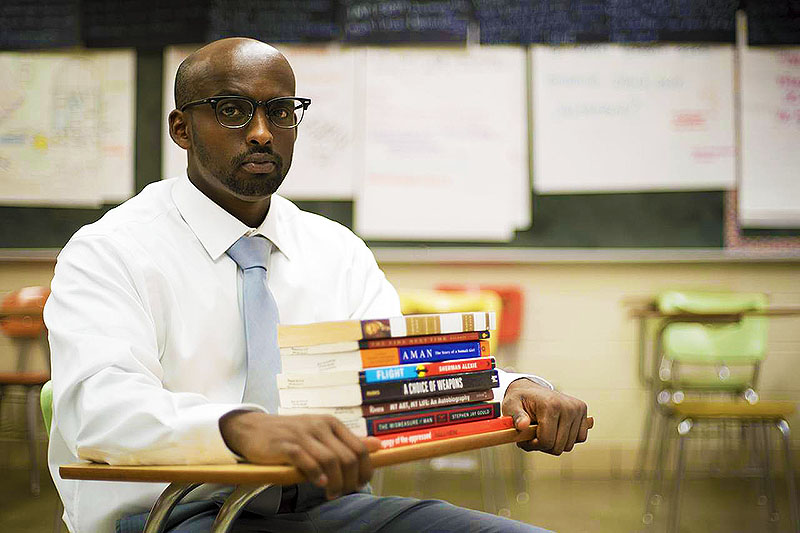
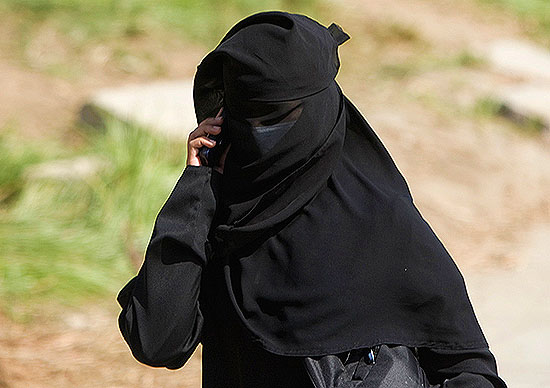
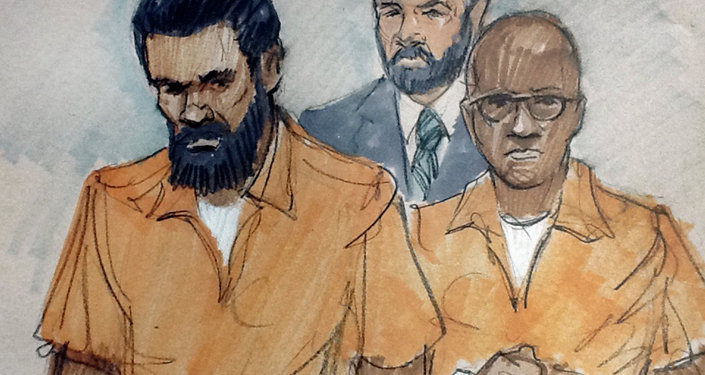
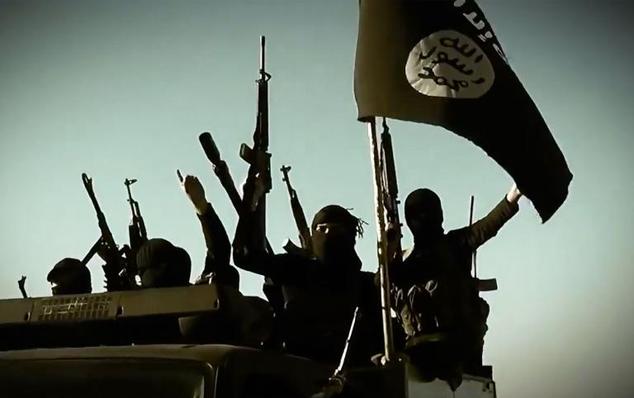
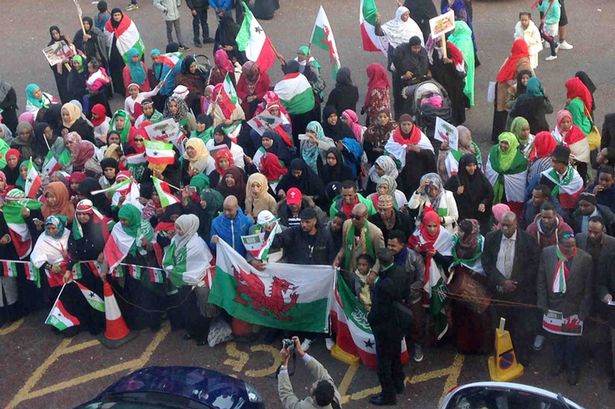
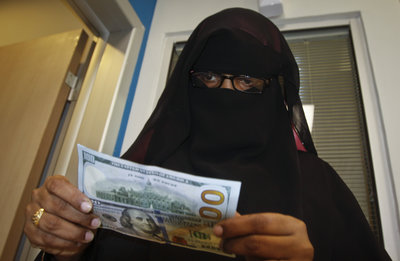

Somali filmaker Lula Ali Ismail puts her country of Djibouti on the cinematic map with her first feature-length film, Dhalinyaro.
in General
Posted
http://www.somaliaonline.com/somali-filmaker-lula-ali-ismail-puts-her-country-of-djibouti-on-the-cinematic-map-with-her-first-feature-length-film-dhalinyaro/